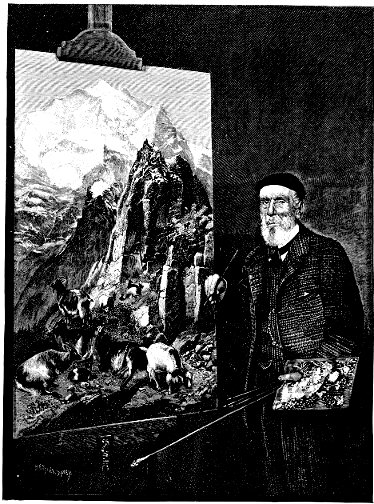
From a Photo. by Elliot & Fry.
The cover image was created by the transcriber and is placed in the public domain.
EDITED BY GEORGE NEWNES
Vol VII., Issue 39.
March, 1894
Illustrated Interviews.
That Stout German
Zig-zags at the Zoo
Stories from the Diary of a Doctor.
Beauties:—Children.
Crimes and Criminals.
Lost in a Blizzard
The British Embassy at Paris.
Portraits of Celebrities at Different Times of their Lives.
The Birth of a Smile.
Martin Hewitt, Investigator.
The Palace of Vanity
The Queer Side of Things.
Transcriber's Notes

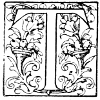
The first sight I obtained of Mr. Cooper was of considerable interest. He lives in a beautiful spot, about a mile and a half from Canterbury—at Vernon Holme, Harbledown; and as I entered the gate I caught sight of Mr. Cooper before his easel in his studio, taking advantage of the light of a glorious winter's day, and working away at a canvas which I subsequently learnt was intended, with another, to form his contribution to this year's exhibition at the Royal Academy. I stood for a moment quietly and respectfully looking on before ringing the bell at the front door. The canvas presented a landscape, and the cattle were just outlined in with pencil. The painter was working without the aid of glasses, and this for a man who is in his ninety-first year may certainly be said to be highly respectable. Somewhat below the medium height, with marvellously penetrating eyes, scarcely the sign of the stoop of old age, a hand as steady as in '35, when he was just beginning to make a name, and silvery white hair about his head—it was an impressive picture. T. Sidney Cooper's brilliant work of the past and to-day calls for all recognition of his gifts, but it is only when one catches sight of him as I did—snow, nothing but snow, everywhere outside, and the painter, now in the winter of life, clinging with all the old love to his sheep and cattle—it is only then that one realizes the great respect due to the Grand Old Academician.
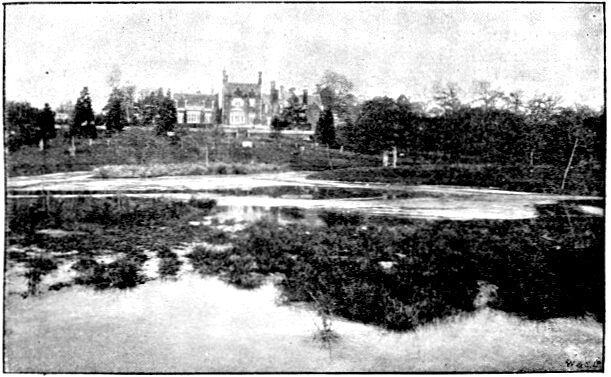
VERNON HOLME—FROM THE POND. From a Photo. by Elliott & Fry.
So I shook my snow-covered boots outside and entered the hall of Vernon Holme. The artist left his easel. It was a hearty welcome to Vernon Holme. There was no mistaking the man. He was living there a quiet, happy, contented, and work-a-day life; rising at half-past seven every morning in the winter, and in the summer months at seven o'clock. Before breakfast the palettes are set and the paints made ready. He will work steadily up to dusk. His recreation is his Bible, and twice a day, after lunch and dinner, a chapter is read aloud. His voice is clear, and he reads every word, and suggests its meaning. I heard Sidney Cooper read. His birthdays are thinking days—thankful days too, it would seem. The lines he wrote on September 26th, 1889, reveal much. He calls them "Musings on My Eighty-sixth Birthday," and they run:—
Then he loves to take you about his house, for it is a very beautiful home, and the man who owns it enjoys its comforts the more, for he will honestly tell you that it meant working for.
"I don't do anything without authority," he told me; "I have authority for everything I paint. If I want a sky for any particular picture, I do it from my house. I have windows from all four sides, so that I can see always. Then in the summer I can sit on the lawn and paint. There are some of my sheep—my 'models'!"
We were standing in the recess of the dining-room. Before us were the fields covered with snow, and some sheep were labouring hard to find a stray tuft of grass here and there. Ever since the artist built the house—forty-five years ago—he has kept sheep here and painted them every year. These finely coated creatures before us now are admirable representatives of some ninety ewes and a similar number of lambs. Of bullocks, the great cattle painter has few, though he invariably fattens up three or four every autumn.
Some hours later we again stood in this corner and watched the setting sun. A great cloud edged with gold hung over a black patch of trees.
"Ah!" exclaimed Mr. Cooper, enthusiastically, "it was in that very wood that I first began to study trees. There were some fine old trees there—too far gone to cut for timber. A farm stood on the opposite side of the hill, which I have put in three of my pictures. How well I remember seeing the chains and the gibbet in the road which skirts the wood there—used for hanging Charles Storey, who committed murder the year after I was born."
It is not necessary to say that the interior of Vernon Holme is in every way worthy of its owner. The land on which it stands was originally a hop ground, and Mr. Cooper tells with great gusto that whilst the people were picking the hops his men were getting the ground ready for the foundation of the house. The house was built from Mr. Cooper's own designs. The hall, of solid oak, is very fine and massive, and the carving about the ceiling and staircases exquisite. The bosses on the ceiling were cut from Nature's models of hops and wild flowers. The antlers over the doors were a present from Sir Edwin Landseer, and are reminiscences of deer shot by him in Scotland. The engravings comprise proofs after Sir Edwin and Tom Landseer, and Leslie's "Coronation of Queen Victoria."
"There is a little story," said Mr. Cooper, "as to how I came into possession of that engraving—a very rare one—of Tom Landseer's. I painted a little picture for him, and Tom liked it. So it was agreed that I should have some of his proofs in exchange for it. He was very deaf, and he wrote on a piece of paper: 'There's my portfolio; choose one, and I'll sign it.' I did so.
"'Why,' he exclaimed, 'you have chosen the one I put aside for myself.'
"I had selected the 'Deer and Dog in the Snow.'"
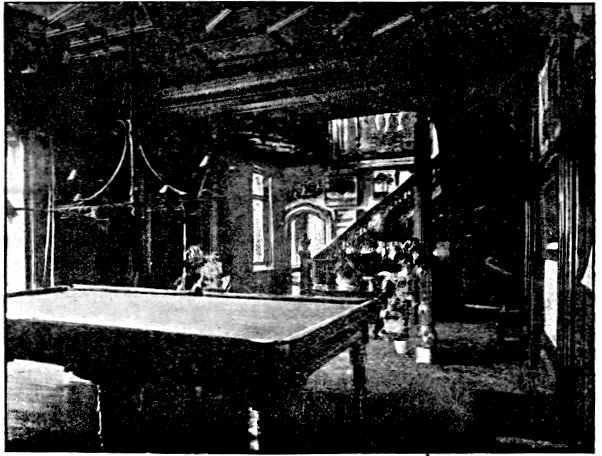
THE ENTRANCE HALL.
From a Photo. by Elliott & Fry.
Only three pictures by Mr. Cooper hang[Pg 229] in the hall proper. These are over the mantelpiece. One of these is peculiarly interesting—a group of three sheep, a calf, and a cow, painted three years ago. The work was the result of a dream. The Royal Academician dreamt he was painting this very scene. In the morning he got up and chronicled it on canvas. Ascending the grand old staircase, a huge space is taken up by "Separated, but not Divorced," painted in 1875, and is a study of a magnificent short-horn bull, "Charlie" by name. It was exhibited, but proved too big to sell. Just by the bull's foreleg is a raven pecking at a bone. The artist was asked why he put it there.
"Oh!" he replied, "I wanted a little bit of relieving black and white. Besides, if there is a Crown case over it, it will typify the lawyers picking at the bones."
But "Charlie" is interesting for other reasons. It represents a triumph of art. Mrs. Cooper did not like the bull's head, and said so. Mr. Cooper made up his mind to paint in another head. It took a long time—many and many were the attempts to put a new head on old shoulders, and the one now in the picture took as long to paint as all the rest of the picture. It is a remarkably real and brilliant effort. The other large picture by Mr. Cooper is "Isaac's Substitute," painted in 1880—a Scotch ram the only object in the picture being Isaac's substitute. It was suggested one day after reading the words from Genesis xxii. 13: "And Abraham lifted up his eyes, and looked, and behold behind him a ram caught in a thicket by his horns." Close by are some sheep painted on the 26th September, 1874, on the occasion of the artist's seventy-first birthday. It was completed in five hours, and here it should be mentioned that for the last twenty years Mr. Cooper has always painted a finished canvas on his birthday—pictures which are never sold.
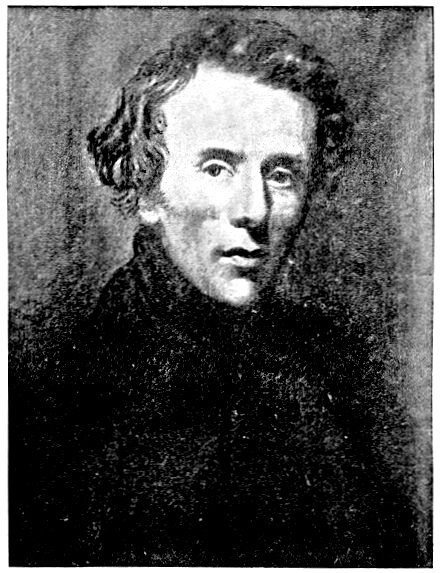
SIDNEY COOPER, AGE 38.
From a Painting by Scott.
A peep into Mrs. Cooper's room revealed something that says much for the continued determination of purpose which has always characterized the great painter's life, and his extraordinary and persistent powers of endurance under great suffering. I had noted some excellent copies of his father's works by Mr. Neville Cooper, and a portrait of the Royal Academician himself, painted by Scott in 1841. Also an old donkey, done in 1835, belonging to Mrs. Cooper—Mr. Cooper has been twice married—seeing that it was painted in the year in which she was born. Two water colour drawings were then shown to me. They were artistic reminiscences of his severe illness last year. Beneath a group of cows were written these words: "Painted in bed, November, 1893, for my dear wife for her nursing.—T.S.C., R.A." The other was some sheep in the snow—reproduced in these pages—and inscribed: "To Neville. Painted in bed, with bronchitis, November, 1893.—T.S.C., R.A." Such efforts as these betoken much. It is a significant fact that Sidney Cooper was the last country patient the late Sir Andrew Clark ever visited, for he was struck down four days afterwards. The great physician's words on saying "Good-bye" to Mrs. Cooper were: "I never met a man at eighty with more vitality in him[Pg 230] than your husband, and he is ninety!" and he added, upon being thanked for his prompt attendance: "I look upon this as being one of the events of my life."
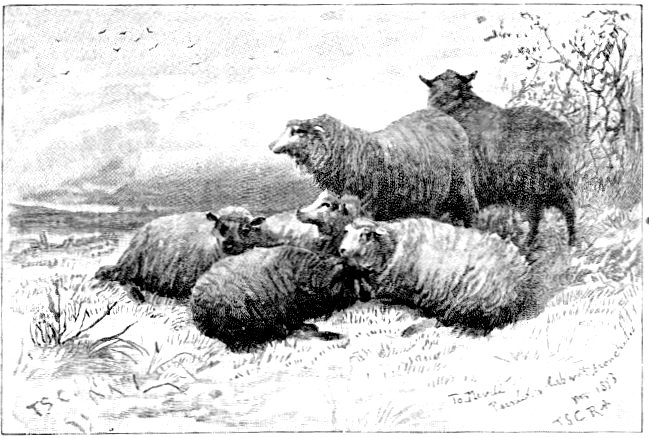
PICTURE PAINTED DURING LAST ILLNESS.
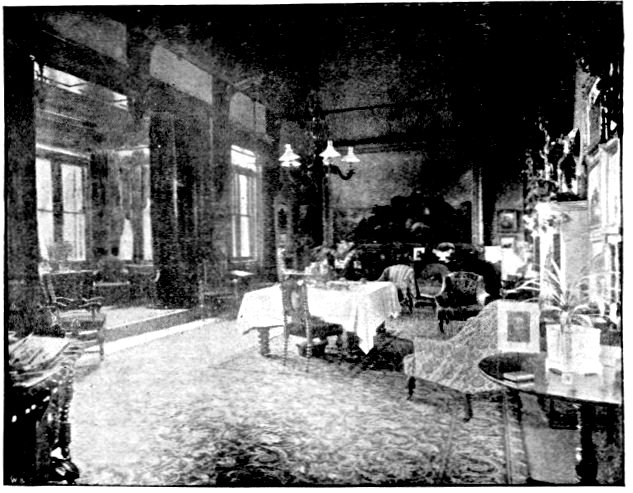
THE DINING-ROOM.
From a Photo. by Elliott & Fry.
The dining-room is perhaps the finest room in the house—being 35ft. long and 35ft. high. Its carved oak arched ceiling is superb—and the carved fireplace, round which ivy is trailing, is also a fine sample of this particular art. It was in this apartment that I had the privilege of going through portfolio after portfolio of the daintiest of pencil studies—little artistic efforts which seemed to have life and breath of their own. There are many personal works here—at one end of the room hangs "Scotch Mountains and Sheep," the opposite side being occupied by the largest picture the artist has ever painted—the canvas measures 11ft, by 7ft.—"Pushing Off for Tilbury Fort, on the Thames," painted in 1883, and exhibited in the Academy of the following year.
As we stood before this beautiful work—a scene of perfect calmness in the meadows, with a group of cattle lazily lying in the fore[Pg 231]ground, and a boat full of soldiers being rowed towards the guard-ship, Ramilies, in the distance—Mr. Cooper said:
"I saw that very scene on my fortieth birthday, when seeing a friend off from Tilbury. Its beauty impressed me in a way few such scenes have done, and I said within myself, 'Should I ever reach my eightieth birthday, I will paint that.' And I did. I started it on September 26, 1883, and it took me exactly forty-nine days to paint."
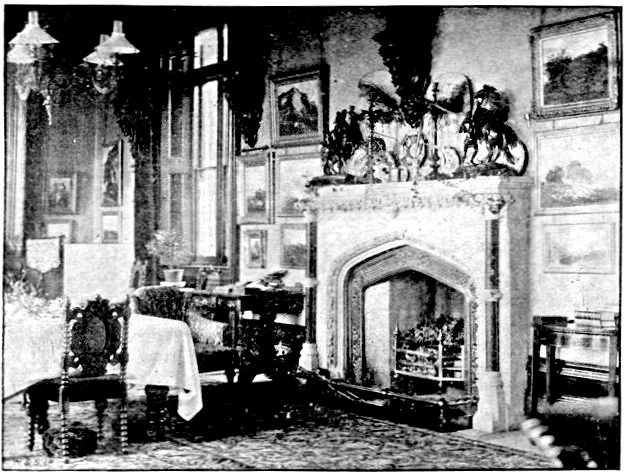
THE DINING-ROOM.
From a Photo. by Elliott & Fry.
There is much of interest in the drawing-room, with its fine statues by P. MacDowell, R.A., its family portraits intermingled with great bowls of winter blossoms and grasses gathered from the adjoining fields, its many artistic treasures—not omitting the tiny canvas which the artist painted at the age of seventy.
"I painted it," he said, very quietly, "because I thought I had got to the end!"
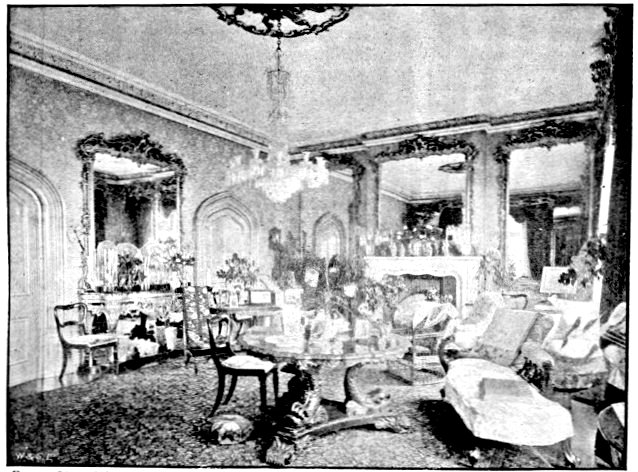
THE DRAWING-ROOM.
From a Photo. by Elliott & Fry.
But we only spend a moment or so there, for Mr. Cooper is leading the way to the studio. We cross the great hall, through the library, whose walls are completely hidden by sketches of, surely, every animal that ever enjoyed the green fare provided by the meadows of Britain—the artist opens the door and bids me enter. It is a remarkable studio—and I should say stands alone and distinct amongst those pertaining to Royal Academicians. There are a few studies hanging on the woodwork which surrounds the window—there are the two diplomas, one of which, dated November 3rd, 1845, made its possessor an Associate of the Royal Academy, and the other a Royal Academician on March 23rd, 1867—but otherwise the blue walls are bare, perfectly bare. There may be[Pg 232] a reason for this—a very simple one; an honest recollection of the days that have been is not to be forgotten in the comforts and successes of the days that are now! When I left Mr. Cooper, and after I learnt what I did, I could only put these bare walls in the studio at Vernon Holme down to such thoughts as these.
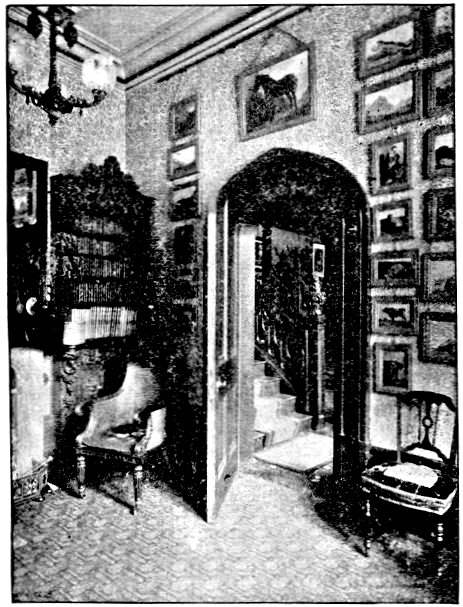
THE LIBRARY.
From a Photo. by Elliott & Fry.
He told me that the easels and palettes are all old friends—the Academy box on the floor is chipped and cut about, and goes back to the forties. It is not worth a shilling; but a big cheque wouldn't buy it. Packed against the walls near the floor are scores of canvases, studies innumerable, old time and present-time first artistic "thoughts." "Nancy Macintosh" is particularly interesting, because it is one of the artist's figure studies of the time when his work was just becoming to be recognised—1836. Nancy was painted in Cumberland under Cross Fell, and is a good type of the women who used to go up and milk the cows for the drovers, who—it is much to be regretted—used to exchange their employers' milk for nips of whisky! The Academy pictures are even now well forward. I was just looking at one of these—a bridge scene, and a subject the artist assured me he had long been wanting to paint—when I turned towards Mr. Cooper again and found him in the act of lifting a large canvas on to the easel. He would not allow me to assist him.
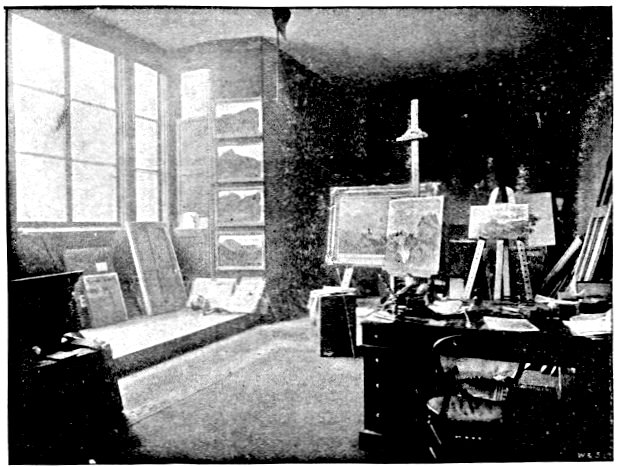
THE STUDIO.
From a Photo. by Elliott & Fry.
"That," he said, after it had been securely placed on the easel, "is to be the picture of my life! The subject is 'The High Hills, or the Refuge for the Wild Goats,' from the 104th Psalm. It is not finished yet. The[Pg 233] notion occurred to me when last in Switzerland. I had to go up the mountain some four hours' journey before I reached the spot from which the idea is partly composed. We went as high as the goats would go in order to get the moss, heather, and different grasses on which they feed. As far as the goats are concerned, I obtained the principal ones when in North Wales."
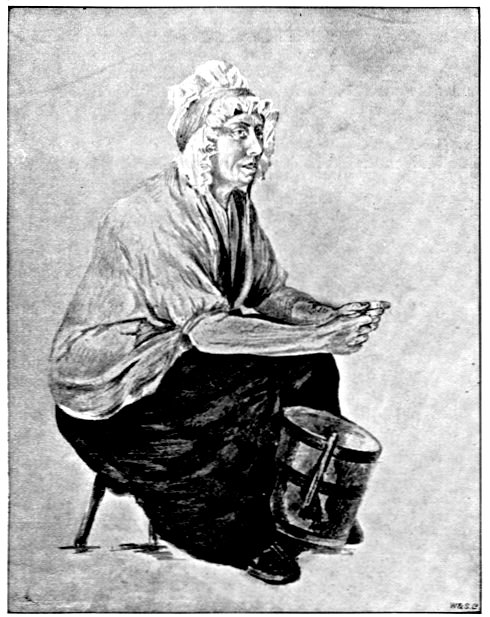
NANCY MACINTOSH.
From an early Drawing by T.S. Cooper, R.A.
A flood of renewed light came in at the studio window—for the afternoon was still young—and Mr. Cooper stood for a moment by the side of the picture and was thus photographed. The light lit up the canvas—so I left Mr. Cooper at work, and spent the afternoon in wandering about the Brotherhood Farm, where some of his sheep and cows are to be found. It is a farm possessing a distinct interest, for on a grassy slope by the side of one of its meadows is situated the well of the Black Prince—a well roofed in by modern brick, over which the ivy is growing, a sublimely picturesque corner, where the first bearer of the motto "Ich Dien" was wont to come and bathe his eyes.
"Why, sir," said the old Sub-Prior with pardonable pride when showing me the well, "people send from all over the world for that water, and the last gentleman that had it was Mr. Sidney Cooper, the painter."
Mr. Cooper told me that he obtained the water for a young lady in his family.
It was nearing dusk when I returned to Vernon Holme, and once again I saw the great artist through the window of his studio, packing up his things and taking a last look for the day at his work on the easel. We met in the hall.
Then I learnt something of his eventful life. He looked back on his career very quietly—never striving to make "points," never yearning for effect, though every incident was in reality a picture in itself. Imagine the little fellow—deserted by his father at the age of five—with the tiniest of prospects before him of ever cultivating the gift which was born with him when he first opened his eyes in a little room in St. Peter's Street, Canterbury, on September 26th, 1803.
The mother was left with five young children—at the time of the long war—terrible days for them. But the mother worked hard, and her youngest boy never forgot it, as will be seen later. He was christened Thomas, and the name of Sidney was added some time after—in this wise: The little fellow's great-uncle was in the Navy, and had been at Acre with Sir Sidney Smith, who had a great love for Kent and its surroundings.
"Any news from Kent?" asked Sir Sidney of his great-uncle one day.
"No, Admiral. Only Cooper's got another boy."
"Indeed; then let him take my name!"
So "Sidney" was set down in the church registry.
"They never would call me 'Sidney,'" said Mr. Cooper, as he remembered this; "but when I commenced to draw on my slate, at the age of eight, I always used to put 'T.S.C.' in the corner. The very first drawing I ever did was with a slate pencil, of the Bell Tower of Canterbury Cathedral, and one of my schoolfellows used to encourage me by doing my sums for me, if I would draw him a house with a bird on the chimney.
"I was always in the fields—my heart was in the green valleys and meadows. I loved to sit by the streams, and on my Wednesday and Saturday half-holidays from school I would seek out some nook and draw horses and dogs and sheep on my slate. I had no paper and pencil. It was not until I was twelve or thirteen that my career really commenced. Then I started to paint coaches for Mr. Burgess, of Canterbury, at 12s. a week. Every moment I could spare I was trying to improve myself in drawing but even then I still had to cling to my slate and pencil. But, I got some lead pencils at last. Let me tell you the story, and its sequel.
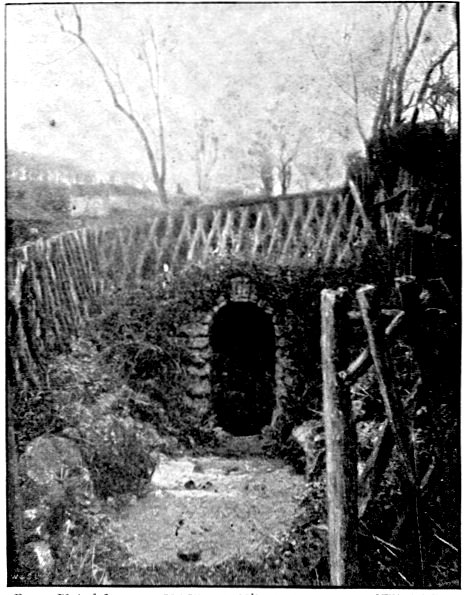
BLACK PRINCE'S WELL.
From a Photo. by Elliott & Fry.
"I was sketching the central tower of the Cathedral. A gentleman was also drawing another part of the sacred edifice. We met often, without speaking. One day he came up to me and asked me what I was doing. I told him. He laughed merrily at the idea of thus working on a slate, and some two or three days afterwards he made me a present of his bundle of pencils and paper. I could scarcely contain myself. He patted me on the head and went his way. But, I had no knife! One day I saw a gentleman near the Cathedral—a very solemn-looking gentleman in clerical attire. I went up to him.
"'Please sir,' I said, 'have you a knife?'
"'Yes, my lad—what do you want it for?'
"I told him. And he sharpened all my pencils for me—every one of the dozen. Who was he? The Archbishop of Canterbury!"
Young Cooper was destined to discover who it was that gave him his first pencils. A pleasant little party was assembled in London—Mr. Cooper was now well known—and amongst those gathered at the board were Stanfield, Tom Landseer, and George Cattermole. They were telling little stories of the early days, and the cattle painter related the incident of the slate and pencils.
Cattermole jumped up.
"Why, Sidney," he cried, "are you the slate? I am the pencils!"
"Then," continued Mr. Cooper, "came my work at the theatre. It was one evening and I was sketching—when I heard a cough behind me. I turned and saw a man looking over me.
"'Ah!' he exclaimed, 'you draw well, my boy. You have a good eye—but you must learn perspective.'
"'What is that, sir? I have never heard of it before.'
"'Well,' he replied, 'it shows the proper size of objects at a distance—how to draw a street, a road, a distant hill or tree, etc. If you like to call on me, I'll show you.'
"'Where do you live, please, sir?' I asked.
"'In Canterbury—at the theatre!' he answered.
"'Oh! my mother wouldn't let me go to the theatre!' I assured him.
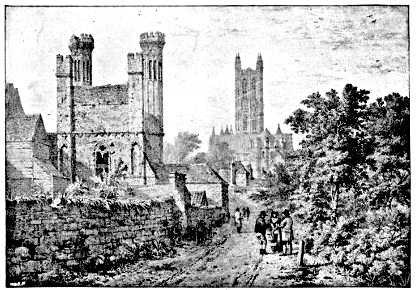
GATEWAY—ST. AUGUSTINE'S MONASTERY.
From an early Drawing by T.S. Cooper, R.A.
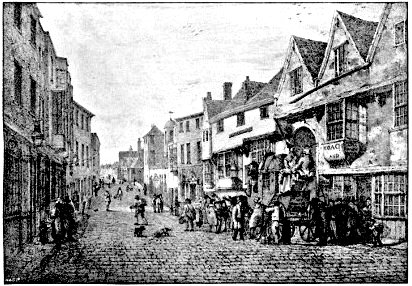
HIGH STREET, CANTERBURY.
From an early Drawing by T.S. Cooper, R.A.
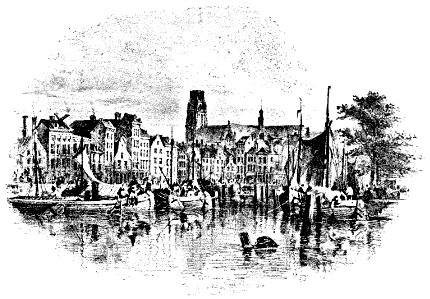
ROTTERDAM.
From an early Drawing by T.S. Cooper, R.A.
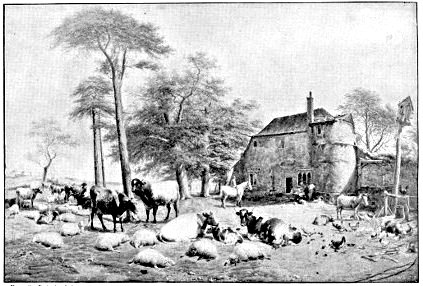
TUNFORD FARM.
From the Painting by T.S. Cooper, R.A.
"However, I went. I vividly remember it. When I entered, there was the canvas laid down on the stage for a Roman scene. The actors were rehearsing on the space in front. So Mr. Doyle—for that was the man's name—instructed me in perspective, and I learnt the artistic value of things that I had long seen in Nature. The theatrical company left—it used to go a sort of circuit to[Pg 236] Canterbury, Faversham, Hastings, and Maidstone, and when they came again next year I helped him once more. I still continued coach-painting—Mr. Burgess employing me to do the rough work—rubbing down the carriages, lying on my back underneath—grinding colours, etc. When I was sixteen the company returned. Poor Doyle died,[Pg 237] and I was engaged as scene painter at a guinea a week. So I went with them to Faversham. I well remember my only appearance as an actor. The piece to be played was 'Macbeth,' and the scenery used was some I had painted for 'Rob Roy.' The manager told me I must play the part of the bleeding Captain, and I wore a Scotch dress—intended for Norval—which Mr. Smollet, an actor, had given to me for painting some imitation lace on a dark dress he had. Well, I simply broke down, and was positively conducted off the stage. Buckstone played Ross in this production. It was the first time I ever met him. He was a dapper little fellow—very lively and brimming over with fun. We remained bosom friends to the day of his death. When he got prosperous and had married a second wife, every other Sunday I used to go and dine with him. He was just then beginning to get very deaf.
"One night I said to him: 'Buck, I want a private box.'
"'All right, Sidney, whenever you like.'
"'Next Tuesday, eh?'
"'All right, my boy—next Tuesday.'
"After dinner we were chatting, and I said: 'Well, I've got my sketch-book with me, and in return for the box I'll draw your wife's portrait and the baby. It won't take a quarter of an hour.' So they sat. I drew a sheep and a lamb suckling."
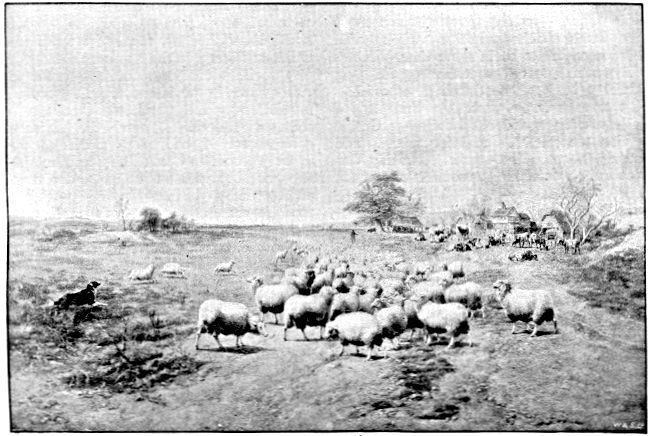
THE FLOCK MASTER'S HOPE.
From the Painting by T.S. Cooper, R.A.
Mr. Cooper's first work of importance was founded on his first love. The Cathedral and its precincts was one of the dearest spots on earth to him, and he did some excellent drawings on stone of the Cathedral and Canterbury in general. The gateway of St. Augustine's Monastery and High Street, Canterbury, showing the coach waiting outside the "George and Dragon," are good examples of these—particularly the latter, as it tends to show something of what the Cathedral city was like when Mr. Cooper was unconsciously stepping to fame with the aid of a school slate and pencil. At last he got to London and gained a studentship at the Royal Academy, then held at Somerset House. It filled his heart with hope—he realized all his longings; but his uncle, who had promised to support him while working away at the Academy, suddenly threw him over, and young Cooper was forced to go back to Canterbury, and was obliged to paint coaches once more and give lessons in drawing. It was an important step when he, together with his friend William Burgess, decided to try the Continent. The young artist was now twenty-four years of age. He positively painted his way from Calais to Brussels by doing likenesses of the proprietors of small hostelries, together[Pg 238] with their families, in return for his board and lodging.
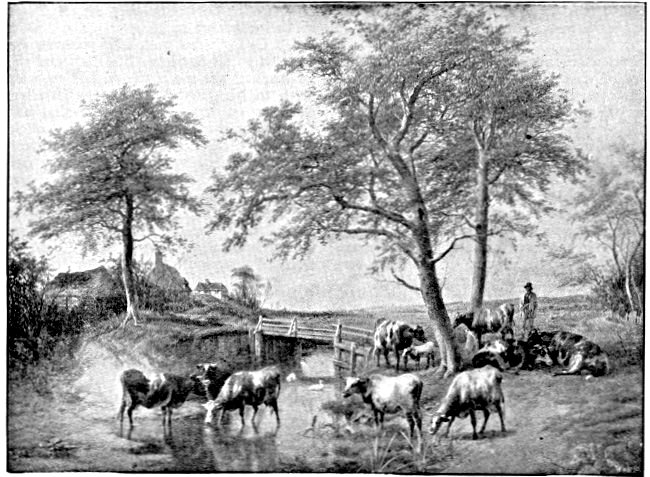
A BROOK IN THE MEADOWS.
From the Painting by T.S. Cooper, R.A.
"I got on very well in Brussels," said Mr. Cooper, "giving lessons there, and began to make money—indeed, I must have made some five or six thousand francs a year after I had been settled there some time. It was at Brussels I met Verböckhoven, the great animal painter, whose drawings of animals were absolutely faultless. At that time I was confining myself to old buildings, Gothic architecture, picturesque bridges, etc., and putting them on the stone. One day Verböckhoven was looking at some of my pencil drawings and said:—
"'You could paint cattle.'
"I assured him I could not.
"'Oh, yes,' he said; 'here is a palette—try.'
"Some of his studies were tacked on the wall, and I began to paint a black spotted cow. Just at that moment a Miss Searle, one of my pupils, came in accompanied by her father, and Mr. Searle said to me:—
"'What! are you taking lessons?'
"'No,' I answered; 'Monsieur Verböckhoven thinks I can paint, so I am copying that cow.'
"'I wouldn't try another,' said Verböckhoven, looking over, 'if they think you are taking lessons I shall lose all my pupils! Never mind—let it go—go in and win, Cooper!'
"Then came the terrible revolution of 1830. I was forced to return to England, and I did so, in May, 1831, with a wife and child, and £13 in my pocket. I made my way to London, and, fortunately for me, Ackerman's, in the Strand, liked a bundle of my drawings and purchased them at five shillings apiece. Then the struggle commenced. I had taken a second floor in the Tottenham Court Road, and morning after morning, with an orange and a couple of Abernethy biscuits in my pocket, I used to set out for Regent's Park, where there were often from 500 to 1,000 cows in those days, and try and sketch them. My methods were simple. I always had six or eight sketches going at one time, so that if a cow moved from one position I could go on with another, and only wait until I caught my cattle friend in the old position. At night I worked at home over my pipe, and earned my daily bread by drawing them on stone for Ackerman."
But success came at last—and through an old fellow student, Caterson Smith, who eventually became President of the Royal[Pg 239] Academy of Dublin. Mr. Cooper had painted a small canvas, 10in, by 8in., of a cow and two sheep—he had done it when it was too wet to go to Regent's Park. Caterson Smith found him out and called on him. He caught sight of this little group of cattle.
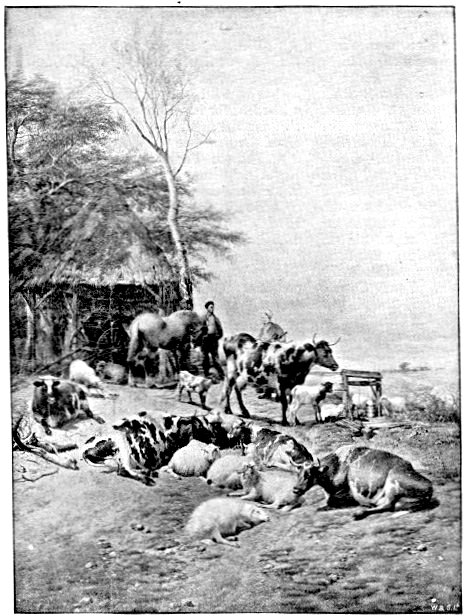
FARM IN EAST KENT.
From the Painting by T.S. Cooper, R.A.
"Look here, Cooper," he said, "I should give up architectural stuff and stick to this. I'll buy this picture. How much?"
"Oh, a few shillings," the young artist replied.
"Two pounds?"
"Done."
So Caterson Smith purchased the Royal Academician's first painting of cattle.
"Soon after this I began a larger one," said Mr. Cooper. "I had removed to Windmill Street to a first floor. The canvas was a 3ft. one. One morning I was surprised to have a visitor announced. He came up.
"'Your name is Mr. Cooper?' he said.
"'Yes, sir.'
"'I've seen a little picture of yours, and I was anxious to find you out.'
"He found me out in a strange way," remarked Mr. Cooper. "It seems that Caterson Smith had left the picture he had purchased at a frame-maker's in Greek Street, Soho, and the shopkeeper liking it had put it in his window. Here my strange visitor had seen it, and not until Smith wrote for the picture was he able to discover me.
"'What's that you are painting?' asked the stranger, looking at the 3ft. canvas on the easel.
"'Oh! just some cattle coming through a stream, sir.'
"'Very nice'—rubbing his chin and eyeing it critically—'very nice. How much?'
"'I hardly know.'
"'Well,' he said, 'if you will finish it I will give you £15 for it.'
"I agreed, and when he left he gave me his card, and I saw his name was Cribb, and that he lived at King Street, Covent Garden.
"I painted another for him. Then the cholera broke out, and my wife, who was far from well, wanted to go to the seaside for a few days. Cribb had not paid me for my second picture—I wanted the money, so I called on him. He sat reading the paper for one hour and a half by the clock in Covent Garden Market, without speaking.
"I woke him up again with my request to be paid.
"'Look here,' he said, suddenly, 'I don't[Pg 240] think young men should have so much money to run about with!'
"However, he paid me £10 on account."
The estimable Mr. Cribb lost a trifle by his meanness towards the great painter in embryo. A Mr. Carpenter, a Bond Street dealer, had found young Cooper out, and gave him a commission to paint a picture for £30. It was exhibited in 1833, at the Suffolk Street Gallery—and on the line—a half-length picture of "A Kentish Farm." The Press were most enthusiastic. "Here's a new man," the critics said, "a new man who will create a great school." The news sheets were full of praise, and Mr. Cooper told me how his wife and children made a scrap-book by cutting out all the laudatory notices in the papers and pasting them in. Young Cooper went to the private view, and the keeper came up to him and said that Mr. Vernon wished to be introduced to him. Mr. Vernon—Robert Vernon! He was one of the great art patrons of the day; the kindest and most liberal of men towards artists.
So they were introduced. He wanted to buy the "Kentish Farm," but it was in the hands of a dealer, who was asking a hundred guineas for it; and Robert Vernon never bought from dealers. However, Mr. Vernon would call—he had his address from the catalogue. The first two men to shake hands with Sidney Cooper on his success were Stanfield and Roberts. Mr. Cooper had now moved to St. John's Wood. A few days passed by, when three gentlemen called. One was Mr. Vernon; the other Fawcett, the comedian; and John Maddison Moreton, who has made us cry with laughter over his "Box and Cox."
"I sold Mr. Vernon," Mr. Cooper said, continuing this delightful narrative, "a little picture for £15. It was a group of cattle and a woman with a donkey, the donkey bearing baskets, in one of which sat a child. That was my own little girl—now the only survivor of three daughters.
"Fawcett had been examining the sketches in my room. Suddenly he cried out:—
"'Vernon, Vernon, look at this!' It was a picture I had begun for the Academy and one I called 'Tunford Farm.'
"Vernon seemed delighted with it.
"'What's the price?' he asked, suddenly, after a good look at it.
"'Well, sir,' I said, 'seeing that it is the same size as that exhibited at Suffolk Street—£30—I had £30 for that.'
"'Yes,' said Vernon, 'and the dealer asks a hundred for it. I'll give you a hundred for that on the easel—on condition that you annul the purchase of this little £15 picture!'
"'Tunford Farm' was exhibited in the Royal Academy of 1834, and it now hangs in the National Gallery as one of the Vernon collection. That is sixty years ago, and I have never missed a year since, and hope to exhibit again this year."
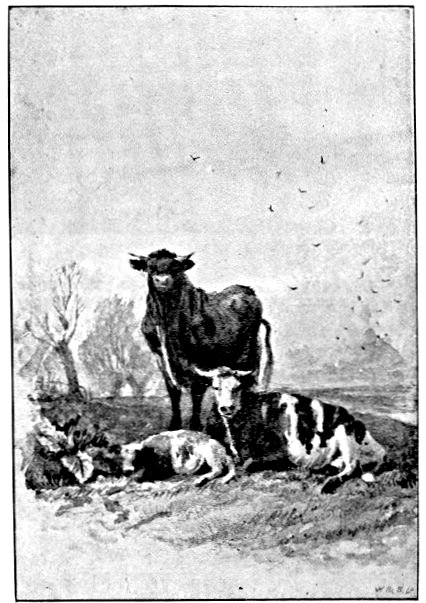
FIRST SKETCH FOR "THE MONARCH OF THE MEADOWS."
BY T.S. COOPER, R.A.
"Tunford Farm"—a subject which Mr. Cooper has painted twice—created a great impression. There was no cattle painter then, and as Wilkie once remarked—and whenever Wilkie used to dine at Mr. Vernon's he would go up and look at the picture—"That's the man to fill the gap." The picture was very nearly turned out. It was chosen, but had got put aside. The gallery was already hung,[Pg 241] and one of the Hanging Committee, Mr. Jones, R.A., positively had his own picture taken down and "Tunford Farm" put up in its place. This alone should tell of the excellence of the work. From that eventful day in '34 Mr. Cooper has gone on year by year substantiating his claim to be regarded as the finest painter of cattle this century has seen. It would be impossible to give a complete catalogue of his many works, his studies of cattle are countless. One or two examples of his genius are reproduced here—namely, "The Flock Master's Hope," "A Farm in East Kent," "Tunford Farm" (the second painting of the picture which realized so much for him), "The Brook in the Meadows," and the original sketch for "The Monarch of the Meadows," which was so mysteriously stolen in September, 1881. No artist has had his pictures more "counterfeited" than Mr. Cooper. He was so frequently asked to say if a picture was his or not, that at last he was obliged to charge a fee. According to Mr. Cooper's certificate book, during the last few years he has had 241 so-called Cooper works submitted to him, 219 out of which proved to be only copies!
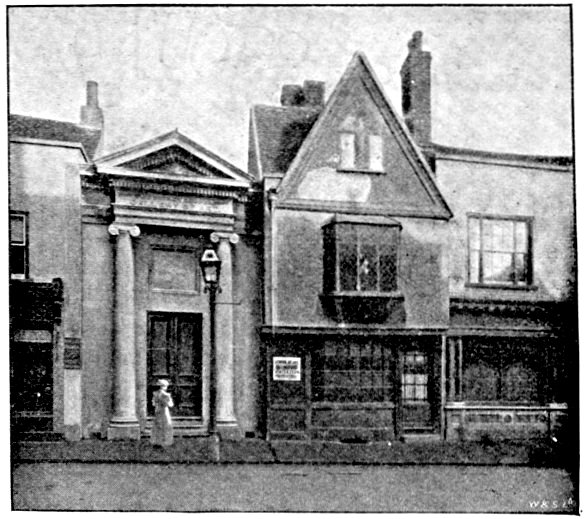
THE SIDNEY COOPER SCHOOL OF ART AND BIRTHPLACE.
From a Photo. by Elliot & Fry.
I have referred in the early part of this paper to the great love Mr. Cooper had for his mother. When I said "Good-bye" to him it was with a promise—very happily and readily made—to stay for a moment at a certain spot in St. Peter's Street, Canterbury. There stands the Sidney Cooper School of Art—a school Mr. Cooper founded in 1870, giving gratuitous instruction to the students, and subsequently presented to the City of Canterbury in 1882.
"I wanted the youth of Canterbury to have the shorthand of drawing—I had to find it out myself," Mr. Cooper told me.
But there was another reason. At the banquet given in honour of the Royal Academician at his birthplace in October, 1870, Mr. Cooper rose and said:—
"I had but one object—nay, I had two objects—in erecting that Gallery of Art which I have devoted to the inhabitants of my native city and its neighbourhood. The one was to dedicate it to her who fostered me in my years of infancy and youth"—and at the recollection of his mother, the great painter was so overcome that he could not for some time proceed with his remarks—"and I determined to erect it on the very site of my birthplace; and the other object was that the youth of Canterbury who feel a desire for the study of art may avail themselves of those opportunities which were denied to me."
Half an hour after I left Sidney Cooper I was watching the students at work and carrying out the wishes of the thoughtful founder of this excellent institution. But, I must confess to staying longer outside than I did inside. Next door to the school is a quaint old gabled house, striking in all its picturesqueness, and even a stranger would not pass it by without turning to look at it. How much more interesting it becomes when you know that the old-fashioned latticed window on the first floor opens into the room where a certain little fellow first saw the light ninety years ago, and that on the very stone step which leads to the door that same little fellow, a few years later, used to sit with his slate and pencil. Thomas Sidney Cooper, R.A., told me so; and he, above all others, ought to know.
Harry How.
By F. Bayford Harrison.
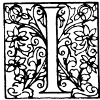
In the City of Brussels a great deal of very pretty lace is exposed for sale. Englishwomen admire this lace and buy it. If they go straight from Belgium to England they can take it home without having to pay any duty; but if they pass through France they have to pay on all their new Brussels lace at the French Custom House. And many Englishwomen pass through France on their way from Belgium to England, because they prefer the short passage from Calais to Dover to the longer one from Ostend.
The Misses Wylie were charming, middle-aged ladies, fond of travel, fond of dress, fond of lace, and very bad sailors. They had been excursioning in Germany, had come down the Rhine, and had spent a week in Brussels. More attractive than the Field of Waterloo, and more fascinating than the Musée Wiertz, was the Galerie St. Hubert. Miss Melissa Wylie could not resist the white Brussels lace; Miss Annora Wylie could not resist the black. Each of the ladies bought lace; led on by the tempter, in the shape of a seductive shopwoman, the Misses Wylie bought lace fichus, lace collarettes, lace by the mètre. Day by day they added to their stock.
At length it was necessary to make for England, and to pass through that dreadful France with its protective duties. Then they realized their position; how about the lace?
"We cannot conscientiously say," remarked Miss Melissa, "that we have rien à déclarer, because this lace is dutiable."
"And we dare not risk packing it," returned Miss Annora, "because they might take it into their heads to examine our boxes."
"How can we get it through?" mused the elder sister.
"We must get it through!" declared the younger sister.
Presently Annora exclaimed, "I have it! We will wear it! No duty is paid on what one is wearing."
"Yes, yes," said Melissa, "but how can we wear it? The white will get soiled and the black torn in travelling. Besides, if it looks unnatural, as it would on our dresses and mantles, the officials will be sure to notice it."
"It would not look unnatural on our bonnets," said Annora.
They set to work to decorate their bonnets with the lace. They mingled white and black, fichu and flounce, in the most skilful manner, and though the bonnets looked somewhat overdone, yet they carried the lace, and it was probable that the male eyes of the Custom House officials would not notice anything abnormal.
The Misses Wylie rejoiced in their cleverness. They sat in the train on their way to France with clear consciences and light hearts. They had rien à déclarer, nothing dutiable. In the compartment with them was only one other passenger, a stout man of good-humoured aspect; evidently, from his extreme flabby stoutness and his extreme good-humour, a middle-class German. Now, Germans who understand English are very sociable with their English fellow-travellers. As this German did not address the Misses Wylie, they felt sure that he did not understand English, and they talked freely to each other.
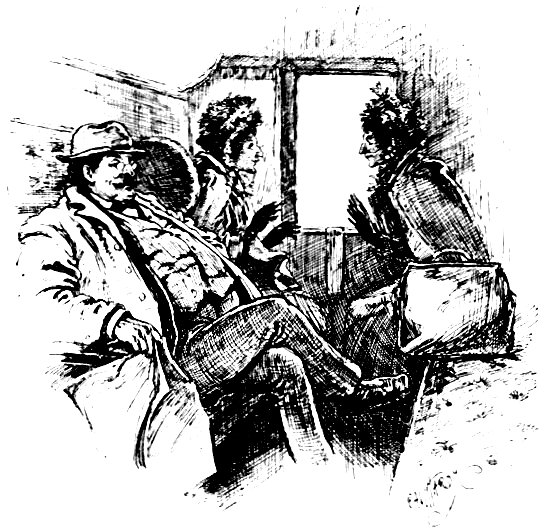
"THEY TALKED FREELY."
"I suppose," said Melissa, "that my bonnet looks all right? It does not strike the eyes as being too much trimmed, eh, Annora?"
"Well," said Annora, laughing, "it is too much trimmed for good taste, but then on this occasion you have bad taste. What about mine?"
"Oh, quite artistic; 'a study in black and white,' as the artists say."
The ladies laughed together, full of glee at their coming triumph over the Custom House officers. The German wore the fatuous grin affected by people who listen to a language which they do not understand.
At last the train slowed into Blandain Station, the frontier! Out jumped the Misses Wylie with their hand baggage. They calmly awaited the approach of the officers. Out lumbered the German with his fatuous smile. He sauntered up to one of the chiefs of the douane.
"Rien à déclarer," said both ladies.
"Eau de Cologne, dentelles, tabac, spiritueux—" the officer ran off.
"Rien, rien," said the Misses Wylie.
The man said nothing more, and the ladies, expecting the cry of "En voiture, s'il vous plaît!" felt extremely happy.
But at that moment the official to whom the German had been speaking came up to them and said, in very fair English, "The ladies are fond of lace?"
Their hearts sank within them. "Rather," they conceded.
"And to carry it on the bonnet is a convenient manner of avoiding the duty."
They were undone!
"But we are wearing it!" screeched Annora; Melissa panted.
"Mesdames, I admire your ingenuity, but such an amount of new lace cannot be passed, even on your bonnets. Two, three, five mètres," he went on, measuring the unlucky lace with his eye, "fichu, flounce, and so forth; so many francs, or I confiscate it."
"En voiture, s'il vous plaît!" was heard.
The sum demanded by the officer, added to what they had paid in purchase, would have made the lace the dearest that ever was bought. They tore off their bonnets, pulled out innumerable pins, set free the fichus, flounces, etc., put them into the officer's hands, and ran to their seats. Out of breath and out of pocket, they were most unhappy. Successful cheating is one thing; but unsuccessful cheating is another, and causes sharp pangs of conscience.
"Too bad!" cried Melissa, as the train moved on; "we were entitled to what we wore."
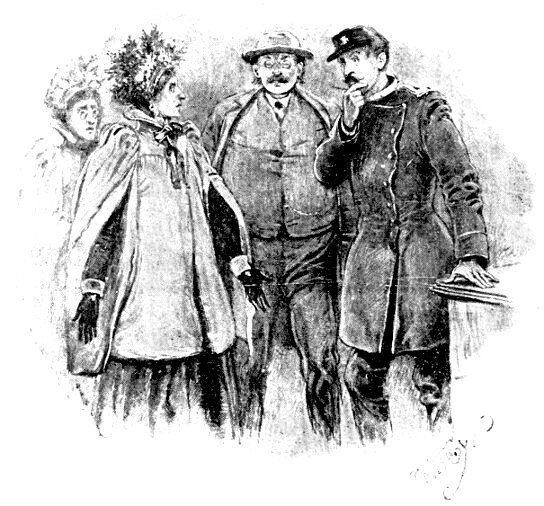
"'WE ARE WEARING IT!' SCREECHED ANNORA."
"It was that German," said Annora. "He understood English; he heard what we said; he told the official. Oh, a man may grin, and grin, and be a villain!"
They groaned over their misfortune. The first time the train stopped the villain entered their compartment, still grinning. They glared at him, but he still grinned. They took refuge in silence; he began to speak.
"Ladies," he said in Londonese English, "I was very sorry to have to incur your displeasure, but I felt that it was my duty to report you at the douane. You had innocently told me all about the lace on your bonnets, and for the credit of our country, for the sake of English honesty, I was constrained to point out your bonnets to that official. Can you forgive me?"
"No," said Annora.
But Melissa thought that, notwithstanding his wicked cruelty, there was something very pleasant in his smile.
"I entreat your forgiveness, ladies; more, I humbly ask a favour."
"Sir?" exclaimed Annora.
"Miss Wylie, Miss Annora Wylie"—the presuming wretch had seen their names on their luggage, even their Christian names—"you will confer a great favour on me if you will tell me your address."
Annora reddened, Melissa blushed. Perhaps he was ashamed of the cruel part he had played and was about to offer an apology; perhaps their brave and gentle endurance of misfortune had touched him; perhaps their charms had so won upon him that he wished to see more of them, with a view to—their suppositions broke off abruptly.
Annora looked at Melissa, and Melissa looked at Annora. Then the elder sister spoke. "We live at 113, Angelina Gardens, Edwin Square, South Kensington, S.W."
The stranger made a note of the address. Melissa was on the point of asking his name, when he said abruptly, "You shall hear from me." Then he discoursed on the country through which they were passing; after which he buried himself in a Figaro and talked no more. At the next stoppage he said a brusque "Good morning, ladies," and left the compartment, and they saw no more of him.
There was a considerable flutter in the breast of Melissa, who was of a romantic turn of mind, and who could only imagine one reason why this stranger should want her address. She still believed that he was a German who spoke English remarkably well, and she had seen that he was not a gentleman; she therefore made up her mind to refuse the offer of marriage which, no doubt, he would shortly make.
Arrived in Angelina Gardens, the Misses Wylie were occupied in arranging the household, and a couple of busy days were spent by them. On the third day after their home-coming they received, by the same post, a parcel and a letter. Annora opened the carefully tied and sealed parcel, while Melissa read the letter. Having read it once to herself, she next read it aloud to her sister:
"Mesdames,—I felt myself under a very great obligation to you the other day at[Pg 245] Blandain. I am a very thin man, but I was swathed round with hundreds of yards of fine Brussels lace, and I thought that the best way of drawing the attention of the Custom House officers from myself was to draw it to you. It was purely in self-defence that I directed the raid on your bonnets. Having been the cause of the loss of your lace, I wish to make you due compensation, and I beg leave to send you some finer lace than that which you lost.
"I am, obediently yours, "Your Stout Fellow-Traveller."
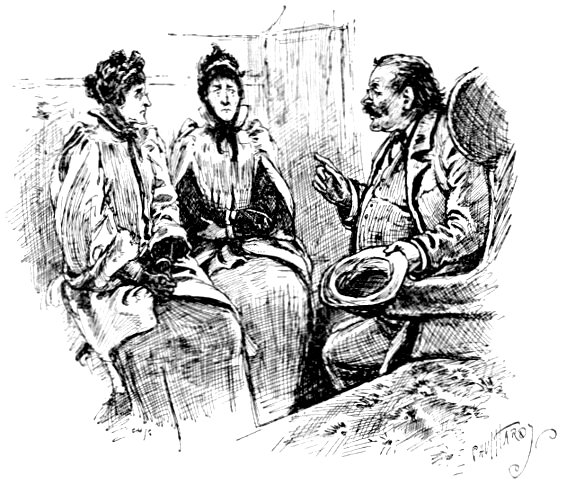
"YOU SHALL HEAR FROM ME."
Melissa took possession of a black lace flounce, and Annora of a dozen yards of white lace and a lace-edged handkerchief, and they quite forgave the stout German for his cruelty and for his stoutness.
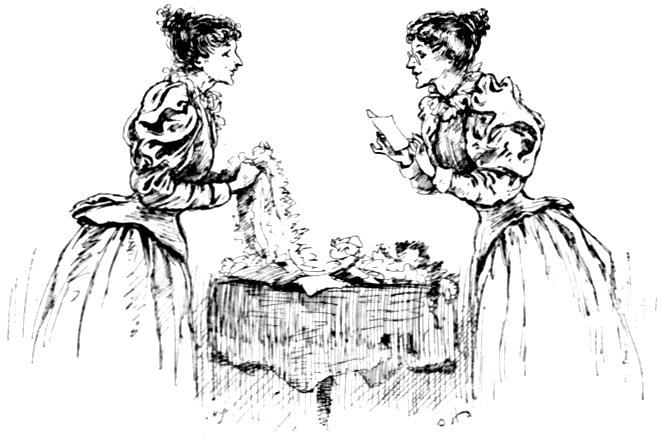
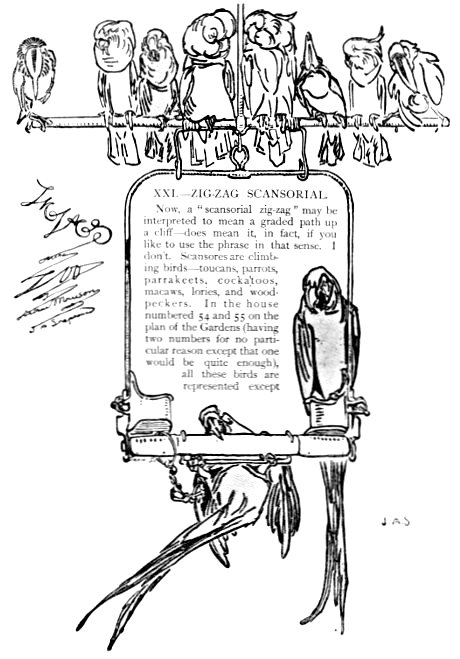
By Arthur Morrison and J A Shepherd
Now, a "scansorial zig-zag" may be interpreted to mean a graded path up a cliff—does mean it, in fact, if you like to use the phrase in that sense. I don't. Scansores are climbing birds—toucans, parrots, parrakeets, cockatoos, macaws, lories, and woodpeckers. In the house numbered 54 and 55 on the plan of the Gardens (having two numbers for no particular reason except that one would be quite enough), all these birds are represented except[Pg 247] the woodpecker. The woodpecker is also excluded from this zig-zag for similar reasons, which I can't remember at this moment. One may be the fact of the woodpecker tapping, whereas all taps is vanities.
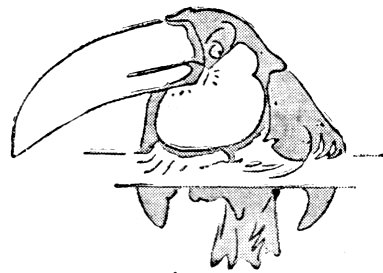
YES?
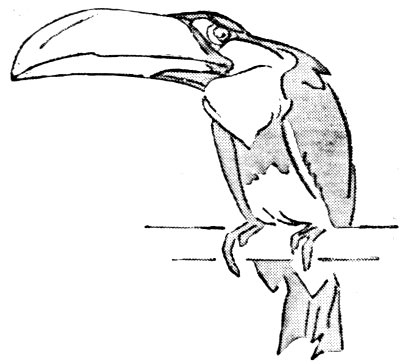
REALLY?
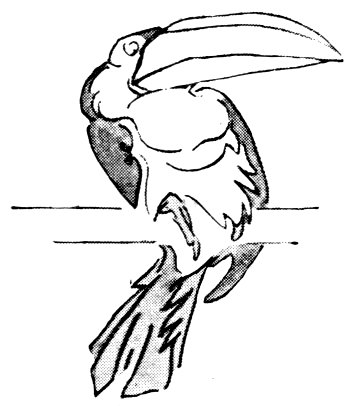
DEAR, DEAR!
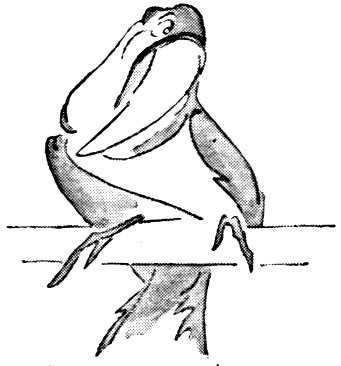
INDEED!
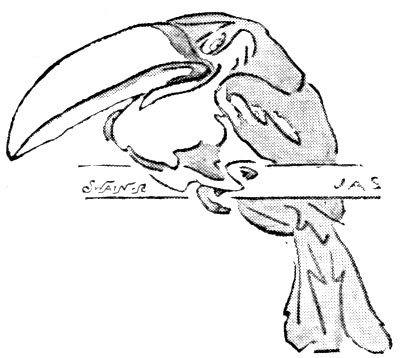
THERE NOW!
A toucan is a beak, fitted with an inadequate bird at the hinder end. It is over against the wall, opposite the front door of 54 and 55, that one recognises the fine Roman nose of the toucan. A green nose, a red nose, a yellow nose, a black nose, all these colours you may see, but all nobly Roman as to shape. The toucan will not talk in the manner of the parrot, but he (or she) is an admirable listener. I have told the green-billed toucan many stories of bird-scandal without interruption, and, on the whole, the conversation has been most improving. "Dear, dear!"—"Really, now"—"Who'd have thought it?"—"No—o—o—o! You don't really say so? Well, you do surprise me!" These are the only contributions offered to the talk by the green-billed toucan, and even these are only in pantomime. An ideal listener, the toucan. I have a horrible temptation to say that toucan play at that game, and that if you are anxious not to be toucandid, you toucan say nothing, and the bird will listen just as respectfully; but a pious bringing-up enables me to cast the temptation from me—toucancel the inclination, in fact. Howbeit, the truth remains that the toucan will listen with perfect attention whether you proffer information aloud or get no further than inventing it.
The toucan will chatter horribly in native freedom, but that is only when many hundreds of other toucans are present to keep it in countenance; for the toucan's voice is not pretty, and he knows it. Still, when hundreds assemble, every one with a discordant voice, nothing is more natural than that they should all shout at once, and unite in the belief that the performance is admirable. If there were any ugly women (there are not, of course—it is a mere hypothesis), and they were all collected together to the number of many hundreds on a solitary island, the first thing they would do would be to hold a beauty show with a prize for everybody, and next they would fight over the distribution of those prizes. The toucans do something very much like this—minus the fighting, because the prize is mutual admiration. They chatter and scream in their hundreds—taking care to leave a sentinel on guard, because other animals won't stand anything, even in South America—and at intervals they all join in a simultaneous yell of approbation, audible half a league off. The whole performance is a sad piece of humbug, which makes one marvel greatly that because of it the South American natives call the toucan the Preacher-bird. Here, with so many gorgeous parrots and macaws about, the toucan behaves with becoming modesty, but in the presence of any duller-clad bird than itself its arrogance is frightful. A great crowd of toucans will mob any such unfortunate creature with much chatter, till, surrounded by long and threatening bills, like a despairing debtor, he "hops the twig"—if he can.

SLEEP.
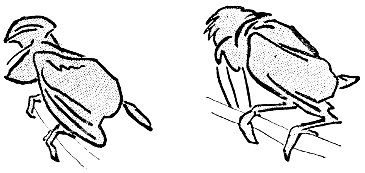
GRADUAL—
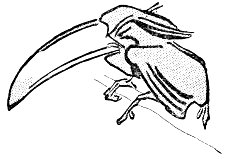
AWAKENING.
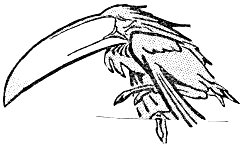
OH, SUCH A HEAD!
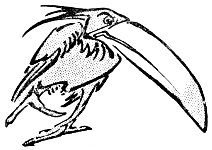
TRY BREAKFAST.
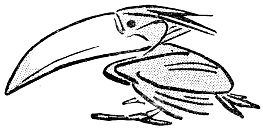
OH, I CAN'T!
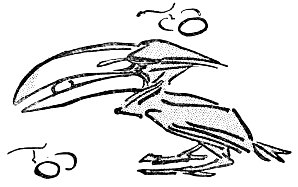
WELL, HERE GOES
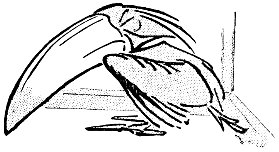
OH!
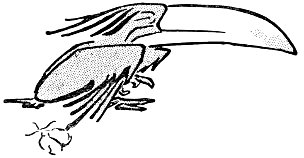
NO.
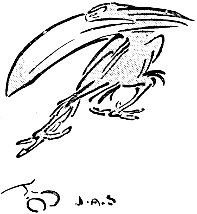
I CAN'T—
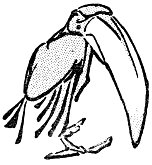
TOUCH ANOTHER.
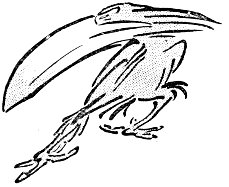
UGH!
Perhaps the most dissipated-looking creature in the animal kingdom is a toucan during a bad moult. You long to give him a gallon of soda-water and a temperance tract. He sleeps much (a toucan always sleeps with his beak over his shoulder and covered by his wing—he doesn't mean to have that nose[Pg 248] stolen)—he sleeps as much as possible, and wakes as seedy as one can imagine. He can scarcely drag his beak off his back without banging it on his perch, and considers the question of breakfast with a shudder. With many blinks he strives desperately to pull himself together—to pull together a handful of loose quills and a beak. They give him grapes; it is a mockery. Who can eat grapes with such a head? He may struggle with a grape perhaps for a few seconds, but[Pg 249] breakfast beats him in the end, and he retires to a repentant corner. What a night it must have been!
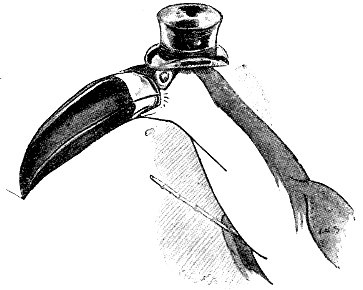
A LITTLE HORSEY
Out of his moult, however, and in good feather, the toucan is rather a fine bird, so long as you forget his nose. The Ariel toucan here—with the black beak—is a little horsey in aspect—a very little—but quite neat and gentlemanly. Not such a real old crusted Tory-club-window gentleman as the Triton cockatoo, but still a gentleman. As for the green-billed toucan, she can never be anything but a good-natured Jewess in her most gorgeous Shabbos clothes.
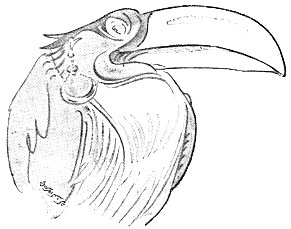
"VELL RACHAEL!"
The comparative quietness of the toucans in house number 54-55 is, probably, due to a worse thing—the noise of the parrots and cockatoos; the house can hold no more noise, and the toucans altogether despair of ever making themselves heard. Why the windows are so rarely broken I can scarcely understand, except on the hypothesis of a suspension of natural laws for the benefit of natural science and its institutions. The keeper says he doesn't mind the noise—to such torture may human nature be accommodated by long habit. Saint Cecilia would have become accustomed to boiling if she had had forty years of it. The other saint (male, but I forget which) who was grilled could never have done without his hot gridiron if he had been able to keep on it for forty years, the time this keeper has been among these parrots. Personally, I should expect to become reconciled to boiling, grilling, or any other class of plain cookery, in about half the time that would elapse before a few hundred competitive parrot-yells began to feel soothing to the nerves.
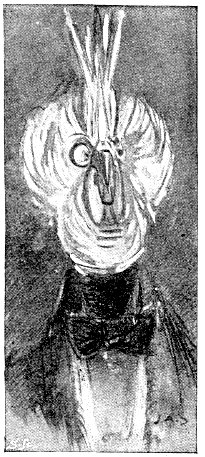
PORTRAIT OF A GENTLEMAN (CRUSTED).
There is no other house in these Gardens where the unobtrusive visitor is so made to feel his utter smallness and insignificance—and that by mere brazen clamour—as in this. The elephants look large—they are large—but the elephants behave with gentlemanly quietness and self-respect. The parrots rise up and curse you (and everything else) with sudden and painful unanimity. You are appalled, dwarfed, made insignificant and ashamed by the overpowering vastness of—the mere row.
The fact is that each single individual of this crowd of parrots, cockatoos, macaws, and parrakeets holds his own importance above every other created thing as a prime article of belief, and is naturally and most virtuously indignant when he finds that you don't go directly to him and load him with presents. Therefore, he blares and screams at you, till the air swims in your ears and eyes and the outer world is but a chaos of great beaks, angry combs, and streaks of red, green, and white. If you venture so[Pg 250] far as to make an invidious selection, and tender a peace-offering to a particular bird, you draw down upon your devoted head the double rage and united jealousy of all the other parrots, cockatoos, parrakeets, and macaws, each convinced that you couldn't possibly have seen him or you would never have slighted so superlative a creature; and again the air and the colours swim to your senses. The whole sensation is not unlike that produced by a long inspection of immense thundering and shrieking engineering works. You feel bewildered and you feel small: and everything about you is metallic and mechanical. Every movement of a parrot, if you will but notice it, is suggestive of metal joints and mechanical action; and the voice—but there is no metal metallic enough to emit such a voice as that at its worst.
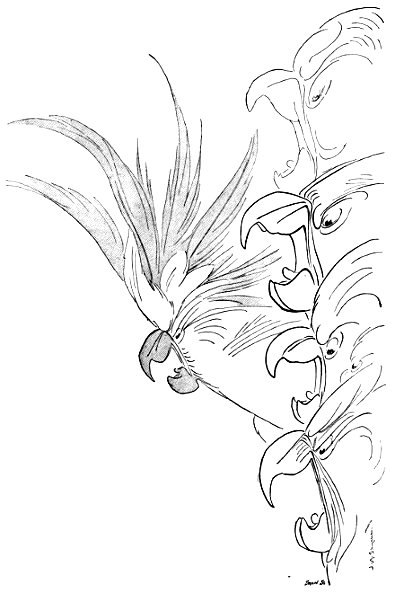

There is a married couple here—Triton cockatoos—near the keeper's room. They nag and quarrel and snarl at one another, and all on strictly mechanical principles. Their only gibe is an inarticulate snarl delivered when repartee seems unlikely. Thus, Mr. C. observing Mrs. C. apparently asleep will snarl ferociously, and compose himself to rest.[Pg 251] In a little while Mrs. C. will rouse herself, and perceiving the placid quiescence of Mr. C., will snarl at him and go to sleep again: all this with a mechanic jerk of the head and neck suggestive of Punch or an automaton. After a while, perhaps, the inclination for a snarl will take both at once, and, finding themselves face to face, with nothing original to say, they will subside and sulk for the rest of the day, each trying hard to think of some particularly unkind remark to hurl at the other.
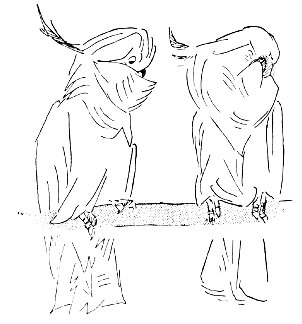
"YAP—YAP!"
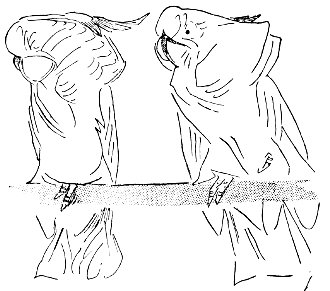
"YAP!"
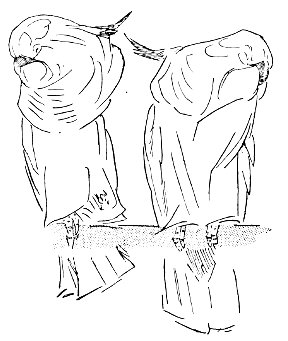
SULK.
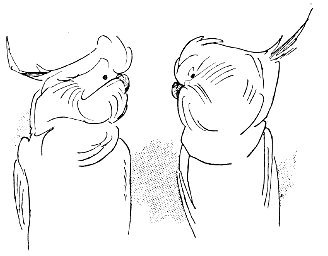
"Y——"
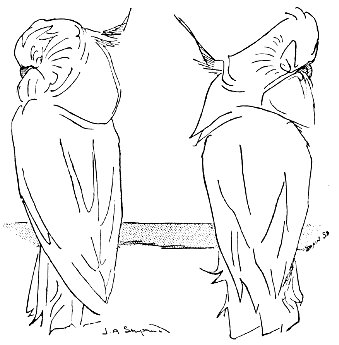
SULK.
Cocky, the big Triton, has been moved here from the insect-house, and shows signs of forgetting his English. That is what will occur in a congregation of this sort. The marvel is that many of the birds will still talk at all. An old, rose-crested cockatoo will dance gracefully, with his head on one side (and his eye on the reward), at the offer of a nut. He is called Cocky, in common with all of his kind, just as the parrot is always Polly; but I prefer to call him Richardson, because his is, practically speaking,[Pg 252] the only show in the fair. There is a slender-billed cockatoo, who offers me a warlike challenge to "come on" whenever I approach him, and a few more who have a word or two, but Richardson is the only bird capable of a decent show. He will stand at his cage wires and bawl out "What ho! what ho! what ho!" in a way that confirms his classification as a showman and gives a hint of aspirations to tragedy. Richardson is the least mechanical of the birds here, and is a most respectable and old-fashioned veteran, who would look quite in character taking snuff, and whose polite accomplishments have not been ruined by his residence among unmannered crowds of other birds.
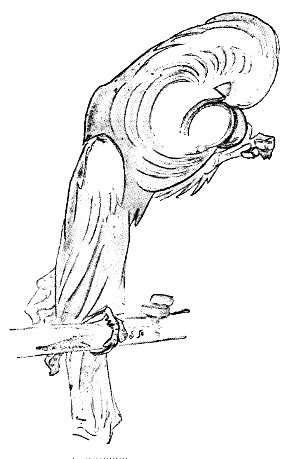
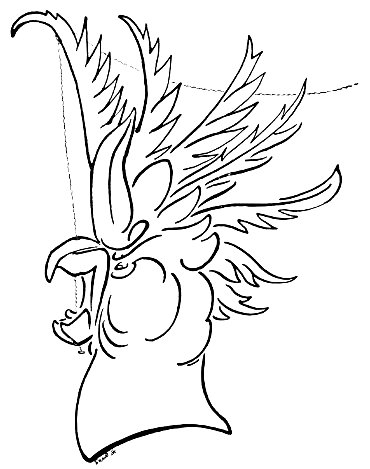
OPEN.
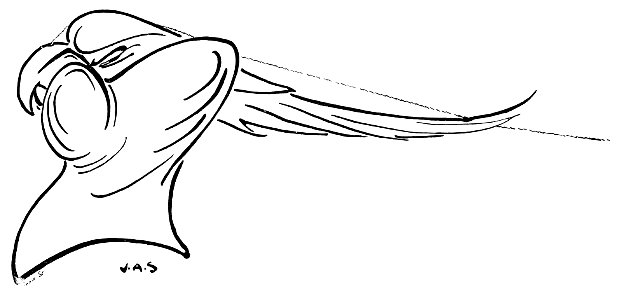
SHUT.
But, mannered or not, here is nothing but a crowd of screaming, unfeeling, snapping painted machines. I have never seen a plucked parrot, but I know, without seeing, that you have only to pluck one to lay bare nuts and bolts, cams, hinges, springs, cranks, and metallic joints. See a cockatoo spread and shut his crest: clearly it is just the motion that could be actuated by a string on the wooden harlequin principle: probably, as there is no string, there is a long spiral spring under the feathers of the head (just lying along where some people part their hair) set going by a catch on the principle of the air-gun trigger. As to the gorgeous mechanisms on perches that hang in a line down the main aisle, every joint, sound, and motion spells "clockwork" aloud. Such of these as speak have one word, which is "Hullo!" This, in varying degrees of urgency and gruffness, will greet you as you pass along the line—[Pg 253]if you show any indication of nuts; otherwise you are insignificant, and unworthy of notice. One fine blue and yellow machine will not say "Hullo" without receiving a nut in advance; probably being constructed on the familiar automatic principle. But it is all an expressionless outcome of clockwork.
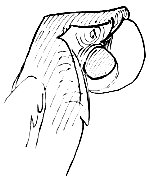
"Hullo!"
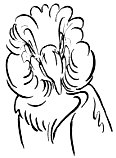
"WHAT HO!"
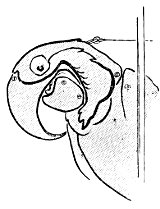
"Hullo!"
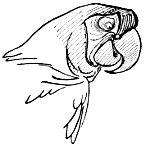
"Hullo!"
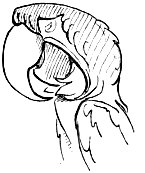
"Hullo!"
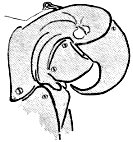
"HULLO!"
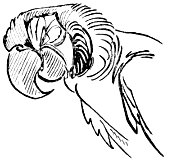
"HULLO!"
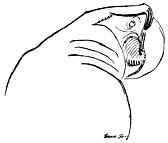
"HULLO!"
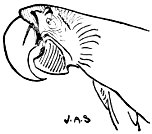
"HULLO!"
We seldom see among the lists of "patents sealed" and "provisional protections" granted, any reference to an invention for improvements in the mechanism of parrots and cockatoos. It is a remarkable thing that so obvious a field for invention and improvement should have been so much neglected. Plainly, an easy and obvious improvement would be the provision of a simple shut-off valve, by which the suffering proprietor could stop the parrot's steam whistle when desired. The desirability of some such improvement need not be[Pg 254] enlarged upon, and, once the appliance were in the market, every parrot-owner would hasten to have it fitted to his machine. Another contrivance, having the same object, would consist of a self-acting escape valve, by which the familiar scream of the mechanism would be diverted, and escape noiselessly through a small grating at the back of the neck after a certain degree of pressure had been attained. Moreover, what more easy than to have the outer side of the jaw-hinge fitted with a convenient butterfly-nut, by tightening which, after the periodical stoking with maize and so forth, the engine would be prevented from nipping carelessly-offered fingers? As it is at present, the jaw-hinge is a mere ordinary pair of sharp pincers barbarically ornamented with feathers and colours. Improvements suggest themselves at every point. Many of these otherwise amusing instruments cause trouble by occasionally breaking out into startling and exceedingly forcible language. It would seem that a pressure valve might be profitably employed in this case also, by means of which, as soon as the expressions reached to the degree of "blow it," or "shut up," the power would be immediately diverted, and either allowed to escape harmlessly through a small chimney at the top of the head, or else conducted by a power-transmitting mechanism to an adjacent musical-box, which would play "Pop Goes the Weasel," or something else of a similarly moral tendency. The whole subject is full of profitable suggestions, which are offered, free of any expense beyond a small royalty to myself, to the notice of persons of mechanical genius.
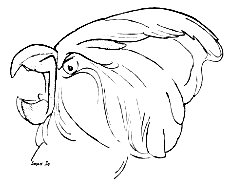
A MERE
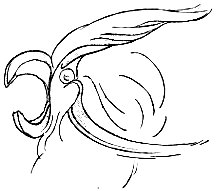
PAIR
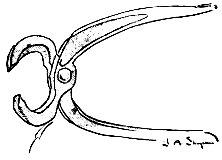
OF PINCERS.
By the Authors of "The Medicine Lady."
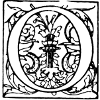
On a certain cold morning in early spring, I was visited by two ladies, mother and daughter. The mother was dressed as a widow. She was a tall, striking-looking woman, with full, wide-open dark eyes, and a mass of rich hair turned back from a white and noble brow. Her lips were firm, her features well formed. She seemed to have plenty of character, but the deep lines of sadness under her eyes and round her lips were very remarkable. The daughter was a girl of fourteen, slim to weediness. Her eyes were dark, like her mother's, and she had an abundance of tawny brown and very handsome hair. It hung down her back below her waist, and floated over her shoulders. She was dressed, like her mother, in heavy mourning, and round her young mouth and dark, deep eyes there lingered the same inexpressible sadness.
I motioned my visitors to chairs, and waited as usual to learn the reason of their favouring me with a call.
"My name is Heathcote," said the elder lady. "I have lately lost my husband. I have come to you on account of my daughter—she is not well."
I glanced again more attentively at the young girl. I saw that she looked overstrained and nervous. Her restlessness, too, was so apparent that she could scarcely sit still, and catching up a paper-knife which stood on the table near, she began twirling it rapidly between her finger and thumb.
"It does me good to fidget with something," she said, glancing apologetically at her mother.
"What are your daughter's symptoms?" I asked.
Mrs. Heathcote began to describe them in the vague way which characterizes a certain class of patient. I gathered at last from her words that Gabrielle would not eat—she slept badly—she was weak and depressed—she took no interest in anything.
"How old is Miss Gabrielle?" I asked.
"She will be fifteen her next birthday," replied her mother.
All the while Mrs. Heathcote was speaking, the young daughter kept her eyes fixed on the carpet—she still twirled the paper-knife, and once or twice she yawned profoundly.
I asked her to prepare for the usual medical examination. She complied without any alacrity, and with a look on her face which said plainly, "Young as I am, I know how useless all this fuss is—I only submit because I must."
I felt her pulse and sounded her heart and lungs. The action of the heart was a little weak, but the lungs were perfectly healthy. In short, beyond a general physical and mental debility, I could find nothing whatever the matter with the girl.
After a time, I rang the bell to desire my servant to take Miss Heathcote into another room, in order that I might speak to her mother alone.
The young lady went away very unwillingly. The sceptical expression on her face was more apparent than ever.
"You will be sure to tell me the exact truth?" said Mrs. Heathcote, as soon as we were alone.
"I have very little to tell," I replied. "I have examined your daughter carefully. She is suffering from no disease to which a name can be attached. She is below par, certainly; there is weakness and general depression, but a tonic ought to set all these matters right."
"I have tried tonics without avail," said Mrs. Heathcote.
"Has not your family physician seen Miss Heathcote?"
"Not lately." The widow's manner became decidedly hesitating. "The fact is, we have not consulted him since—since Mr. Heathcote's death," she said.
"When did that take place?"
"Six months ago."
Here she spoke with infinite sadness, and her face, already very pale, turned perceptibly paler.
"Is there nothing you can tell me to give me a clue to your daughter's condition? Is there anything, for instance, preying on her mind?"
"Nothing whatever."
"The expression of her face is very sad for so young a girl."

"I FELT HER PULSE."
"You must remember," said Mrs. Heathcote, "that she has lately lost her father."
"Even so," I replied; "that would scarcely account for her nervous condition. A healthy-minded child will not be overcome with grief to the serious detriment of health after an interval of six months. At least," I added, "that is my experience in ordinary cases."
"I am grieved to hear it," said Mrs. Heathcote.
She looked very much troubled. Her agitation was apparent in her trembling hands and quivering lips.
"Your daughter is in a nervous condition," I said, rising. "She has no disease at present, but a little extra strain might develop real disease, or might affect her nerves, already overstrung, to a dangerous degree. I should recommend complete change of air and scene immediately."
Mrs. Heathcote sighed heavily.
"You don't look very well yourself," I said, giving her a keen glance.
She flushed crimson.
"I have felt my sorrow acutely," she replied.
I made a few more general remarks, wrote a prescription for the daughter, and bade Mrs. Heathcote good-bye. About the same hour on the following morning I was astonished when my servant brought me a card on which was scribbled in pencil the name Gabrielle Heathcote, and underneath, in the same upright, but unformed hand, the words, "I want to see you most urgently."
A few moments later, Miss Gabrielle was standing in my consulting-room. Her appearance was much the same as yesterday, except that now her face was eager, watchful, and all awake.
"How do you do?" she said, holding out her hand, and blushing. "I have ventured to come alone, and I haven't brought a fee. Does that matter?"
"Not in the least," I replied. "Pray sit down and tell me what you want."
"I would rather stand," she answered; "I feel too restless and excited to sit still. I stole away from home without letting mother know. I liked your look yesterday and determined to see you again. Now, may I confide in you?"
"You certainly may," I replied.
My interest in this queer child was a good deal aroused. I felt certain that I was right in my conjectures of yesterday, and that this young creature was really burdened with some secret which was gravely undermining her health.
"I am willing to listen to you," I continued. "You must be brief, of course, for I am a very busy man, but anything you can say which will throw light on your own condition, and so help me to cure you, will, of course, be welcome."
"You think me very nervous?" said Miss Gabrielle.
"Your nerves are out of order," I replied.
"You know that I don't sleep at night?"
"Yes."
Miss Gabrielle looked towards the door.
"Is it shut?" she asked, excitedly.
"Of course it is."
She came close to me, her voice dropped to a hoarse whisper, her face turned not only white but grey.
"I can stand it no longer," she said. "I'll tell you the truth. You wouldn't sleep either if you were me. My father isn't dead!"
"Nonsense," I replied. "You must control such imaginings, Miss Gabrielle, or you will really get into a very unhealthy condition of mind."
"That's what mother says when I speak to her," replied the child. "But I tell you, this thing is true. My father is not dead. I know it."
"How can you possibly know it?" I asked.
"I have seen him—there!"
"You have seen your father!—but he died six months ago?"
"Yes. He died—and was buried, and I went to his funeral. But all the same he is not dead now."
"My dear young lady," I said, in as soothing a tone as I could assume, "you are the victim of what is called a hallucination. You have felt your father's death very acutely."
"I have. I loved him beyond words. He was so kind, so affectionate, so good to me. It almost broke my heart when he died. I thought I could never be happy again. Mother was as wretched as myself. There weren't two more miserable people in the wide world. It seemed impossible to either of us to smile or be cheerful again. I began to sleep badly, for I cried so much, and my eyes ached, and I did not care for lessons any more."
"All these feelings will pass," I replied; "they are natural, but time will abate their violence."
"You think so?" said the girl, with a strange smile. "Now let me go on with my story: It was at Christmas time I first saw my father. We live in an old house at Brixton. It has a walled-in garden. I was standing by my window about midnight. I had been in bed for an hour or more, but I could not sleep. The house was perfectly quiet. I got out of bed and went to the window and drew up the blind. I stood by the window and looked out into the garden, which was covered with snow. There, standing under the window, with his arms folded, was father. He stood perfectly still, and turned his head slowly, first in the direction of my room and then in that of mother's. He stood there for quite five minutes, and then walked across the grass into the shelter of the shrubbery. I put a cloak on and rushed downstairs. I unbolted the front door and went into the garden. I shouted my father's name and ran into the shrubbery to look for him, but he wasn't there, and I—I think I fainted. When I came to myself I was in bed and mother was bending over me. Her face was all blistered as if she had been crying terribly. I told her that I had just seen father, and she said it was a dream."
"So it was," I replied.
Miss Gabrielle's dark brows were knit in some pain.
"I did not think you would take that commonplace view," she responded.
"I am sorry I have offended you," I answered. "Girls like you do have bad dreams when they are in trouble, and those dreams are often so vivid, that they mistake them for realities."
"Very well, then, I have had more of those vivid dreams. I have seen my father again. The last time I saw him he was in the house. It was about a month ago. As usual, I could not sleep, and I went downstairs quite late to get the second volume of a novel which interested me. There was father walking across the passage. His back was to me. He opened the study door and went in. He shut it behind him. I rushed to it in order to open it and follow him. It was locked, and though I screamed through the key-hole, no one replied to me. Mother found me kneeling by the study door and shouting through the key-hole to father. She was up and dressed, which seemed strange at so late an hour. She took me upstairs and put me to bed, and pretended to be angry with me, but when I told her that I had seen father she burst into the most awful bitter tears and said:—
"'Oh, Gabrielle, he is dead—dead—quite dead!'
"'Then he comes here from the dead,' I said. 'No, he is not dead. I have just seen him.'
"'My poor child,' said mother, 'I must take you to a good doctor without delay. You must not get this thing on your brain.'
"'Very well,' I replied; 'I am quite willing to see Dr. Mackenzie.'"
I interrupted the narrative to inquire who Dr. Mackenzie was.
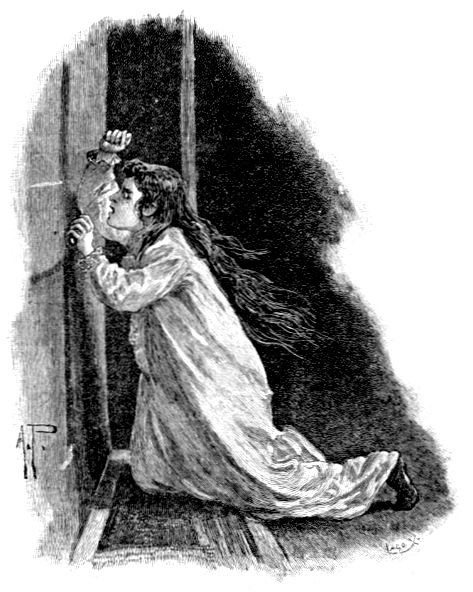
"I SCREAMED THROUGH THE KEY-HOLE."
"He is our family physician," replied the young lady. "He has attended us for years."
"And what did your mother say when you proposed to see him?"
"She shivered violently, and said, 'No, I won't have him in the house.' After a time she decided to bring me to you."
"And have you had that hallucination again?" I inquired.
"It was not a hallucination," she answered, pouting her lips.
"I will humour you," I answered. "Have you seen your father again?"
"No, and I am not likely to."
"Why do you think that?"
"I cannot quite tell you—I think mother is in it. Mother is very unhappy about something, and she looks at me at times as if she were afraid of me." Here Miss Heathcote rose. "You said I was not to stay long," she remarked. "Now I have told you everything. You see that it is absolutely impossible for ordinary medicines to cure me, any more than ordinary medicines can cure mother of her awful dreams."
"I did not know that your mother dreamt badly," I said.
"She does—but she doesn't wish it spoken of. She dreams so badly, she cries out so terribly in her sleep, that she has moved from her old bedroom next to mine, to one in a distant wing of the house. Poor mother, I am sorry for her, but I am glad at least that I have had courage to tell you what I have seen. You will make it your business to find out the truth now, won't you?"
"What do you mean?" I asked.
"Why, of course, my father is alive," she retorted. "You have got to prove that he is, and to give him back to me again. I leave the matter in your hands. I know you are wise and very clever. Good-bye, good-bye!"
The queer girl left me, tears rolling down her cheeks. I was obliged to attend to other patients, but it was impossible for me to get Miss Heathcote's story out of my head. There was no doubt whatever that she was telling me what she firmly believed to be the truth. She had either seen her father once more in the flesh, or she was the victim of a very strong hallucination. In all probability the latter supposition was the correct one. A man could not die and have a funeral and yet still be alive: but, then, on the other hand, when Mrs. Heathcote brought Gabrielle to see me yesterday, why had she not mentioned this central and principal feature of her malady? Mrs. Heathcote had said nothing whatever with regard to Gabrielle's delusions. Then why was the mother so nervous? Why did she say nothing about her own bad dreams, dreams so disturbing, that she was obliged to change her bedroom in order that her daughter should not hear her scream?
"I leave the matter in your hands!" Miss Heathcote had said. Poor child, she had done so with a vengeance. I could not get the story out of my thoughts, and so uncomfortable did the whole thing make me that I determined to pay Dr. Mackenzie a visit.
Mackenzie was a physician in very large[Pg 259] practice at Brixton. His name was already familiar to me—on one or two occasions I had met him in consultation. I looked up his address in the Medical Directory, and that very evening took a hansom to his house. He happened to be at home. I sent in my card and was admitted at once.
Mackenzie received me in his consulting-room, and I was not long in explaining the motive of my visit. After a few preliminary remarks, I said that I would be glad if he would favour me with full particulars with regard to Heathcote's death.
"I can easily do so," said Mackenzie. "The case was a perfectly straightforward one—my patient was consumptive, had been so for years, and died at last of hemoptysis."
"What aged man was he?" I asked.
"Not old—a little past forty—a tall, slight, good-looking man, with a somewhat emaciated face. In short, his was an ordinary case of consumption."
I told Mackenzie all about the visit which I had received from Mrs. Heathcote, and gave him a faithful version of the strange story which Miss Gabrielle Heathcote had told me that day.
"Miss Gabrielle is an excitable girl," replied the doctor. "I have had a good deal to do with her for many years, and always thought her nerves highly strung. She is evidently the victim of a delusion, caused by the effect of grief on a somewhat delicate organism. She probably inherits her father's disease. Mrs. Heathcote should take her from home immediately."
"Mrs. Heathcote looks as if she needed change almost as badly as her daughter," I answered; "but now you will forgive me if I ask you a few more questions. Will you oblige me by describing Heathcote's death as faithfully as you can?"
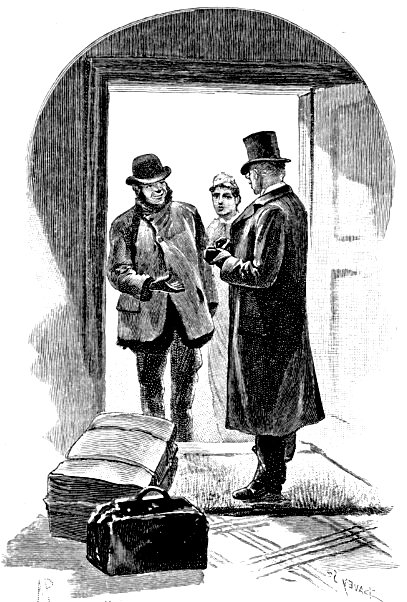
"I WAS PAYING THE CABMAN HIS FARE."
"Certainly," replied the physician.
He sank down into a chair at the opposite side of the hearth as he spoke.
"The death, when it came," he continued, "was, I must confess, unexpected. I had sounded Heathcote's lungs about three months previous to the time of his death seizure. Phthisis was present, but not to an advanced degree. I recommended his wintering abroad. He was a solicitor by profession, and had a good practice. I remember his asking me, with a comical rise of his brows, how he was to carry on his profession so many miles from Chancery Lane. But to come to his death. It took place six months ago, in the beginning of September. It had been a hot season, and I had just returned from my holiday. My portmanteau and Gladstone bag had been placed in the hall, and I was paying the cabman his fare, when a servant from the Heathcotes arrived, and begged of me to go immediately to her master, who was, she said, dying.
"I hurried off to the house without a moment's delay. It is a stone's throw from here. In fact, you can see the walls of the garden from the windows of this room in the daytime. I reached the house. Gabrielle was standing in the hall. I am an old friend of hers. Her face was quite white and had a stunned expression. When she saw me she rushed to me, clasped one of my hands in both of hers, and burst into tears.
"'Go and save him!' she gasped, her voice choking with sobs, which were almost hysterical.
"A lady who happened to be staying in the house came and drew the girl away into one of the sitting-rooms, and I went upstairs. I found Heathcote in his own room. He was lying on the bed—he was a ghastly sight. His face wore the sick hue of death itself; the sheet, his[Pg 260] hair, and even his face were all covered with blood. His wife was standing over him, wiping away the blood, which oozed from his lips. I saw, of course, immediately what was the matter. Hemoptysis had set in, and I felt that his hours were numbered.
"'He has broken a blood vessel,' exclaimed Mrs. Heathcote. 'He was standing here, preparing to go down to dinner, when he coughed violently—the blood began to pour from his mouth: I got him on the bed and sent for you. The hemorrhage seems to be a little less violent now.'
"I examined my patient carefully, feeling his pulse, which was very weak and low; I cautioned him not to speak a single word, and asked Mrs. Heathcote to send for some ice immediately. She did so. I packed him in ice and gave him a dose of ergotine. He seemed easier, and I left him, promising to return again in an hour or two. Miss Gabrielle met me in the hall as I went out.
"'Is he any better? Is there any hope at all?' she asked, as I left the house.
"'Your father is easier now,' I replied; 'the hemorrhage has been arrested. I am coming back soon. You must be a good girl and try to comfort your mother in every way in your power.'
"'Then there is no hope?' she answered, looking me full in the face.
"I could not truthfully say that there was. I knew poor Heathcote's days were numbered, although I scarcely thought the end would come so quickly."
"What do you mean?" I inquired.
"Why this," he replied. "Less than an hour after I got home, I received a brief note from Mrs. Heathcote. In it she stated that fresh and very violent hemorrhage had set in almost immediately after I left, and that her husband was dead."
"And—" I continued.
"Well, that is the story. Poor Heathcote had died of hemoptysis."
"Did you see the body after death?" I inquired, after a pause.
"No—it was absolutely unnecessary—the cause of death was so evident. I attended the funeral, though. Heathcote was buried at Kensal Green."
I made no comment for a moment or two.
"I am sorry you did not see the body after death," I said, after a pause.
My remark seemed to irritate Mackenzie. He looked at me with raised brows.
"Would you have thought it necessary to do so?" he asked. "A man known to be consumptive dies of violent hemorrhage of the lungs. The family are in great trouble—there is much besides to think of. Would you under the circumstances have considered it necessary to refuse to give a certificate without seeing the body?"
I thought for a moment.
"I make a rule of always seeing the body," I replied; "but, of course, you were justified, as the law stands. Well, then, there is no doubt Heathcote is really dead?"
"Really dead?" retorted Mackenzie. "Don't you understand that he has been in his grave for six months?—That I practically saw him die?—That I attended his funeral? By what possible chance can the man be alive?"
"None," I replied. "He is dead, of course. I am sorry for the poor girl. She ought to leave home immediately."
"Girls of her age often have delusions," said Mackenzie. "I doubt not this will pass in time. I am surprised, however, that the Heathcotes allowed the thing to go on so long. I remember now that I have never been near the house since the funeral. I cannot understand their not calling me in."
"That fact puzzles me also," I said. "They came to me, a total stranger, instead of consulting their family physician, and Mrs. Heathcote carefully concealed the most important part of her daughter's malady. It is strange altogether; and, although I can give no explanation whatever, I am convinced there is one if we could only get at it. One more question before I go, Mackenzie. You spoke of Heathcote as a solicitor: has he left his family well off?"
"They are not rich," replied Mackenzie; "but as far as I can tell, they don't seem to want for money. I believe their house, Ivy Hall is its name, belongs to them. They live there very quietly, with a couple of maid-servants. I should say they belonged to the well-to-do middle classes."
"Then money troubles cannot explain the mystery?" I replied.
"Believe me, there is no mystery," answered Mackenzie, in an annoyed voice.
I held out my hand to wish him good-bye, when a loud peal at the front door startled us both. If ever there was frantic haste in anything, there was in that ringing peal.
"Someone wants you in a hurry," I said to the doctor.
He was about to reply, when the door of the consulting-room was flung wide open, and Gabrielle Heathcote rushed into the room.
"Mother is very ill," she exclaimed. "I think she is out of her mind. Come to her at once."
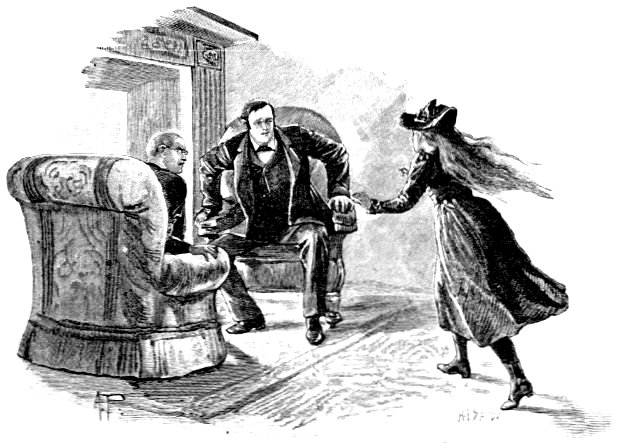
"GABRIELLE HEATHCOTE RUSHED INTO THE ROOM."
She took Mackenzie's hand in hers.
"There isn't a minute to lose," she said, "she may kill herself. She came to me with a carving-knife in her hand; I rushed away at once for you. The two servants are with her now, and they are doing all they can; but, oh! pray, do be quick."
At this moment Gabrielle's eyes rested on me. A look of relief and almost ecstasy passed over her poor, thin little face.
"You are here!" she exclaimed. "You will come, too? Oh, how glad I am."
"If Dr. Mackenzie will permit me," I replied, "I shall be only too pleased to accompany him."
"By all means come, you may be of the greatest use," he answered.
We started at once. As soon as we left the house Gabrielle rushed from us.
"I am going to have the front door open for you both when you arrive," she exclaimed. She disappeared as if on the wings of the wind.
"That is a good girl," I said, turning to the other doctor.
"She has always been deeply attached to both her parents," he answered.
We did not either of us say another word until we got to Ivy Hall. It was a rambling old house, with numerous low rooms and a big entrance-hall. I could fancy that in the summer it was cheerful enough, with its large, walled-in garden. The night was a dark one, but there would be a moon presently.
Gabrielle was waiting in the hall to receive us.
"I will take you to the door of mother's room," she exclaimed.
Her words came out tremblingly, her face was like death. She was shaking all over. She ran up the stairs before us, and then down a long passage which led to a room a little apart from the rest of the house.
"I told you mother wished to sleep in a room as far away from me as possible," she said, flashing a glance into my face as she spoke.
I nodded in reply. We opened the door and went in. The sight which met our eyes was one with which most medical men are familiar.
The patient was lying on the bed in a state of violent delirium. Two maid-servants were bending over her, and evidently much exciting her feelings in their efforts to hold her down. I spoke at once with authority.
"You can leave the room now," I said—"only remain within call in case you are wanted."
They obeyed instantly, looking at me with surprised glances, and at Mackenzie with manifest relief.
I shut the door after them and approached the bed. One glance showed that Mrs.[Pg 262] Heathcote was not mad in the ordinary sense, but that she was suffering at the moment from acute delirium. I put my hand on her forehead: it burned with fever. Her pulse was rapid and uneven. Mackenzie took her temperature, which was very nearly a hundred and four degrees. While we were examining her she remained quiet, but presently, as we stood together and watched her, she began to rave again.
"What is it, Gabrielle? No, no, he is quite dead, child. I tell you I saw the men screw his coffin down. He's dead—quite dead. Oh, God! oh, God! yes, dead, dead!"
She sat up in bed and stared straight before her.
"You mustn't come here so often," she said, looking past us into the centre of the room, and addressing someone whom she seemed to see with distinctness, "I tell you it isn't safe. Gabrielle suspects. Don't come so often—I'll manage some other way. Trust me. Do trust me. You know I won't let you starve. Oh, go away, go away."
She flung herself back on the bed and pressed her hands frantically to her burning eyes.
"Your father has been dead six months now, Gabrielle," she said, presently, in a changed voice.
"No one was ever more dead. I tell you I saw him die; he was buried, and you went to his funeral." Here again her voice altered. She sat upright and motioned with her hand. "Will you bring the coffin in here, please, into this room? Yes; it seems a nice coffin—well finished. The coffin is made of oak. That is right. Oak lasts. I can't bear coffins that crumble away very quickly. This is a good one—you have taken pains with it—I am pleased. Lay him in gently. "He is not very heavy, is he? You see how worn he is. Consumption!—yes, consumption. He had been a long time dying, but at the end it was sudden. Hemorrhage of the lungs. We did it to save Gabrielle, and to keep away—what, what, what did we want to keep away?—Oh, yes, dishonour! The—the—" Here she burst into a loud laugh.
"You don't suppose, you undertaker's men, that I'm going to tell you what we did it for? Dr. Mackenzie was there—he saw him just at the end. Now you have placed him nicely in his coffin, and you can go. Thank you, you can go now. I don't want you to see his face. A dead face is too sacred. You must not look on it. He is peaceful, only pale, very pale. All dead people look pale. Is he as pale as most dead people? Oh, I forgot—you can't see him. And as cold? Oh, yes, I think so, quite. You want to screw the coffin down, of course, of course—I was forgetting. Now, be quick about it. Why, do you know, I was very nearly having him buried with the coffin open! Screw away now, screw away. Ah, how that noise grates on my nerves. I shall go mad if you are not quick. Do be quick—be quick, and leave me alone with my dead. Oh, God, with my dead, my dead!"
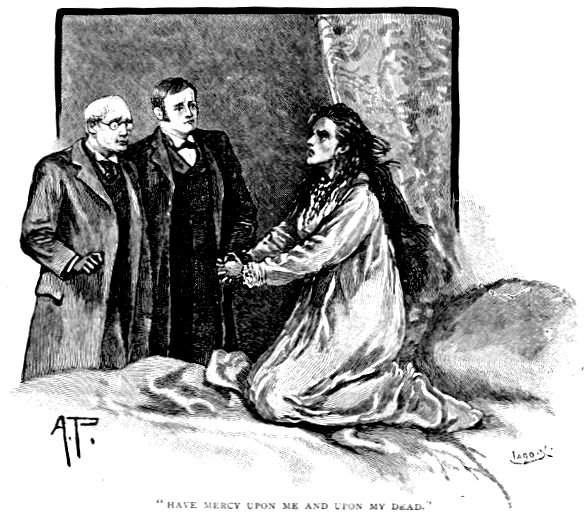
"HAVE MERCY UPON ME AND UPON MY DEAD."
The wretched woman's voice sank to a[Pg 263] hoarse whisper. She struggled on to her knees, and folding her hands, began to pray.
"God in Heaven have mercy upon me and upon my dead," she moaned. "Now, now, now! where's the screwdriver? Oh, heavens, it's lost, it's lost! We are undone! My God, what is the matter with me? My brain reels. Oh, my God, my God!"
She moaned tearfully. We laid her back on the bed. Her mutterings became more rapid and indistinct. Presently she slept.
"She must not be left in this condition," said Mackenzie to me. "It would be very bad for Gabrielle to be with her mother now. And those young servants are not to be trusted. I will go and send in a nurse as soon as possible. Can you do me the inestimable favour of remaining here until a nurse arrives?"
"I was going to propose that I should, in any case, spend the night here," I replied.
"That is more than good of you," said the doctor.
"Not at all," I answered; "the case interests me extremely."
A moment or two later Mackenzie left the house. During his absence Mrs. Heathcote slept, and I sat and watched her. The fever raged very high—she muttered constantly in her terrible dreams, but said nothing coherent. I felt very anxious about her. She had evidently been subjected to a most frightful strain, and now all her nature was giving way. I dared not think what her words implied. My mission was at present to do what I could for her relief.
The nurse arrived about midnight. She was a sensible, middle-aged woman, very strong too, and evidently accustomed to fever patients. I gave her some directions, desired her to ring a certain bell if she required my assistance, and left the room. As I went slowly downstairs I noticed the moon had risen. The house was perfectly still—the sick woman's moans could not be heard beyond the distant wing of the house where she slept. As I went downstairs I remembered Gabrielle's story about the moonlit garden and her father's figure standing there. I felt a momentary curiosity to see what the garden was like, and, moving aside a blind, which concealed one of the lobby windows, looked out. I gave one hurried glance and started back. Was I, too, the victim of illusion? Standing in the garden was the tall figure of a man with folded arms. He was looking away from me, but the light fell on his face: it was cadaverous and ghastly white; his hat was off; he moved into a deep shadow. It was all done in an instant—he came and went like a flash.
I pursued my way softly downstairs. This man's appearance seemed exactly to coincide with Mackenzie's description of Heathcote: but was it possible, in any of the wonderful possibilities of this earth, that a man could rise from his coffin and walk the earth again?
Gabrielle was waiting for me in the cheerful drawing-room. A bright fire burned in the grate, there were candles on brackets, and one or two shaded lamps placed on small tables. On one table, a little larger than the rest, a white cloth was spread. It also contained a tray with glasses, some claret and sherry in decanters, and a plate of sandwiches.
"You must be tired," said Gabrielle. "Please have a glass of wine, and please eat something. I know those sandwiches are good—I made them myself."
She pressed me to eat and drink. In truth, I needed refreshment. The scene in the sick room had told even on my iron nerves, and the sight from the lobby window had almost taken my breath away.
Gabrielle attended on me as if she were my daughter. I was touched by her solicitude, and by the really noble way in which she tried to put self out of sight. At last she said, in a voice which shook with emotion:—
"I know, Dr. Halifax, that you think badly of mother."
"Your mother is very ill indeed," I answered.
"It is good of you to come and help her. You are a great doctor, are you not?"
I smiled at the child's question.
"I want you to tell me something about the beginning of your mother's illness," I said, after a pause. "When I saw her two days ago, she scarcely considered herself ill at all—in fact, you were supposed to be the patient."
Gabrielle dropped into the nearest chair.
"There is a mystery somewhere," she said, "but I cannot make it out. When I came back, after seeing you to-day, mother seemed very restless and troubled. I thought she would have questioned me about being so long away, and ask me at least what I had done with myself. Instead of that, she asked me to tread softly. She said she had such an intolerable headache that she could not endure the least sound. I saw she had been out, for she had her walking boots on, and they were covered with mud. I tried to coax her to eat something, but she would not, and as I saw she really wished to be alone, I left her.
"At tea time, our parlour-maid, Peters, told me that mother had gone to bed and had given directions that she was on no account to be disturbed. I had tea alone, and then came in here and made the place as bright and comfortable as I could. Once or twice before, since my father's death, mother has suffered from acute headaches, and has gone to bed; but when they got better, she has dressed and come downstairs again. I thought she might like to do so to-night, and that she would be pleased to see a bright room and everything cheerful about her.
"I got a story-book and tried to read, but my thoughts were with mother, and I felt dreadfully puzzled and anxious. The time seemed very long too, and I heartily wished that the night were over. I went upstairs about eight o'clock, and listened outside mother's door. She was moaning and talking to herself. It seemed to me that she was saying dreadful things. I quite shuddered as I listened. I knocked at the door, but there was no answer. Then I turned the handle and tried to enter, but the door was locked. I went downstairs again, and Peters came to ask me if I would like supper. She was still in the room, and I had not made up my mind whether I could eat anything or not, when I heard her give a short scream, and turning round, I saw mother standing in the room in her nightdress. She had the carving-knife in her hand.
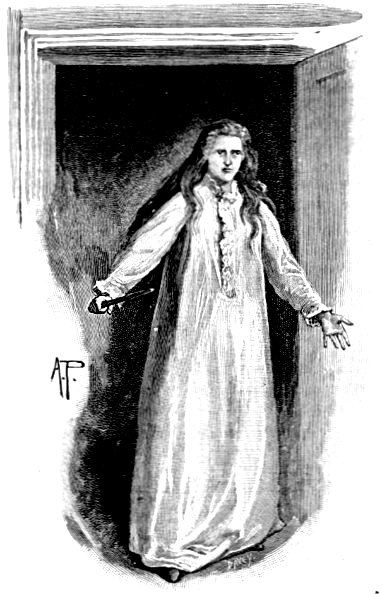
"IS THERE ANY BLOOD ON MY HANDS?"
"'Gabrielle,' she said, in a quiet voice, but with an awful look in her eyes, 'I want you to tell me the truth. Is there any blood on my hands?'
"'No, no, mother,' I answered.
"She gave a deep sigh, and looked at them as if she were Lady Macbeth.
"'Gabrielle,' she said again, 'I can't live any longer without your father. I have made this knife sharp, and it won't take long.'
"Then she turned and left the room. Peters ran for cook, and they went upstairs after her, and I rushed for Dr. Mackenzie."
"It was a fearful ordeal for you," I said, "and you behaved very bravely; but you must not think too much about your mother's condition, nor about any words which she happened to say. She is highly feverish at present, and is not accountable for her actions. Sit down now, please, and take a glass of wine yourself."
"No, thank you—I never take wine."
"I'm glad to hear you say so, for in that case a glass of this good claret will do wonders for you. Here, I'm going to pour one out—now drink it off at once."
She obeyed me with a patient sort of smile. She was very pale, but the wine brought some colour into her cheeks.
"I am interested in your story," I said, after a pause. "Particularly in what you told me about your poor father. He must have been an interesting man, for you to treasure his memory so deeply. Do you mind describing him to me?"
She flushed up when I spoke. I saw that tears were very near her eyes, and she bit her lips to keep back emotion.
"My father was like no one else," she said. "It is impossible for me to make a picture of him for one who has not seen him."
"But you can at least tell me if he were tall or short, dark or fair, old or young?"
"No, I can't," she said, after another pause. "He was just father. When you love your father, he has a kind of eternal youth to you, and you don't discriminate his features. If you are his only child,[Pg 265] his is just the one face in all the world to you. I find it impossible to describe the face, although it fills my mind's eye, waking and sleeping. But, stay, I have a picture of him. I don't show it to many, but you shall see it."
She rushed out of the room, returning in a moment with a morocco case. She opened it, and brought over a candle at the same time so that the light should fall on the picture within. It represented a tall, slight man, with deep-set eyes and a very thin face. The eyes were somewhat piercing in their glance; the lips were closely set and firm; the chin was cleft. The face showed determination. I gave it a quick glance, and, closing the case, returned it to Gabrielle.
The face was the face of the man I had seen in the garden.
My patient passed a dreadful night. She was no better the next morning. Her temperature was rather higher, her pulse quicker, her respiration more hurried. Her ravings had now become almost incoherent. Mackenzie and I had an anxious consultation over her. When he left the house I accompanied him.
"I am going to make a strange request of you," I said. "I wish for your assistance, and am sure you will not refuse to give it to me. In short, I want to take immediate steps to have Heathcote's coffin opened."
I am quite sure Mackenzie thought that I was mad. He looked at me, opened his lips as if to speak, but then waited to hear my next words.
"I want to have Heathcote's body exhumed," I said. "If you will listen to me, I will tell you why."
I then gave him a graphic account of the man I had seen in the garden.
"There is foul play somewhere," I said, in conclusion. "I have been dragged into this thing almost against my will, and now I am determined to see it through."
Mackenzie flung up his hands.
"I don't pretend to doubt your wisdom," he said; "but to ask me gravely to assist you to exhume the body of a man who died of consumption six months ago, is enough to take my breath away. What reason can you possibly give to the authorities for such an action?"
"That I have strong grounds for believing that the death never took place at all," I replied. "Now, will you co-operate with me in this matter, or not?"
"Oh, of course, I'll co-operate with you," he answered. "But I don't pretend to say that I like the business."
We walked together to his house, talking over the necessary steps which must be taken to get an order for exhumation. Mackenzie promised to telegraph to me as soon as ever this was obtained, and I was obliged to hurry off to attend to my own duties. As I was stepping into my hansom I turned to ask the doctor one more question.
"Have you any reason to suppose that Heathcote was heavily insured?" I asked.
"No, I don't know anything about it," he answered.
"You are quite sure there were no money troubles anywhere?"
"I do not know of any; but that fact amounts to nothing, for I was not really intimate with the family, and, as I said yesterday evening, never entered the house until last night from the day of the funeral. I have never heard of money troubles; but, of course, they might have existed."
"As soon as ever I hear from you, I will make an arrangement to meet you at Kensal Green," I replied, and then I jumped into the hansom and drove away.
In the course of the day I got a telegram acquainting me with Mrs. Heathcote's condition. It still remained absolutely unchanged, and there was, in Mackenzie's opinion, no necessity for me to pay her another visit. Early the next morning, the required order came from the coroner. Mackenzie wired to apprise me of the fact, and I telegraphed back, making an appointment to meet him at Kensal Green on the following morning.
I shall not soon forget that day. It was one of those blustering and intensely cold days which come oftener in March than any other time of the year. The cemetery looked as dismal as such a place would on the occasion. The few wreaths of flowers which were scattered here and there on newly-made graves were sodden and deprived of all their frail beauty. The wind blew in great gusts, which were about every ten minutes accompanied by showers of sleet. There was a hollow moaning noise distinctly audible in the intervals of the storm.
I found, on my arrival, that Mackenzie was there before me. He was accompanied by one of the coroner's men and a police-constable. Two men who worked in the cemetery also came forward to assist. No one expressed the least surprise at our strange errand. Around Mackenzie's lips, alone, I read an expression of disapproval.
Kensal Green is one of the oldest cemeteries which surround our vast Metropolis,[Pg 266] and the Heathcotes' burying-place was quite in the oldest portion of this God's acre. It was one of the hideous, ancient, rapidly-going-out-of-date vaults. A huge brick erection was placed over it, at one side of which was the door of entrance.
The earth was removed, the door of the vault opened, and some of the men went down the steps, one of them holding a torch, in order to identify the coffin. In a couple of minutes' time it was borne into the light of day. When I saw it I remembered poor Mrs. Heathcote's wild ravings.
"A good, strong oak coffin, which wears well," she had exclaimed.
Mackenzie and I, accompanied by the police-constable and the coroner's man, followed the bearers of the coffin to the mortuary.
As we were going there, I turned to ask Mackenzie how his patient was.
He shook his head as he answered me.
"I fear the worst," he replied. "Mrs. Heathcote is very ill indeed. The fever rages high and is like a consuming fire. Her temperature was a hundred and five this morning."
"I should recommend packing her in sheets wrung out of cold water," I answered. "Poor woman!—how do you account for this sudden illness, Mackenzie?"
He shrugged his shoulders.
"Shock of some sort," he answered. Then he continued: "If she really knew of this day's work, it would kill her off pretty quickly. Poor soul," he added, "I hope it may never reach her ears."
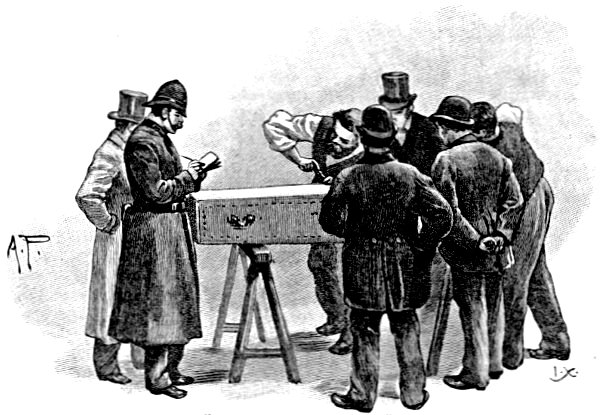
"THEY UNSCREWED THE LID."
We had now reached the mortuary. The men who had borne the coffin on their shoulders lowered it on to a pair of trestles. They then took turn-screws out of their pockets, and in a business-like and callous manner unscrewed the lid. After doing this they left the mortuary, closing the door behind them.
The moment we found ourselves alone, I said a word to the police-constable, and then going quickly up to the coffin, lifted the lid. Under ordinary circumstances, such a proceeding would be followed by appalling results, which need not here be described. Mackenzie, whose face was very white, stood near me. I looked at him for a moment, and then flung aside the pall which was meant to conceal the face of the dead.
The dead truly! Here was death, which had never, in any sense, known life like ours. Mackenzie uttered a loud exclamation. The constable and the coroner's man came close. I lifted a bag of flour out of the coffin!
There were many similar bags there. It had been closely packed, and evidently with a view to counterfeit the exact weight of the dead man.
Poor Mackenzie was absolutely speechless. The coroner's man began to take copious notes; the police-constable gravely did the same.
Mackenzie at last found his tongue.
"I never felt more stunned in my life," he said. "In very truth, I all but saw the man die. Where is he? In the name of Heaven, what has become of him? This is the most monstrous thing I have ever heard of in the whole course of my life, and—and I attended the funeral of those bags of flour! No wonder that woman never cared to see me inside the house again. But what puzzles me," he continued, "is the motive—what can the motive be?"
"Perhaps one of the insurance companies can tell us that," said the police-officer. "It is my duty to report this thing, sir," he con[Pg 267]tinued, turning to me. "I have not the least doubt that the Crown will prosecute."
"I cannot at all prevent your taking what steps you think proper," I replied, "only pray understand that the poor lady who is the principal perpetrator in this fraud lies at the present moment at death's door."
"We must get the man himself," murmured the police-officer. "If he is alive we shall soon find him."
Half an hour later, Mackenzie and I had left the dismal cemetery.
I had to hurry back to Harley Street to attend to some important duties, but I arranged to meet Mackenzie that evening at the Heathcotes' house. I need not say that my thoughts were much occupied with Mrs. Heathcote and her miserable story. What a life that wretched Heathcote must have led during the last six months. No wonder he looked cadaverous as the moonlight fell over his gaunt figure. No ghost truly was he, but a man of like flesh and blood to ourselves—a man who was supposed to be buried in Kensal Green, but who yet walked the earth.
It was about eight o'clock when I reached the Heathcotes' house. Mackenzie had already arrived—he came into the hall to meet me.
"Where is Miss Gabrielle?" I asked at once.
"Poor child," he replied; "I have begged of her to stay in her room. She knows nothing of what took place this morning, but is in a terrible state of grief about her mother. That unfortunate woman's hours are numbered. She is sinking fast. Will you come to her at once, Halifax—she has asked for you several times."
Accompanied by Mackenzie, I mounted the stairs and entered the sick room. One glance at the patient's face showed me all too plainly that I was in the chamber of death. Mrs. Heathcote lay perfectly motionless. Her bright hair, still the hair of quite a young woman, was flung back over the pillow. Her pale face was wet with perspiration. Her eyes, solemn, dark, and awful in expression, turned and fixed themselves on me as I approached the bedside. Something like the ghost of a smile quivered round her lips. She made an effort to stretch out a shadowy hand to grasp mine.
"Don't stir," I said to her. "Perhaps you want to say something? I will stoop down to listen to you. I have very good hearing, so you can speak as low as you please."
She smiled again with a sort of pleasure at my understanding her.
"I have something to confess," she said, in a hollow whisper. "Send the nurse and—and Dr. Mackenzie out of the room."
I was obliged to explain the dying woman's wishes to my brother physician. He called to the nurse to follow him, and they immediately left the room.
As soon as they had done so, I bent my head and took one of Mrs. Heathcote's hands in mine.
"Now," I said, "take comfort—God can forgive sin. You have sinned?"
"Oh, yes, yes; but how can you possibly know?"
"Never mind. I am a good judge of character. If telling me will relieve your conscience, speak."
"My husband is alive," she murmured.
"Yes," I said, "I guessed as much."
"He had insured his life," she continued, "for—for about fifteen thousand pounds. The money was wanted to—to save us from dishonour. We managed to counterfeit—death."
She stopped, as if unable to proceed any further. "A week ago," she continued, "I—I saw the man who is supposed to be dead. He is really dying now. The strain of knowing that I could do nothing for him—nothing to comfort his last moments—was too horrible. I felt that I could not live without him. On the day of my illness I took—poison, a preparation of Indian hemp. I meant to kill myself. I did not know that my object would be effected in so terrible a manner."
Here she looked towards the door. A great change came over her face. Her eyes shone with sudden brightness. A look of awful joy filled them. She made a frantic effort to raise herself in bed.
I followed the direction of her eyes, and then, indeed, a startled exclamation passed my lips.
Gabrielle, with her cheeks crimson, her lips tremulous, her hair tossed wildly about her head and shoulders, was advancing into the room, leading a cadaverous, ghastly-looking man by the hand. In other words, Heathcote himself in the flesh had come into his wife's dying chamber.
"Oh, Horace!" she exclaimed; "Horace—to die in your arms—to know that you will soon join me. This is too much bliss—this is too great joy!"
The man knelt by her, put his dying arms round her, and she laid her head on his worn breast.
"We will leave them together," I said to Gabrielle.
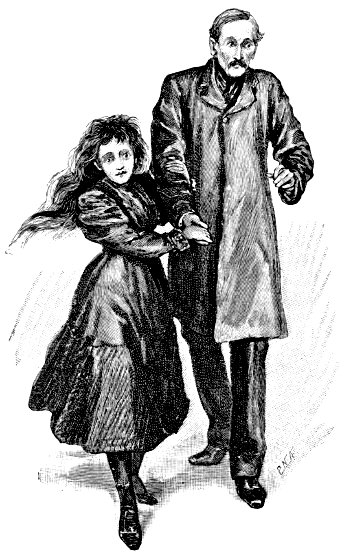
"LEADING A CADAVEROUS, GHASTLY-LOOKING MAN BY THE HAND."
I took the poor little girl's hand and led her from the room.
She was in a frantic state of excitement.
"I said he was not dead," she repeated—"I always said it. I was sitting by my window a few minutes ago, and I saw him in the garden. This time I was determined that he should not escape me. I rushed downstairs. He knew nothing until he saw me at his side. I caught his hand in mine. It was hot and thin. It was like a skeleton's hand—only it burned with living fire. 'Mother is dying—come to her at once,' I said to him, and then I brought him into the house."
"You did well—you acted very bravely," I replied to her.
I took her away to a distant part of the house.
An hour later, Mrs. Heathcote died. I was not with her when she breathed her last. My one object now was to do what I could for poor little Gabrielle. In consequence, therefore, I made arrangements to have an interview with Heathcote. It was no longer possible for the wretched man to remain in hiding. His own hours were plainly numbered, and it was more than evident that he had only anticipated his real death by some months.
I saw him the next day, and he told me in a few brief words the story of his supposed death and burial.
"I am being severely punished now," he said, "for the one great sin of my life. I am a solicitor by profession, and when a young man was tempted to appropriate some trust funds—hoping, like many another has done before me, to replace the money before the loss was discovered. I married, and had a happy home. My wife and I were devotedly attached to each other. I was not strong, and more than one physician told me that I was threatened with a serious pulmonary affection. About eight months ago, the blow which I never looked for fell. I need not enter into particulars. Suffice it to say that I was expected to deliver over twelve thousand pounds, the amount of certain trusts committed to me, to their rightful owners within three months' time. If I failed to realize this money, imprisonment, dishonour, ruin, would be mine. My wife and child would also be reduced to beggary. I had effected an insurance on my life for fifteen thousand pounds. If this sum could be realized, it would cover the deficit in the trust, and also leave a small overplus for the use of my wife and daughter. I knew that my days were practically numbered, and it did not strike me as a particularly heinous crime to forestall my death by a few months. I talked the matter over with my wife, and at last got her to consent to help me. We managed everything cleverly, and not a soul suspected the fraud which was practised on the world. Our old servants, who had lived with us for years, were sent away on a holiday. We had no servant in the house except a charwoman, who came in for a certain number of hours daily."
"You managed your supposed dying condition with great skill," I answered. "That hemorrhage, the ghastly expression of your face, were sufficiently real to deceive even a keen and clever man like Mackenzie."
Heathcote smiled grimly.
"After all," he said, "the fraud was simple enough. I took an emetic, which I knew would produce the cadaverous hue of approaching death, and the supposed hemorrhage was managed with some bullock's blood. I got it from a distant butcher, telling him that I wanted it to mix with meal to feed my dogs with."
"And how did you deceive the undertaker's men?" I asked.
"My wife insisted on keeping my face covered, and I managed to simulate rigidity. As to the necessary coldness, I was cold enough lying with only a sheet over me. After I was placed in the coffin my wife would not allow anyone to enter the room but herself: she brought me food, of course. We bored holes, too, in the coffin lid. Still, I shall never forget the awful five minutes during which I was screwed down.
"It was all managed with great expedition. As soon as ever the undertaker's men could be got out of the way, my wife unscrewed the coffin and released me. We then filled it with bags of flour, which we had already secured and hidden for the purpose. My supposed funeral took place with due honours. I left the house that night, intending to ship to America. Had I done this, the appalling consequences which have now ended in the death of my wife might never have taken place, but, at the eleventh hour, my courage failed me. I could do much to shield my wife and child, but I could not endure the thought of never seeing them again. Contrary to all my wife's entreaties, I insisted on coming into the garden, for the selfish pleasure of catching even a glimpse of Gabrielle's little figure, as she moved about her bedroom. She saw me once, but I escaped through the shrubbery and by a door which we kept on purpose unlocked, before she reached me. I thought I would never again transgress, but once more the temptation assailed me, and I was not proof against it. My health failed rapidly. I was really dying, and on the morning when my wife's illness began, had suffered from a genuine and very sharp attack of hemorrhage. She found me in the wretched lodging where I was hiding in a state of complete misery, and almost destitution. Something in my appearance seemed suddenly to make her lose all self-control.
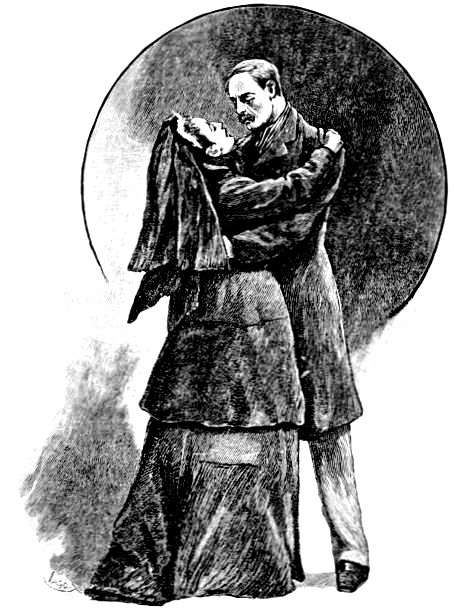
"WHEN YOU DIE, I WILL DIE."
"'Horace,' she exclaimed, 'I cannot stand this. When you die, I will die. We will carry our shame and our sorrow and our unhappy love into the grave, where no man can follow us. When you die, I will die. Oh, to see you like this drives me mad!'
"She left me. She told me when I saw her during those last few moments yesterday, that she had hastened her end by a powerful dose of Indian hemp. That is the story. I know that I have laid myself open to criminal prosecution of the gravest character, but I do not think I shall live to go through it."
Heathcote was right. He passed away that evening quite quietly in his sleep.
Poor little Gabrielle! I saw her once since her parents' death, but it is now a couple of years since I have heard anything about her. Will she ever get over the severe shock to which she was subjected? What does the future hold in store for her? I cannot answer these questions. Time alone can do that.
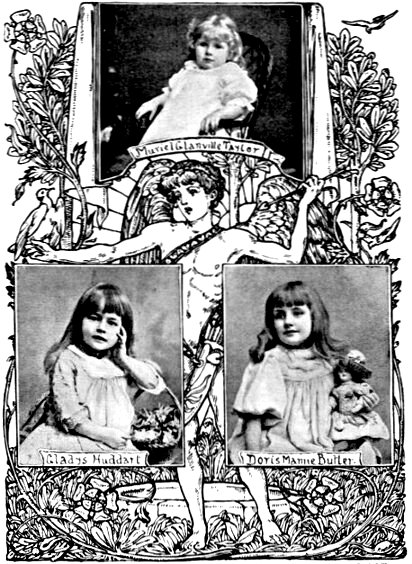
From a Photo. by A. W. Cox, Nottingham.
Muriel Glanville Taylor
Gladys Huddart Doris Mamie Butler
From a Photo. by C. Vandyk, 125, Gloucester Road, S. W.
From a Photo. by C. Vandyk, 125, Gloucester Road, S. W.
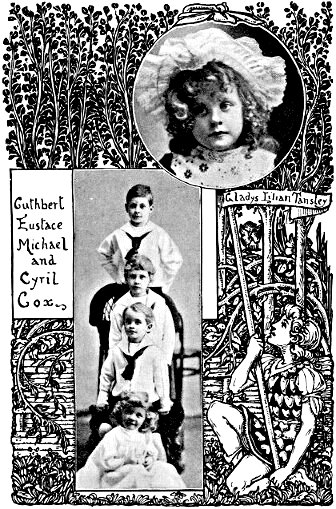
From a Photo. By Arthur Neale, Nottingham.
Gladys Lilian Tansley
Cuthbert
Eustace
Michael
and
Cyril
Cox.
From a Photo. by Vickery Bros., Barnstaple.
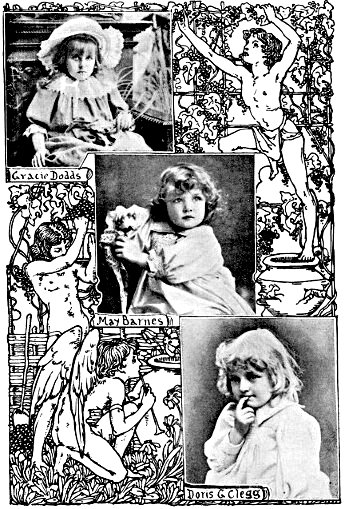
From a Photo. by J. Bacon, Newcastle-on-Tyne.
Gracie Dodds
May Barnes
Doris G Clegg
From a Photo. by Bullingham, South Kensington, S. W.
From a Photo. by Vandyck, Melbourne.
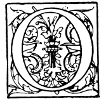
Of all the more hazardous—though thoroughly romantic—professions, none is more interesting than that of burgling. The art of burgling and housebreaking has positively developed into a fine art, and, although we do not admire the members of the craft, yet every individual representative of it is undeniably interesting. There is something irresistibly tantalizing, yet at the same time fascinating, about your average burglar. Those of nervous temperament may look under their beds for a whole twelvemonth—from the 1st of January to the 31st of December. But he is never there. He is a playful fellow—a merry man; he likes his joke, for on the very night you forget to peep under the couch where Morpheus receives you for a few hours, he is bound to be there, and the next morning you find all your drawers ransacked. At first you put it down to the dog, but when you discover that something like a cart-load of valuables has disappeared, you come to the conclusion that no representative of the canine world who ever barked or picked an honest bone could possibly help himself so freely and with so liberal a hand.
The New Scotland Yard Museum will provide much practical information on the ways and means which our friend the enemy utilizes for the purpose of thus annoying you. Your enterprising burglar shall have what he thoroughly deserves—a complete chapter to himself, and illustrated with his own weapons of warfare into the bargain. Not that we expect that he will be much gratified at the publicity here given to his methods—a publicity which is all to the advantage of his enemy, the householder, for whom to be forewarned is to be forearmed.
Our burglar friends may find a grain of comfort in this fact—that we frankly acknowledge that it is impossible for us to give them as much space in these pages as their unquestionable genius deserves. They are really too inventive—too enterprising. Still, the exhibits in the museum will be of considerable help. The exhibits here comprise samples of probably every tool used in the pursuit of this profession. It has always been an open question as to where burglars and housebreakers obtain their tools. Some three or four years ago it was stated at the Dalston Police Court that one man makes all the burglars' "jemmies" in London, and further that the police knew the man well, were on familiar terms with his own particular trade, but there was positively no law by which he could be arrested or stopped.
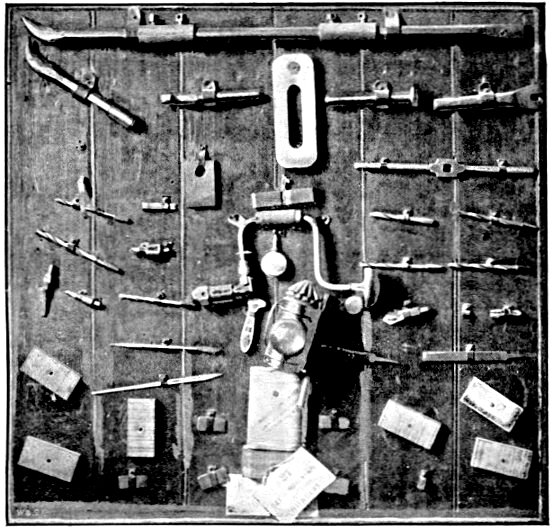
SAFE-BREAKER'S OUTFIT.
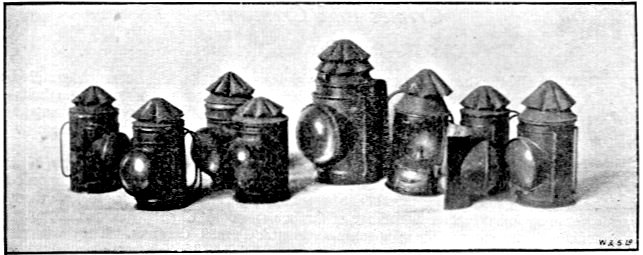
BURGLARS' LANTERNS.
Again, a burglar—who was the terror of Birmingham for many years, and who had done fourteen years' penal servitude for burglary and attempted murder—was of the decided opinion that more tools were manufactured in Birmingham than in any town in the country, while the greatest "authority" on burglars' tools in general, and "jemmies" in particular, was the famous American bank burglar, Adams, whose instruments were treasured and preserved at the New York police headquarters. It is probable, however, that most instruments are home-made, or manufactured by an honest—in a strictly burglarian sense—blacksmith.
The first object of housebreaking curiosity you meet with at the New Scotland Yard Black Museum is a complete safe-breaker's outfit, collected at different times by Superintendent Shore, and most artistically set out on a board covered with red baize. The dark lantern is in the centre, the steel jemmy surmounts the whole, running in a symmetrically decorative line along the top, and amongst the various items one notices the prising instrument, steel wedges, wood used for obtaining leverage, delicately constructed saws, files, and a box of Graduated Schultz powder, the latter explosive being used for blowing in a lock when the place where the safe is situated is left totally unattended, and there is no fear of the explosion acting as an alarum.
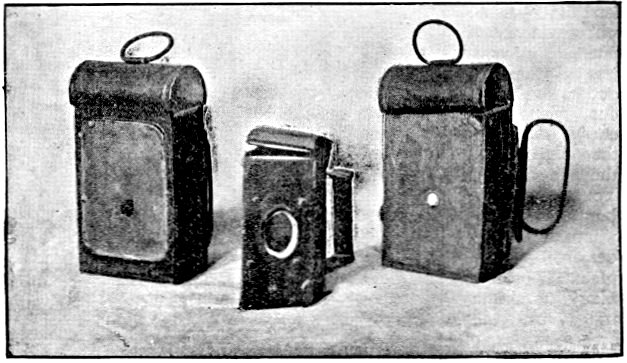
KEY-HOLE LANTERNS.
Burglars' lanterns vary in size—they are known as "darkeys" in the profession—the better class of lantern now in use being of the police pattern; a trifle bulky, perhaps, but nevertheless being very reliable, seeing that they are similar to those of Government make. The group of lanterns at the museum may have cost anything between fourpence and a shilling each, certainly no more. Their owners invariably carry them away, unless disturbed, when they are left behind as a legacy. The police seldom attach any importance to the finding of a lantern. Yet one or two of them are ingeniously made. Here is one made out of a Bryant and May's match-box. A handle has been put on to the box proper and[Pg 275] a space made for the light to come through, so as to be easily covered with the thumb. Such a lantern as this would be used when using a small jemmy. Its companions have a light-hole even smaller still. They are ordinary lanterns with the glass taken out, a piece of tin inserted, and a hole made only just of sufficient size to allow enough light to pick a key-hole. Perhaps, however, the most ingenious of them all is a small bottle containing a tiny piece of phosphorus. Our friend—once the owner of this highly interesting relic—merely had to "shake the bottle," when, lo and behold! he had all the light he needed on that very useful subject for operating upon—the key-hole.
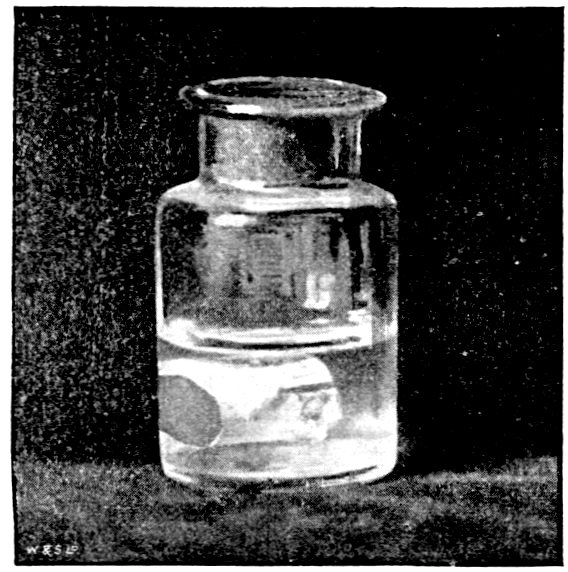
A PHOSPHORUS LANTERN.
There is one other method of gaining light. This is by means of a piece of wax candle stuck in a square bit of yellow soap.
Perhaps the jemmy is the most popular burglar's tool with which the public are on disagreeably familiar terms. They can supply you with any size at New Scotland Yard. Here you have a pretty little group of eight large "jemmies"—all of which are used for safe-breaking purposes. They are all made of the best steel. This extra long one—it measures 3ft.—is called "The Lord Mayor," whilst its two next sized ones are dubbed "The Alderman" and "Common Councilman." It is a significant fact, which has never been satisfactorily explained, that the members of the fraternity of which we are now treating go to the City for names for their jemmies. Possibly some of them may have uncomfortable recollections of the Mansion House, and thus take revenge on the Lord Mayor and his colleagues by using them—in the shape of jemmies—for burglarious purposes!
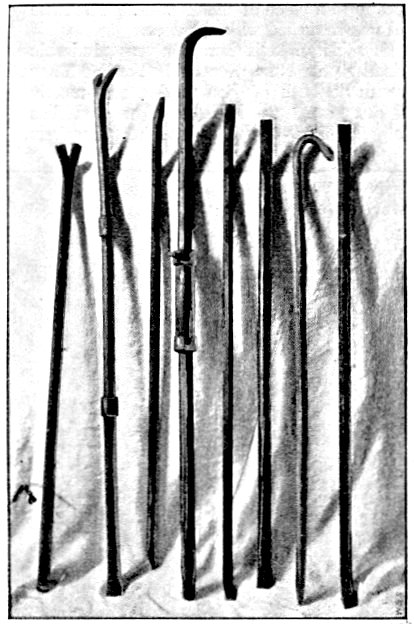
EIGHT LARGE JEMMIES
The smaller jemmies are for housebreaking. One of these—made out of an old file—is robed in a cloth case; another unscrews in the centre, so as to be more readily carried. Another is a packing-case opener, such as is used in Covent Garden every day for prising open boxes of fruit. Many are the ways adopted for carrying these. It is generally believed by the authorities that in the conveying of burglars' tools cabmen are often in league with the offending parties. A cabman going through the streets at night can jog along unnoticed, especially if a lady and gentleman in evening dress are inside.
There is a record at New Scotland Yard of a burglar stealing a four-wheeler from a rank and driving the cab himself, with a friend inside with the tools. Tools have been carried in hat-boxes, carpenters' baskets, and even in a silk hat on the head. Peace, the king of all burglars, frequently carried the implements of his craft in a violin case—but of this worthy more anon. The general rule is to carry jemmies down the leg of the[Pg 276] trousers or up the sleeve; whilst other tools are smuggled into long pockets of the "rabbit" pattern, such as used by the old-time poachers.
Perhaps the most remarkable place in which a burglar carried his tools was a euphonium! However, he succeeded in passing through the City as a "wait," and made a fairly good profit out of the night's proceedings. It is not on record whether the constable on point wished him "a merry Christmas" or not.
We are inclined to tell a story which we have every reason to believe to be perfectly true. It was told to the writer by a burglar. The burglar stated that in country "affairs" it is always deemed wise to hide the tools to be used somewhere near to the spot to be operated upon, and not to carry them about the person. He had hidden his tools in a hedge in the morning. When he arrived in the afternoon to get them—previous to setting out for the scene of the burglary—he found them gone. Whilst hunting around, he noticed some children romping about in an adjoining field. One little bright-eyed lassie saw him, and leaving her companions, ran up to him and said, in childlike way: "Please, sir, I've found this." "This" was the burglar's tools tied up in a piece of black cloth. The little girl was rewarded with sixpence.
Of skeleton keys there is a very admirable selection at New Scotland Yard. They are made both of iron and steel—mostly of scrap-iron, as it is tougher and has no grain in it. Burglars and housebreakers usually make their own skeleton keys—some of which are very rough. The key is bought in the block, and the wards are cut out as needed. Those shown are of two kinds. The bunch consists of "pick-locks," which are made of stout wire. A housebreaker has been caught with as many as thirty of these pick-locks in his possession. For larger locks, the keys are much stronger. This pretty little cloth case was found on a gentleman. These would be used for opening heavy doors. Of those shown it will be noticed that all save two are made with the wards to both ends. There can be no doubt as to the efficacy of skeleton keys, and lever locks are strongly recommended to the wise, as it would be impossible to open one with a "skeleton."
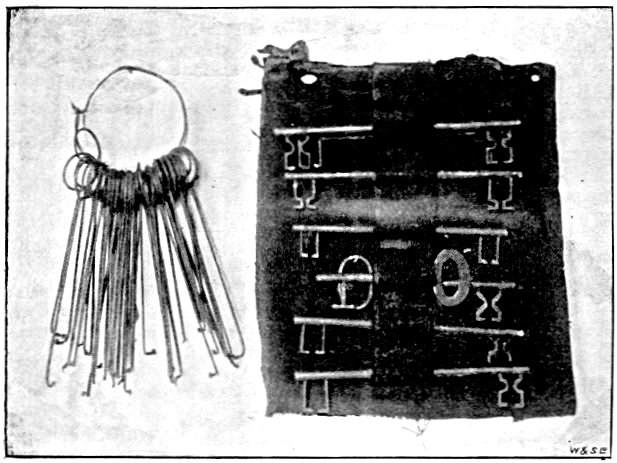
SKELETON KEYS.
We now come to the wedges—apparently very small, but incalculably important items in the particular branch of art with which we are now dealing. Wedges may be either of wood or steel, and are used for driving under doors whilst working in a room. They are usually held tight to the floor by a gimlet, so that if the housebreakers were disturbed and an attempt was made to open the door, the more the opposing party was to push outside, the tighter the door would be held. The only hope would be to force the door and the thieves in nine cases out of ten would have ample opportunity to get away.
You may find at Scotland Yard the mahogany leg of a parlour chair, with a number of wedges by its side, which tells a story of ingenuity as clever as anything of its kind ever conceived by any novelist. More than that, it reflects the greatest credit upon the skill of our detectives and police officials. These simple, harmless-looking little wedges were quite sufficient to get three men twenty years' penal servitude for burglary. It was in 1875. A number of burglaries were committed in a certain district in London. The almost invariably[Pg 277] careful perpetrators were foolish on these particular occasions, for they left their wedges behind them. These were, however, treasured by the police. When the men were eventually arrested, it was found that a chair at their lodgings was minus a leg, and when the wedges were pieced together—hey, presto! here was the mahogany leg! There are other exhibits at New Scotland Yard equally interesting—simple little items which tell a big story and carry with them heavy punishments. In a case is a group of articles comprising a number of bullets, a wooden wedge, a truncheon case—showing bullet marks—a soft black felt hat, and two chisels. Above the case is an enlarged photo of one of the chisels. They are relics of the murder of Police-constable Cole, on December 1, 1882, by Thomas Henry Orrocks. Orrocks left behind him, in a turning out of Dalston Lane, where the affray took place, the old hat, the wooden wedge, and the two chisels. He was suspected. The discovery was made that he had been practising with a revolver at Tottenham Marshes, and a bullet found in a tree there was identical with those found in the constable's truncheon case. But the most convincing evidence was the fact that when the chisels were photographed the word "Rock" was found scratched near the handle. It is a fact, not generally known, that photography can render visible what the eye is quite unable to discern. It was sufficient to hang Thomas Henry Orrocks.
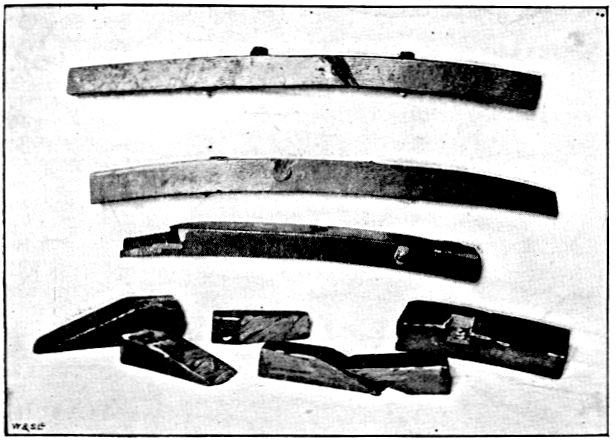
WEDGES MADE FROM CHAIR-LEG.
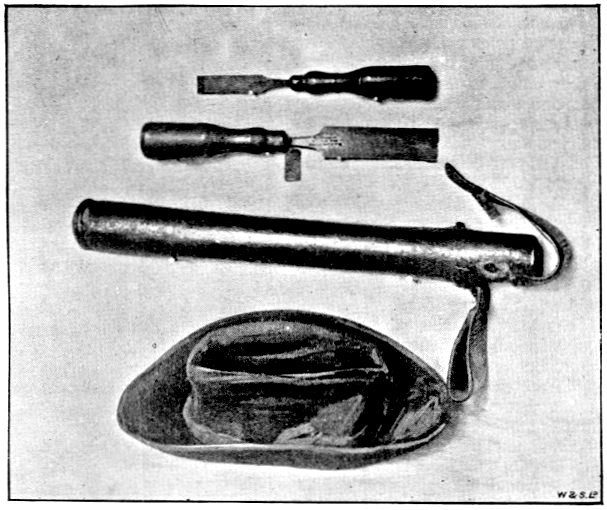
RELICS OF THE ORROCKS CASE.
Perhaps, however, the button incident is the prettiest of all. What a warning to burglars! The relics consist of an old black[Pg 278] overcoat with a broken bone button. The piece broken off is carefully preserved in a small wooden box. In January, 1874, a burglary was committed in the vicinity of Westminster. A little piece of freshly broken off bone button was foolishly left on the window-sill. This the police kindly and considerately took charge of. A man was suspected, but there was no evidence against him to justify an arrest. But an enterprising police-officer clung to that bit of button, and one night he chanced to come across a gentleman with a button that had a piece missing.
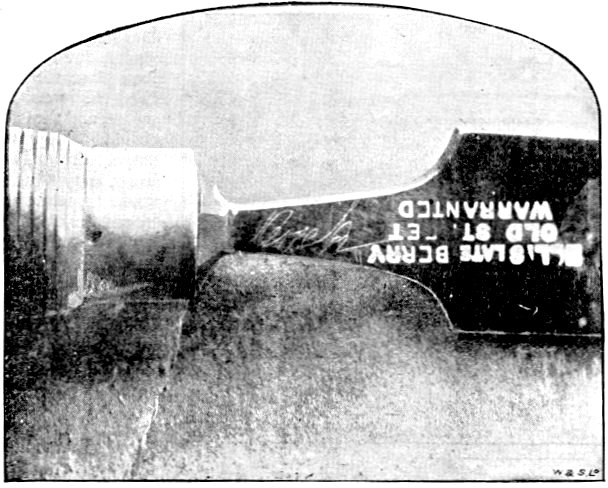
A CONVICTING CHISEL.
"Halloa!" he exclaimed, "button broken, eh?"
"Yes," replied the proprietor of the old black overcoat, "I've lost it. I don't know where it is."
"I know," said the calculating detective. "Here it is! Why, bless me, it just fits, my friend!"
Some of the stolen property was found in his pockets. The cap—we mean the button—fitted. He got three years!
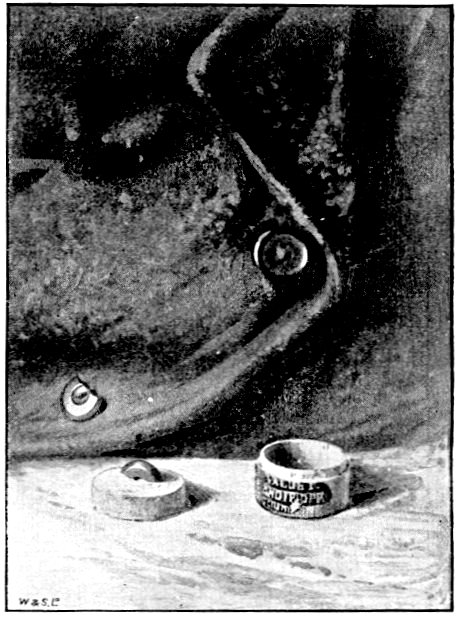
THE BROKEN BUTTON.
Amongst the miscellaneous exhibits at the New Yard is a piece of wood cut out of a stable door at Kensington. It is thick and bulky; would take ten minutes or a quarter of an hour to cut; and is a good example of the work done with the ordinary stock and centre-bit. It is of sufficient size to allow the hand and arm to go through comfortably, so that the bolt of the door may be drawn back. An artist's palette knife is by its side, which is used for opening window sashes. If your housebreaker found that he had to deal with a patent lock, he would cut the window pane, by placing brown paper over the glass and working over that, so that no noise is made. But it may be mentioned that this is rarely done[Pg 279] now, as an entrance is usually effected through the front door or trap-door in the roof. It is a long time since the police have had a case, however, where the panel of a door has been cut, as it would too readily betray the operation to the passer-by; the more familiar method adopted now is to work through an empty house, and so gain an entrance.
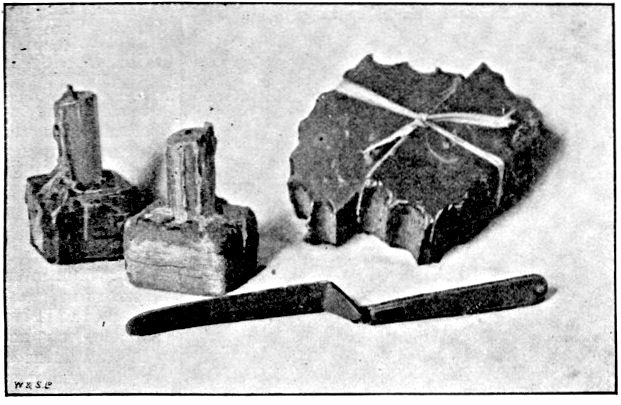
CANDLES, PIECE CUT OUT OF DOOR, AND PALETTE KNIFE.
An illustration is given of a lock of a safe cut away by a ratchet. It is an ordinary ratchet about 2ft. long. It is in reality a common workman's tool, and is used every day on palings in the streets. Such an article as this is bought in any ironmonger's shop. No up-to-date safe-breaker would ever think of using such a tool as this. The instrument for cutting through shutters is rather more ingenious. This is evidently a home-made tool. It is a steel-cutter, and can be made any size by moving the centre-bit. A knife is at each end, being kept in position by a long screw. A hole is made in the shutter first, the graduated screw is inserted, and, as this is driven in, so the knives cut their way. It is surmised that this shutter cutter was not found to answer the purpose for which it was intended, as it is the only one ever found by the police. The other specimen is for wooden shutters—the tridents being so made that whilst one cuts the other scoops out.
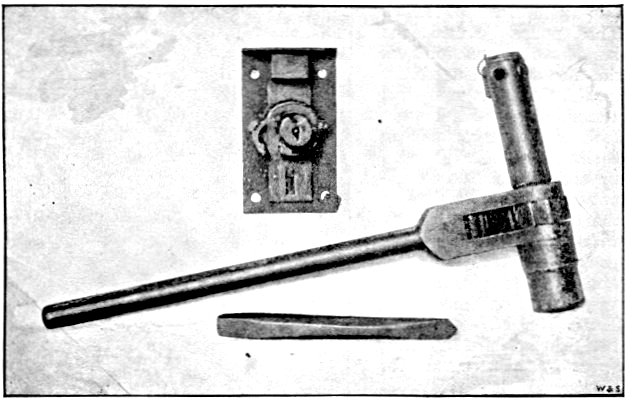
SAFE-LOCK CUT WITH RATCHET.
The collection of revolvers is unique in its way, and they are arranged about the walls of the museum with a decided eye to effect. They comprise weapons of every type and pattern. The two specially selected which appear above a very formidable dagger, evidently of Eastern manufacture—have their own peculiar history. The small one is the centre of attraction amongst a strange group of relics, consisting of a pair of links, the clasp of a purse, a little piece of steel which fitted inside a bracelet, and even a piece of a heel-tip. The heel-tip corresponded with the footprints of a suspected man, and, together with the remains of the trinkets, helped to bring a verdict of "Guilty." All these are associated with the Muswell Hill burglary in[Pg 280] January, 1889. The revolver was used by one of three men—who were all subsequently sentenced to penal servitude for life—for shooting at Mr. Atkins.
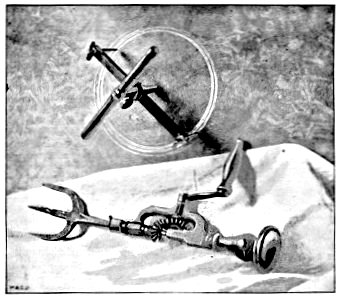
SHUTTER-CUTTER.
The larger revolver—which has an exceptionally heavy central fire—belonged to a top-hat shooter. On July 18th, 1884, a burglary was attempted at Hoxton. The police chased the burglars over the roofs of the houses, and a worthy named Wright, who had attempted to make himself look highly respectable in a silk hat, amused himself by clinging to a chimney-pot with one arm and using the other to practise firing with—the targets being the constables. Mr. Wright is not likely to play at this very risky pastime again. He is Her Majesty's guest for life in a palatial residence specially constructed for dispensing hospitality to such gentlemen.
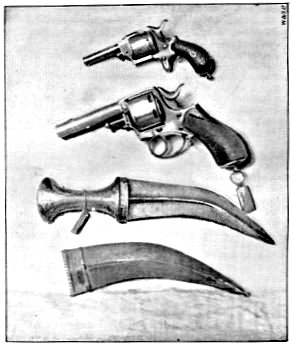
REVOLVERS AND DAGGER
The life-preservers are interesting. They hang in a delicious group just by the window. They are of all sorts and sizes. One swings on a piece of thick cord heavily loaded; another is made of rhinoceros hide. A pretty little invention in these specialities doubles up and fits the waistcoat pocket, the more popular example being made out of a piece of cord twisted round a short cane with a lead shot at both ends. The life-preservers have a[Pg 281] curious companion—a pair of coverings, very rudely made out of coarse linen, for the feet, which the burglar puts over his boots out of thoughtful consideration for the slumbers of his victims.
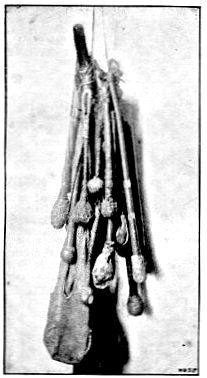
LIFE-PRESERVERS AND BOOT COVERS.
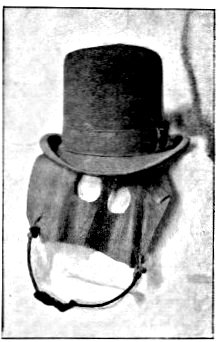
THE NEW NORTH ROAD MASK.
The disguises used—and treasured at New Scotland Yard—chiefly consist of false whiskers and beards. They are all made of dark crêpe hair and fastened to wires, which fit over the ear and keep them in position. The most original idea for concealing the face, however, is given a prominent place near the board on which are arranged the before-mentioned complete set of tools. It consists of a hard, black hat, attached to which is a piece of black American cloth with openings to give sight, cut very much to the size of old-fashioned goggles. This is fastened round the chin with a piece of cord.
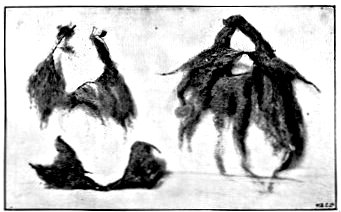
BEARDS, WHISKERS, ETC.
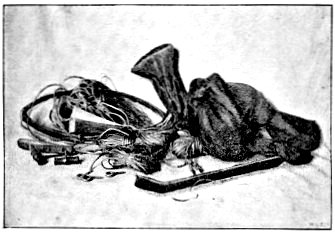
WIRE, STRING, JEMMY, SCREWS, WEDGES AND SOCKS OF PORTICO THIEVES.
Its wearer was a most unfortunate individual, and there is every reason to believe that he has the warm sympathy of all his brother professionals. He was "specially engaged" on a public-house in the New North Road after closing time. He was found under a bed, and hurried to get away, being most determinedly chased by the energetic landlord. The owner of the black billycock, fancying he saw a means of escape, made for a window. But his patent hat and face protector served him a shabby trick. The man only saw a window and not the iron bars, between a couple of which his head lodged as though specially designed for the purpose.

PEACE'S LADDER.
The landlord—who was fortunately blessed with a delightfully humorous disposition—prodded the "bar" lodger with a sword-stick. The poor prodded one assisted his captor by yelling for the police himself! Five years.
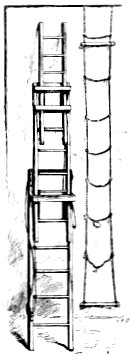
SLIDING LADDER AND ROPE LADDER.
We now come to the most artistic kind of burglar—the portico thief, the man who goes in for great things in the way of jewellery. There are many exhibits at the museum used in this special branch of burglary—rope ladders,[Pg 283] treadles, strings, coils of copper wire, gimlets, wedges, woollen stockings to go over boots, etc. The rope ladders, known as "slings," are often 25ft. and 30ft. long, and are made with rope treads just sufficient to put the foot in. A hook is at the end, which is lodged on some convenient support strong enough to hold the weight of the man ascending. They are generally carried by winding them about the body.
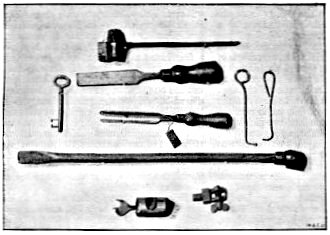
PEACE'S OUTFIT.
The wire, string, wedges, socks, etc., in the illustration were found at Ealing when the men escaped. They had "wired" the house and grounds all over. This is done in order that, if they are chased, the wires, which are placed at ankle height, trip the pursuer up, the thieves themselves knowing of their whereabouts by putting a piece of white paper in their immediate vicinity.
These are the simple appliances of your truly artistic burglar—the man who has been laying his plans for months, the individual who will pay a hundred visits to the house before he brings about his grand coup, who will know the value of every piece of jewellery the ladies are wearing at the dinner-table, and be fully aware of the exact place where to lay his wily fingers on them in the dressing-room.
This is the class of men who are the greatest trouble to the police—these are the best customers of the receivers. Frequently a man is employed to do all the planning and mapping out for the party who will do the actual job. For this he is paid a certain price or perhaps a commission on the results of the robbery. This person will draw up a plan of the house as true—though perhaps not quite as artistic—as any architect. But he gives the thief the very information he needs, and puts on the map of the house and grounds the exact position where the operator must "beware of the dog." A man named Connor is credited at New Scotland Yard with being one of the finest adepts at this particular work of all which have come under their notice. He used to lecture on this peculiar art to young thieves, and whilst in prison wrote a work giving them practical advice on the subject. The prison officials allowed him to finish his literary effort, and when his time expired coolly appropriated the same.
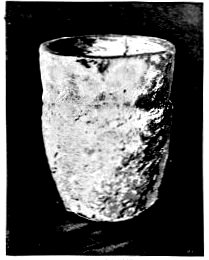
PEACE'S CRUCIBLE.
No article dealing even in a small way with "Burglars and[Pg 284] Burgling" would be complete without some reference to "The King," and the relics of this talented individual are of a highly interesting character. Charles Peace thoroughly deserved to be crowned king of all burglars, housebreakers, and scoundrels in general. Peace always worked single-handed. He had no "receiver," and melted down all his own stuff and sold it as a matter of business. All his stock-in-trade is to be found at the museum. His tools are only ten in number, and comprise a skeleton key, two pick-locks, a centre-bit, a large gimlet, a gouge, a chisel, a small vice (for turning keys on the outside of doors—used when people leave the key in the lock), a jemmy (about 2ft. long), and a knife. With these Peace worked. His blue spectacles and case are not missing. These he used for purposes of disguise, though when arrested at Blackheath his face was stained with walnut-juice, in the hopes of passing off as a Mulatto.
His ladder was quite a unique arrangement. When doubled up it is to all outward appearances simply a bundle of blocks of wood such as any carpenter might carry home for firewood. But it opens out to a length of some 13ft., working on a bolt, with a hole at one end to hook on to a nail in the wall, and so complete facilities were afforded for climbing to window or veranda. In addition to his tools he called into requisition a pony and trap at night. He practically killed the pony with hard work.
The crucible in which he did his melting down is of clay, and was found at Peckham. Its interior is much scorched. It is about 6in. deep inside, and the diameter of the orifice is 4in. Peace was truly magnificent in all he undertook—in his own peculiar profession he positively arose to greatness. In the midst of his burglaries he kept up a fine house at Peckham, with two housekeepers and a servant. His drawing-room suite was worth sixty guineas, a Turkey carpet was laid on the floor, gilded mirrors decorated the walls, and on the grand piano was a beautifully inlaid Spanish guitar worth some thirty guineas. He lived the life of an independent gentleman. He was passionately fond of music, and on the night of the attempted robbery at Blackheath he had an at-home concert, and whilst one housekeeper played the piano and another sang, Charles joined in with the violin.
His audacity was such that at the time his name was on everybody's lips, and Scotland Yard was full of him, he visited the Yard disguised as a clergyman and asked a number of questions about himself!
His false arm was a unique idea. He was minus the fore-finger of the left hand, and after he left Sheffield on 29th November, 1876, his description was posted at every police-station in the country. So he made himself this arm which he placed in his sleeve, hanging his violin on the hook when engaged in walking about and taking stock of "crackable" residences, and screwing in a fork in the place of the hook for use at meals. So for something like two years the irrepressible Peace walked this earth short of a hand, whilst the police were looking for a man short of a finger!
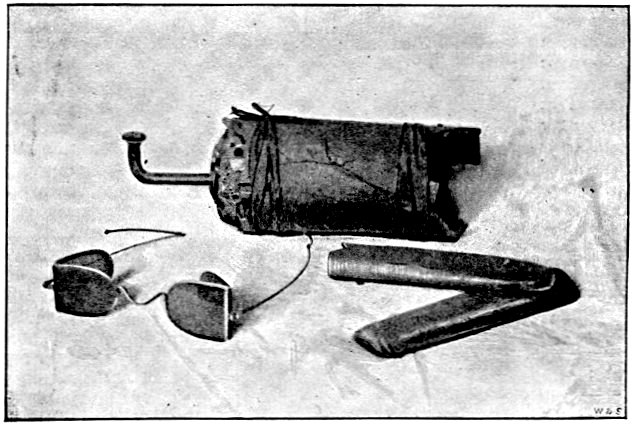
PEACE'S SPECTACLES AND DUMMY ARM.
By G. H. Lees
[The following is an absolutely true narrative of actual facts, and was written down from Mr. Lees' dictation, the loss of both his hands, of course, precluding him from writing.]

On Christmas morning, 1886, I started about ten o'clock from Indian Head, Manitoba, Canada, with Her Majesty's mail, to travel forty miles. It was a very cold morning, and blowing 30° below zero. I had been on my journey about an hour, when I began to feel very sleepy, through the intense cold, and so got out to walk for a time. The storm increased so that I could not see twenty yards before me, but I still kept the trail till something happened to the harness. I threw my gloves into the sleigh while I put it right, hanging the reins on the front board.
When I went back to get in, the ponies bolted, leaving me without gloves. I ran some distance, when the cold seemed to make me faint; I lay down an hour before I could recover myself sufficiently to start again; when I did, both hands were frozen stiff.
The blizzard cleared, and when I had thawed my eyes (which were frozen up with the drifting snow) I could see a shanty about a mile off the trail. I started to it, but bad luck attended me. When I reached it, it was uninhabited, and my hands were so frozen that I could not move a finger to get in, so sat down in a shed to consider what would be best to do.
Feeling perished as my feet began to freeze, I was obliged to walk on. I saw another place I knew across the prairie, about two miles from where I stood, and started for it as well as I could get along, but still worse luck attended me. I had gone only half my journey when the blizzard increased, so that it froze my eyes up and nearly choked me. I turned my back to the storm and tried to retrace my footsteps, but the snow had completely swept them out; and I was lost, as I thought, for ever.
I walked on, both sore and hungry, but dared not sleep, knowing it would mean death; but could see nothing. As night came on the blizzard abated, but it was no help to me when darkness had set in. I knew it meant that I must walk or die.
Suffering now with hunger and thirst, I ate some snow, but every time I took it, it pulled the skin off my lips. I walked on[Pg 286] until I was completely played out, falling down some twenty times, sometimes seven or eight feet, and it took me some time to recover myself, not being able to use my hands, and afraid they would break; my elbows, too, began to feel sore, through the frost and falls. Once or twice I followed a bright star, thinking it might be a light in a shanty; it seemed about on a level with the snow.
I had been walking until about midnight, when I fell down a bank about ten feet right into the snow, where I thought I should lay and die. I had a Scotch collie with me, and he curled up close and kept me warm. I think I must have slept a little time, as the dog was howling when I awoke. I was very stiff, and struggled more than an hour to get up the embankment. When at the top I was on the open plain, and my dog was gone. The moon was shining, and I walked on to a wood, which sheltered me a little from the cold. I was very hungry now, as I had been walking twenty hours without food, and, being famished, I had to bite the snow off the trees, though it pulled the skin off my lips.
Then I lay down again for a time. Presently my dog came back, and I was very pleased to see him, thinking anything to die with was better than being alone. He left me again in the night; his feet were freezing, and he was howling with pain; but came back again when it was getting light, lying down as if he were dead.
I got on to a trail, and thought I should find some shanty. I left my dog, thinking he was dying. The trail ended, and now came my trial. I had to clamber through the wood where it had been burnt a few years before by the dreaded prairie fire, the trees that had fallen and not been burnt lying on the ground, so that I had to clamber over them, often falling and with great difficulty getting up.
At last I got on the prairie again, but the blizzard was worse than ever, the temperature being now 40° below zero. Walking on about a mile I came to a haystack. Thinking there might be a shanty near, but not finding one, I lay down by the side of the stack. I should think this would be about seven o'clock.
After lying a little time I thought I would go back again to my dog and die with him in the wood. I had not gone more than three parts of the way before he met me, barking with delight. I followed him through the wood until we came to a steep hill, impossible for me to walk up; but the dog kept trying to make me start. I crawled on my elbows, as I was now afraid of breaking my hands to pieces. They were like glass. I had got on nicely for about fifty yards, the dog licking my face, when I slipped back about twenty yards. It must have taken me half an hour to get to the top, but when I got there what joy it was to see a shanty and people in it!
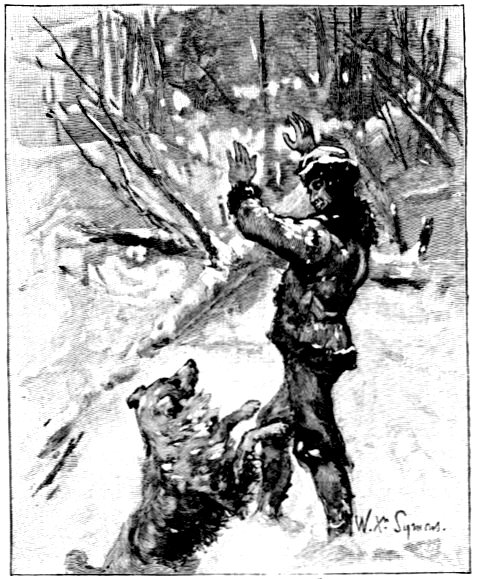
"BARKING WITH DELIGHT."
I was helpless after I got into the warmth for a little time, but soon knew I must try to save my hands and arms. The people were very good, helping in every way to save them, getting me a pail of cold water, in which I held them for twelve hours. The[Pg 287] ice came out in balls; but it was of no use. The good lady fed me; trying to ease the pain as much as she could. My eyes, too, were dreadful; she laid cold tea-leaves on them, which I believe saved me much pain.
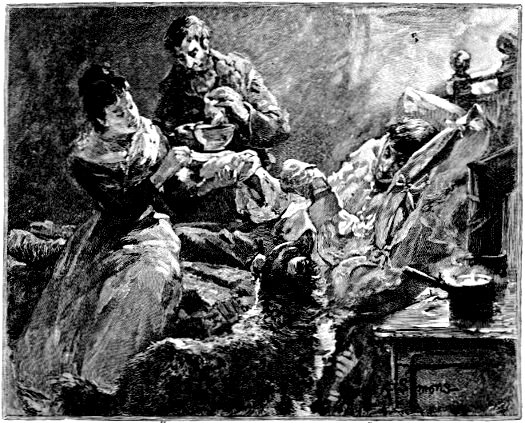
"THEY WRAPPED MY HANDS IN PARAFFIN RAGS."
They removed my boots and socks as quickly as they could, and cut the feet to let the blood out. After I had been lying with my hands in the water so long they took me and laid me on the bed near the stove, and wrapped my hands in paraffin rags. They could not send for the doctor that day, as the blizzard was so bad. After lying in this state for two days he came, but said he could do no good to me there, but I must go to Quappelle, about twenty miles away.
My friends drove me to Indian Head, but I was very sore, their sleigh not being long enough to lie at length in it. After this other friends carried me to the hotel and fed me, whilst the rest got a waggon and put it on sleighs with a spring mattress and rugs, and started me on my journey again.
I went on comfortably for the next ten miles, when I arrived at the Leeland Hotel, where six men carried me upstairs on a blanket. I lay here seven days, Doctor Edwards and the manager of the hotel doing all they could for me. The students from the college used to come and sit up with me. Doctor Edwards told me I must have both hands taken off, if not one foot, so I thought it best to go to the General Hospital, Winnipeg.
I started on January 3rd, at half-past three o'clock in the morning, arriving at Winnipeg at half-past six o'clock at night, being taken from the station in a fly, and admitted about seven o'clock. After having a nice warm bath, I was put to bed, receiving every attention. I had as many as eight doctors to see me, but they gave up my hands as hopeless. On the 23rd of January they took them both off, about two inches above my wrists. I was in bed eleven weeks, and Nurse Reynolds attended and dressed my arms all the time.
I left Winnipeg on April 1st, going West to some friends until strong enough to return home. My fare was paid to Liverpool,[Pg 288] and I started the 3rd of June, stopping to see the nurse on Sunday, when I met an old mate who was in the hospital all the time with me to have his big toe taken off. He fed me, sleeping with me to dress me. His name was Tom Collett; he put me on the train Sunday night, and I arrived at Quebec on Wednesday night, late. I stayed with French people at the hotel and found it very comfortable.
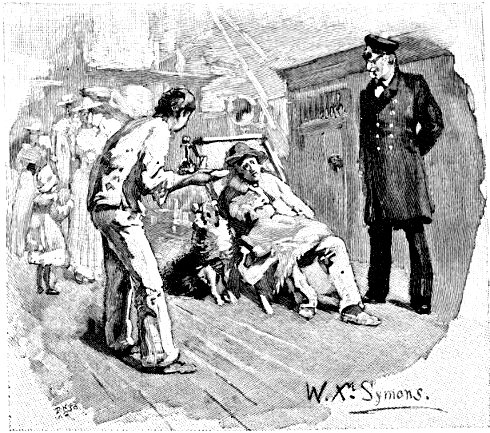
"A SAILOR ATTENDED TO ME."
In the morning I went on to the Allan Liner Sardinian, when we left Quebec about 12 o'clock a.m. I had an intermediate ticket: it was quite as good as first-class. The captain sent a sailor to look after me; he dressed, fed, and attended to me in every way he possibly could. We had a good voyage, arriving at Liverpool on the Saturday before Jubilee Day, but too late to send a telegram home. The sailor saw me in the train at Liverpool at eleven o'clock at night, and I reached London about four o'clock next morning, where a policeman showing me a waiting-room, I slept until seven o'clock, after which I had refreshment, leaving King's Cross at once, and reaching home at eleven o'clock, having been away from England one year and a half.
Note.—All the portraits and pictures in the article in the January Number of The Strand Magazine on "The Signatures of Charles Dickens" were taken from the engravings in "Charles Dickens, by Pen and Pencil," by Mr. Fredrick G. Kitton, published by Mr. Frank T. Sabin and Mr. John F. Dexter, of 118, Shaftesbury Avenue, the proprietors of the work. These engravings were copyright, a fact of which we were not aware, and we hereby express our sincere regret to the owners of the original work for our unintentional infringement of their rights. Mr. Schooling, the writer of the article, is in no way to blame for what has occurred.
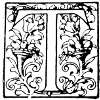
The post of Ambassador at Paris being the plum of the Diplomatic service, its attainment is the hope and aim of many a statesman; but, skilful though he may have proved himself, brilliant though his services to his country may have been, he is fortunate indeed if his aspirations are ever realized. It is quite conclusive, however, that he who is appointed is a man of sterling merit: and such is the present Ambassador; and most of us can recall the satisfaction with which both political parties hailed his succession.
I have had several opportunities of visiting the Embassy in the Rue du Faubourg Saint Honoré, but certainly the most interesting occasion was the first one, that being the wedding day of Lord Terence Blackwood, the second son, to Miss Davis, of New York.
I am early on the scene, so have ample time to linger at the massive gates, and looking across the courtyard, study the front exterior.
It is a house with a history; for back in the days when Buonaparte was seeking to make himself master of the world, his sister, the Princess Pauline, was its occupant. Beautiful as this Princess was, one can easily imagine the house to have been the rendezvous of the fashionable inhabitants of a fashionable city; although, if report speaks truly, such assemblies were composed more largely of the gay than the wise. A change of ownership came, for in 1814 it was purchased by the British Government; and from being a resort for the idle, it became one of the business centres of Paris. Now we pass the porter's lodge and the offices of the Consulate, and mount the broad steps into the portico. Just now all this presents quite a tropical appearance; stately palm, waving fern, and choice flowers being placed for the occasion. Stepping into the entrance halls, inner and outer, I find a continuance of the floral decorations, making the place look a veritable fairyland. Ionic columns, marble walls, and marble stairs lend themselves for a grand background to this Oriental display, here and there peeping out, costly but not lovely, Burmese idols, elephants' feet, a model of Mandalay, a Pith village, and other valuable curios. Tables with rich Oriental covers, settees and chairs in rich crimson velvet, give colour, making altogether a fine picture.
I am almost immediately joined by Lady Dufferin and her two daughters, and much pleasant talk ensues, and a leisurely survey of some hundreds of costly wedding presents.
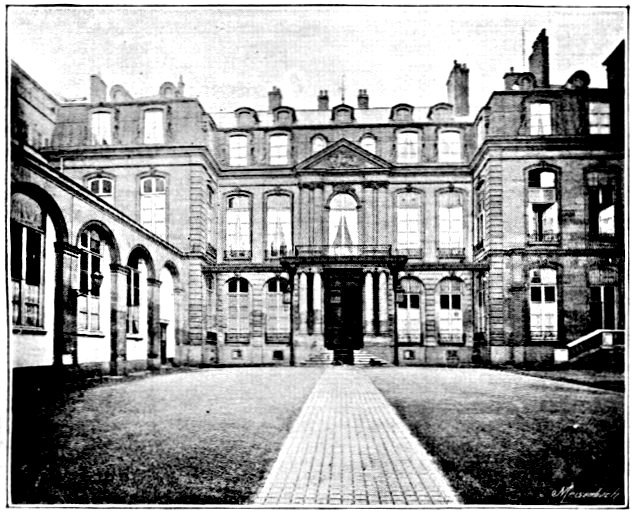
THE BRITISH EMBASSY—FRONT VIEW.
From a Photo. by Gunn & Stuart, Richmond.
A chat with any of this family is an intellectual treat; so much can they tell one of people and places, and so many and varied[Pg 290] are the leaves from their eventful lives. Also, the residence is an interesting study. One sees in it so many reminders from friends in all parts: testimonies of esteem and regard bestowed by illustrious donors, and pleasant little reminders come with them all—a little anecdote of this individual, and a little story connected with that place.
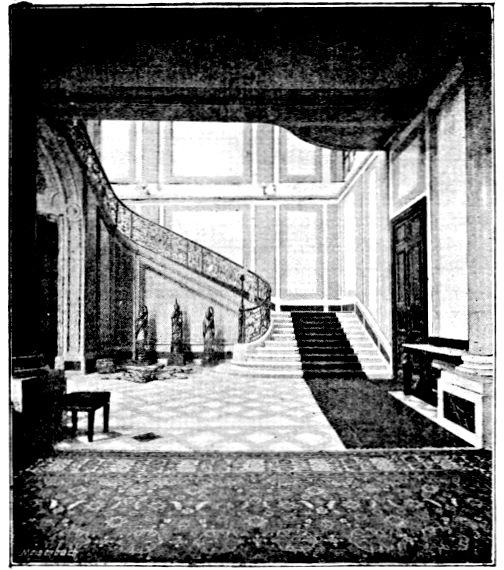
GRAND STAIRCASE.
From a Photo. by Gunn & Stuart, Richmond.
Together we make the tour of the principal rooms, halting every now and again for anything of special interest, such as water-colours by His Excellency, paintings and miniatures collected by him on his foreign stations, furniture and plate formerly the property of the Napoleon family, and the exquisite floral decorations of the suite of rooms set apart for the reception in American style which is to take place after the ceremony.
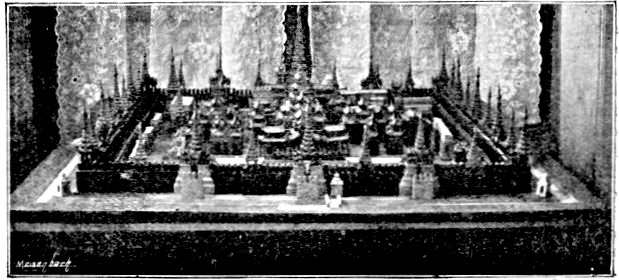
MODEL OF MANDALAY.
From a Photo. by Gunn & Stuart, Richmond.
Here we are presently joined by the Marquis and the bridegroom—Lord Terence Blackwood—together with his two younger brothers; we all turn again to the still arriving presents, everybody laughing and talking together in an unaffected and happy manner. Evidently the coming event affords complete satisfaction to this thoroughly typical English family; but time is getting on, the sight of the men in their gorgeous State liveries of blue and gold, powdered wigs, and pink silk stockings warns each and all of preparations to be made, so we disperse for the present, to meet many times later in the day, and also on subsequent occasions.
Then I wander about at my own will and pleasure, and make myself more thoroughly acquainted with the house and its contents.
The Throne Room and Ball Room are contiguous, only divided by an archway spanned by a double brest-summer supported by carved figures. In the Throne Room, Lord Dufferin, of course, represents the Majesty of Great Britain; and though the number of English residents in Paris is comparatively few since the fall of the Monarchy and the rise of the Republic, yet there is still a fair number of influential families, and also many foreign friends of the British Crown, who, together with the representatives of other Courts, make up a crowded assembly and form a brilliant gathering. Different receptions, these, to some I was told of—some in India and others in Canada. Very peculiar and highly amusing: perhaps the first one given in Canada excelled in this respect. Owing to delay in arrival of luggage, the family were very, very short of even such necessary articles as crockery, managing amongst themselves with about half-a-dozen[Pg 291] cracked plates and cups. More must be got somewhere for the reception, which would doubtless be large, so they had to borrow, not priceless Sèvres or dainty Dresden, but thick earthenware, pure and simple. The entire affair was what we should call "scratch"—the bed had to be moved out of the best bed-chamber to make more room; the furniture itself was all "lodging-house." When the company arrived many of them had no cards; the servant could not say their French names, so made them write them on bits of paper at the entrance; and, to crown it all, just as it was all over, the servants of the crockery owners came and fetched it away, right in sight of the guests!
And yet they were very merry over all these affairs—merry even when they had to oil themselves all over with strong smelling oil to keep off the bites of the mosquitoes. And then what outings they had in this same place! How they all went on fishing expeditions; camping out in tents, which had to be entered by creeping in on all fours through a very small hole; then sleeping with a knife under their pillows, so as to cut another way out if a bear should look in! One occasion Lady Dufferin recalls, when, on crawling into her tent in the usual manner, she made a false movement and the entire affair upset on top of her! Canadian life had its drawbacks, but it had its pleasures, not the least of them being the large circle of friends made by the Governor-General and his wife; and it is difficult to say on which side was the most regret at parting—the Dufferin family or the inhabitants of the country.
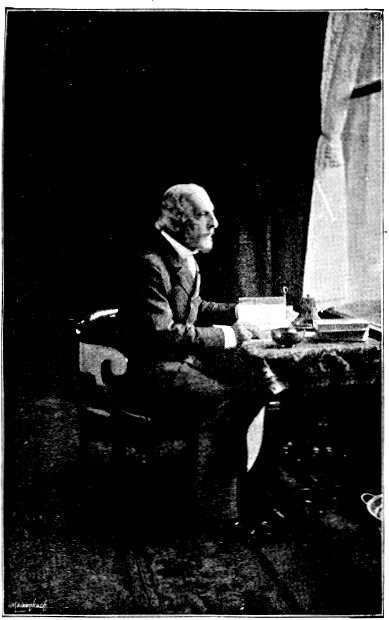
LORD DUFFERIN IN HIS STUDY.
From a Photo. by Gunn & Stuart, Richmond.
Then the reminiscences go away to India, where everything was done on a scale of gorgeous magnificence; where such a reception awaited them on their arrival as completely eclipsed anything they had ever before witnessed; where vast crowds of Europeans and natives of every size and shape lined the streets to give them greeting: some in all the colours of the rainbow, some in "nearly nothing at all." Here the Residence was grand and stately, swarming with native servants in any number of different costumes: some in glittering uniforms, some in ordinary dress, and some in rags and tatters; but men, all men, for every possible duty, and all of them extremely mindful of caste. He who puts water into your jug would not deign to pour it out; one who cleans your shoes would consider it derogatory to pass[Pg 292] you a cup of tea; one puts a candle in a candlestick, another sets light to it. At any time you need not be surprised at finding as many as eight men in your bedroom, all gravely performing their different duties!
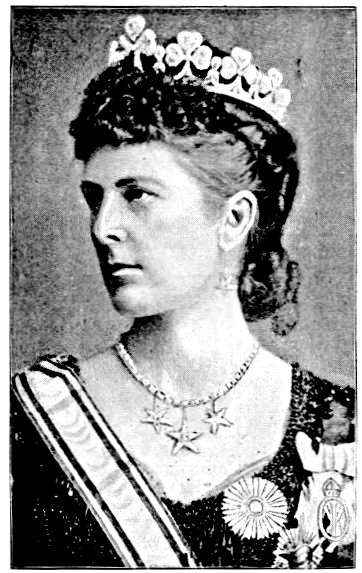
LADY DUFFERIN.
From a Photograph.
Then the receptions of Indian potentates by Lord Dufferin, when, in accordance with the rank of each, so many aides-de-camp must fetch them from their residences, and so far must His Excellency advance to meet them: anywhere from half-way down the room to the steps at the entrance.
Then they all sat about in various positions, some of the time silent, some of it talking with the aid of interpreters; occasionally varying proceedings by offering presents which they did not mean them to accept—Lady Dufferin and others of the family enjoying a private view from a safe hiding-place.
Somewhat embarrassing must have been the situation of Lord Dufferin and his attachés when attending for the first time an Indian organized entertainment. It was in the morning, and they were duly arrayed in orthodox frock-coat. Much to their consternation, wreaths of flowers were brought forward and placed around their necks! Just you imagine such a picture here! I am afraid it would be too much for even the gravity of grave Englishmen!
At Paris things are done in lavish style, be it dinner party for forty to sixty, or garden party attended by fourteen or fifteen hundred; the wedding reception, for instance, bringing several hundreds of the élite of the city, the entire ground suite of rooms being thrown open, in addition to the fine covered promenade gallery, with orange trees, palms, etc., which forms a terrace opening on to grounds in the rear of the house.
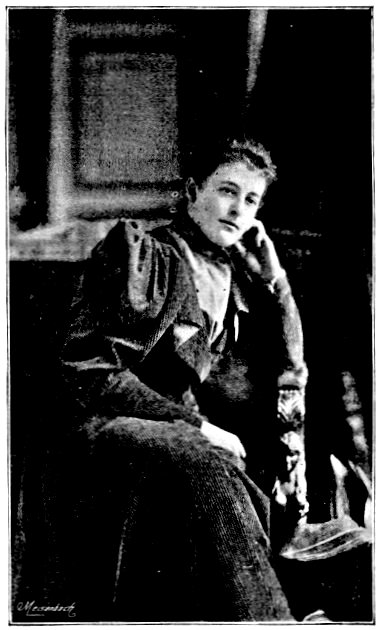
LADY HERMIONE BLACKWOOD.
From a Photo. by Gunn & Stuart, Richmond.
This brings me back to the Throne Room, where I commenced to speak of receptions. This room is somewhat limited in size, but the Ball Room joining more than redeems it, as the two combined have the most magnificent proportions. The walls are hung in crimson, and show a profusion of plate-glass panels; the ceiling is painted cream, with gold relief, crystal chandeliers depend from it; the whole being supported by decorated Doric columns. The Throne[Pg 293] chair, on daïs and under a canopy, is of the usual character, crimson upholstery and frame of over-burnished gold; other furniture to match, and all of it showing the Arms of England and V.R., even the carpet—an Axminster—having the same design woven. Passing under the archway into the Ball Room, you step immediately on to a very beautiful parquetry floor, and get a clear view of the pretty lawn and terraces, from windows facing—windows handsomely curtained in cream and gold. Ceiling and walls alike are splendidly decorated in relief, showing musical and armorial designs; the furniture, settees, and chairs to match with those in the Throne Room.
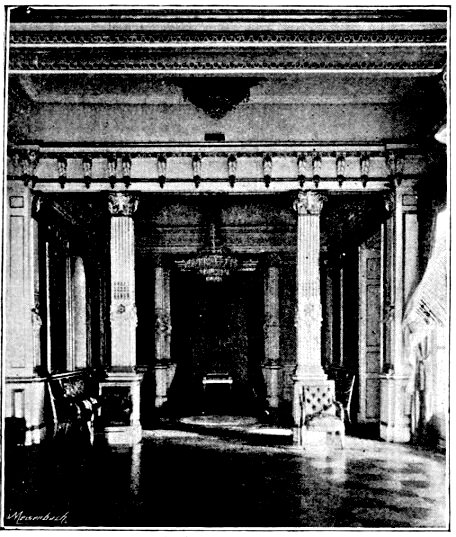
THE THRONE ROOM.
From a Photo. by Gunn & Stuart, Richmond.
Not only did I have the pleasure of witnessing a reception and ball in these rooms, but also attended an assemblage of quite a different character there on another occasion: one of a description that tends very much to make Lord and Lady Dufferin the popular personages they are; showing unmistakably their interest in their less wealthy and less fortunate countrymen and countrywomen. This special meeting was on behalf of the "Girls' Friendly Society," the Paris branch of which has a hard-working president in Lady Dufferin. His Excellency not only threw open his splendid rooms, but also took the chair, and made a hopeful, energetic speech, assuring the society of his continual support. I just mention this to show how ready the family are to accord help to those who need it, and to give up time for the good of others, notwithstanding the heavy pressure of official and social duties devolving upon them.
Thus the Embassy is the very centre of much good work in the city; how much is really done in helping the needy, in suppressing vice, protecting strangers, and supporting charitable objects of all sorts it would be impossible for me to give you any idea.
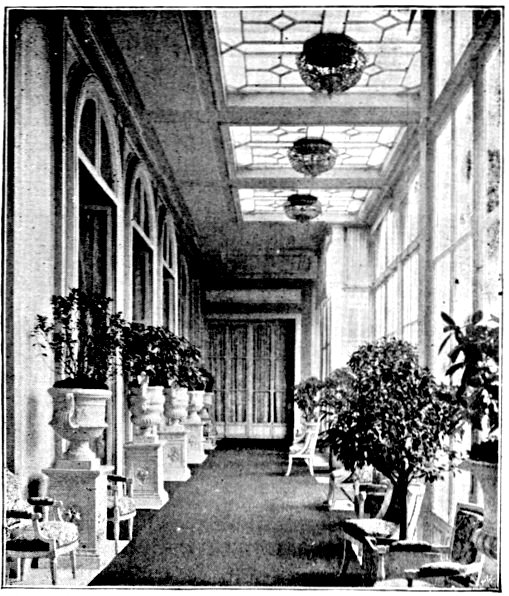
THE GALLERY.
From a Photo. by Gunn & Stuart, Richmond.
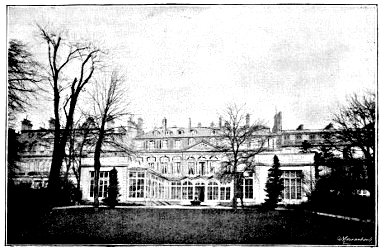
THE LAWNS AND TERRACES.
From a Photo. by Gunn & Stuart, Richmond.
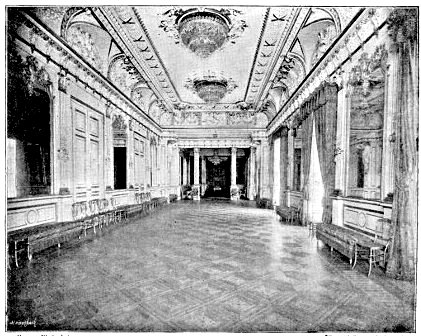
THE BALL-ROOM.
From a Photo. by Gunn & Stuart, Richmond.
Of Lord Dufferin's official life it is not necessary to say much; his appointment here was putting the right man in the right place, such satisfactory proof has he always given of his splendid abilities, keen tact, and nicety of judgment. More than one crisis has he successfully tided over, earning the un[Pg 294]bounded gratitude of his country. Few men, perhaps, have held so many and important positions under the Crown as he. Born at Florence in 1826, he was educated at Christ Church, Oxford; became a Lord-in-Waiting to Her Majesty in 1849; went with Lord Russell on a special mission to Vienna in 1855; on a mission to Syria in[Pg 295] 1860; was made Lord-Lieutenant of County Down in 1864: Under-Secretary of State for India in 1864; Under-Secretary for War in 1866; Chancellor and Paymaster for the Duchy of Lancaster in 1868; Governor-General of Canada in 1872; Ambassador to St. Petersburg in 1879; to Constantinople in 1881; was sent on a Special Commission to Egypt in 1882; was made Viceroy of India in 1884; Ambassador to the King of Italy in 1888; Ambassador at Paris in 1891.
In the Red Saloon many instances of the artistic ability of Lord Dufferin may be seen: indeed, the crimson-covered walls are profusely hung with his water-colours. Amongst others, I noticed the "Ruins of Fort Ticonderoga" (where the 42nd Regiment was cut up), the "Indian's Grave," "Artillery Ground at Quebec," "Killyleagh Castle," and some descriptive of the Iceland journey of his lordship.
While thinking of the Marquis of Dufferin as a clever statesman, an artist, and a literary man, it must not be forgotten that he is also a very fine orator. His various speeches make splendid reading: instructive, eloquent, and always well to the point before him. Perhaps there are no better of his on record than those made in Canada, when the rugged sons of toil who listened to him went almost wild with delight. At that time people had scarcely commenced to settle in places which are now prosperous cities and towns, and Lord Dufferin did splendid service by visiting outlying regions and pointing out possibilities of new commerce and new sources of income.
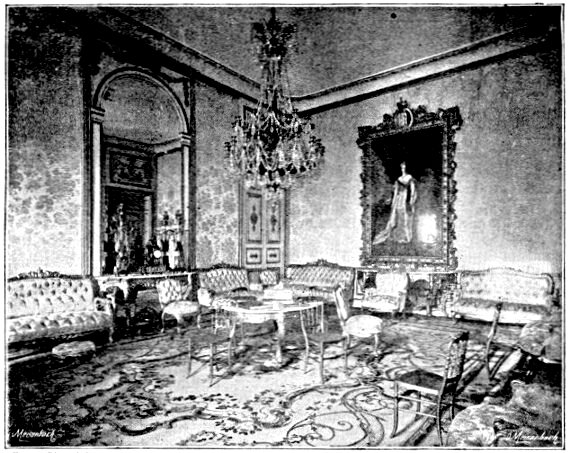
THE QUEEN'S ROOM.
From a Photo. by Gunn & Stuart, Richmond.
The Queen's Room is very handsomely decorated in blue and gold, and is one of the suite of drawing-rooms on the ground floor; it takes its name from a magnificent full-length painting of Her Majesty. Buhl tables, furniture of gold and silk brocade, ormolu decorations, and carved marble combine to make an exquisite display. As with the other drawing rooms, it opens out on to the Promenade Gallery.
The next room, called the Prince of Wales's Room, is very handsome: it has a richly-decorated ceiling in gold relief, with walls draped and embellished to match; Ionic columns and gold-framed panels to doors add to the richness; cream silk curtains to the windows, and quantities of white flowers giving graceful relief to the gold blazonry of furniture and carpet. The carpet, I may mention, has the Prince of Wales's feathers woven in the centre—from this the room is named.
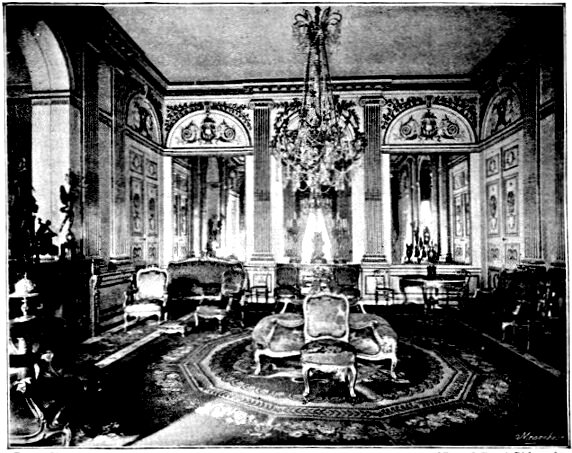
PRINCE OF WALES'S ROOM.
From a Photo. by Gunn & Stuart, Richmond.
On the wedding day I was enabled to be present at an American reception given in this room. Furniture was all cleared out and every niche filled with flowers, with wreaths of same round every picture and panel; a daïs was erected at the top, and on it stood Lord and Lady Terence Blackwood on their return from church, everybody who attended walking up to shake hands and congratulate, then walking off to find their way to the well-spread tables for "five o'clock tea." Lord and Lady Dufferin and family mingled with the crowd, talking to everybody; and though the bride and bridegroom must have been tired with standing so long, and shaking hands with so many, yet the whole affair was a deal more enjoyable than the formal breakfast, with the nervous speeches of the nervous men.
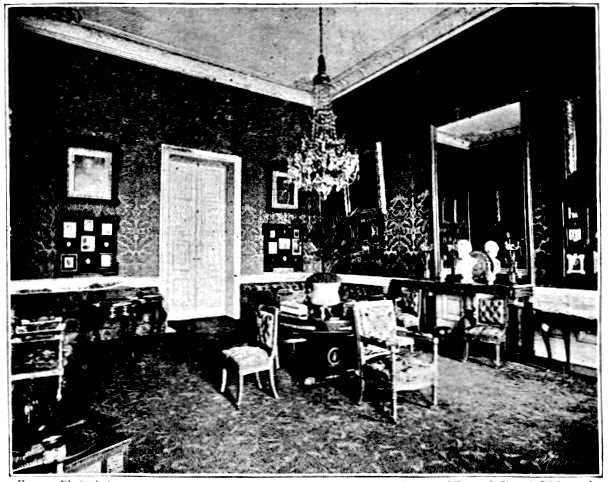
THE RED SALOON.
From a Photo. by Gunn & Stuart, Richmond.
Of course, I congratulated the happy[Pg 297] couple on behalf of The Strand Magazine, and of course I carried away a piece of the cake, one of the inimitable Buszard's, all glorious in silver decorations of flowers, fruit, Irish harps, etc., and mounted on a massive silver stand. For the benefit of my lady readers, I may remark that the bride was really beautiful (people generally say they look so, but this one really was); cream satin, Venice point, and orange blossom were all in due order. But what chiefly interested me was the crowd of celebrities present—Rothschilds, Ambassadors (whose names are known and honoured), some of the French nobility, many familiar English faces, musical and dramatic stars, etc.
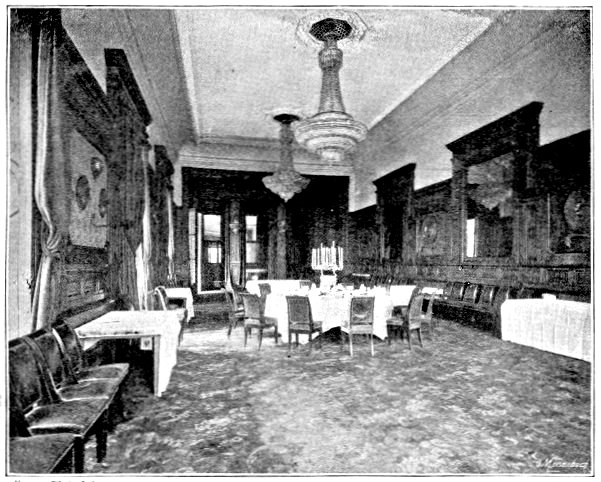
THE DINING-ROOM.
From a Photo. by Gunn & Stuart, Richmond.
From here I proceed to the Dining Room, a fine apartment lighted with crystal chandeliers and silver-gilt candelabra, showing a splendidly painted ceiling, with walls of marble, carved oak, and crimson panels—these being hung with shields and pieces of armour, offensive and defensive. On the tables is a fine display of plate, formerly the property of Jerome Napoleon, a costly Burmese bowl, and other pieces of presentation plate too numerous to mention. I may here say that upstairs in the strong-room I saw a remarkably large collection of plate—some belonging to the Embassy, but a great deal of it the private property of the Marquis; all was of the richest in quality and design, but perhaps the gold Buddha from Burmah, a Burmese cup—wonderfully chased—and some candelabra, copied from originals found in Pompeii, were of the greatest interest.
From here you can step out into the Inner Hall, and then mount the splendidly wide marble staircase, soon finding yourself in a most beautiful suite of apartments.
The Second Red Saloon calls for your particular attention: it has much in it worth close study. The painted ceiling, brocaded walls, and parquetry floors are elegant and costly, and the furniture of the First Empire worth more than passing note; but the chief attraction undoubtedly is the unique collection of Indian Rajahs, paintings on ivory; these—seventy, I believe, in number—were presented to His Excellency before leaving India.
Nearly every one of the miniatures brings up some interesting and may-be amusing recollection, and carries the family back to sojourns in various places: at Calcutta, for instance, where Lady Dufferin tells with glee how on one of her visits she was literally garlanded with flowers, her pocket-handkerchief copiously drenched with a pungent scent, and a scented bouquet ornamented[Pg 298] with tinsel thrust into her hands: thus bedecked, she had to drive through the streets, feeling, I should imagine, like a central figure in a circus display. It seems it was customary everywhere to make offerings of flowers, fruit, cakes, and candy; and as these latter were accepted and passed over to the servants, they were much delighted. The rule regarding other presents was curious: jewellery, etc., was accepted, but passed on to the Government Treasury, sold, and presents of equal value returned to the donors: rather aggravating this, when a specially nice article is given. Money, too, was often offered, but this was only touched, not taken!
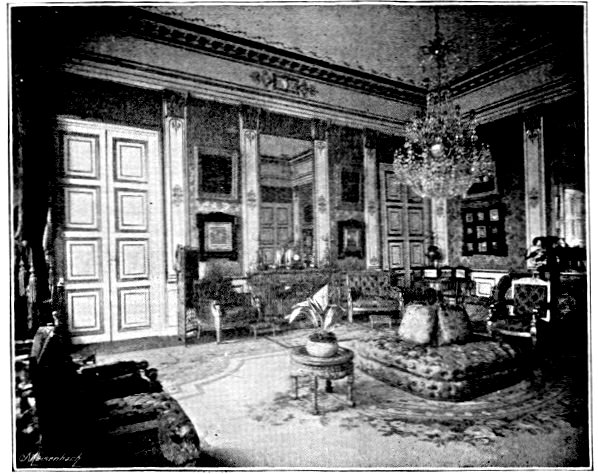
THE YELLOW SALOON.
From a Photo. by Gunn & Stuart, Richmond.
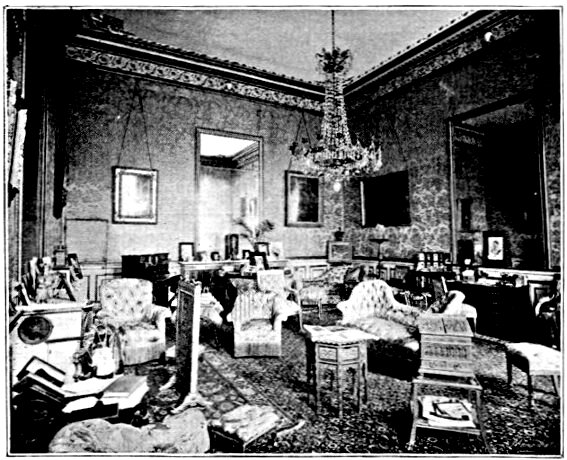
LADY DUFFERIN'S BOUDOIR.
From a Photo. by Gunn & Stuart, Richmond.
Then, again, reminders crop up of Burmah, some not very pleasant ones too, when the bedrooms were kept lively with swarms of lizards, and even scorpions occasionally putting in an unwelcome appearance. Or of Simla, where a small Government House was perched at such a dizzy height as made falling over a precipice a great probability if venturing too far over the threshold: a place where carriages could not get along, where everybody had to go out in "jinrikshas," a species of Bath chair, which was half pulled and half pushed by four and sometimes six men: processions of them going along in single file, the merry occupants shouting remarks to the van or rear as they proceeded. Just you imagine going to church on Sunday morning in this fashion, or mounted on rough ponies, horses, or anything on legs that could[Pg 299] be obtained. Fancy what a nondescript congregation it must be; occupants of jinrikshas, ladies in riding gear with boots and spurs complete, and black servants in every colour of the rainbow.
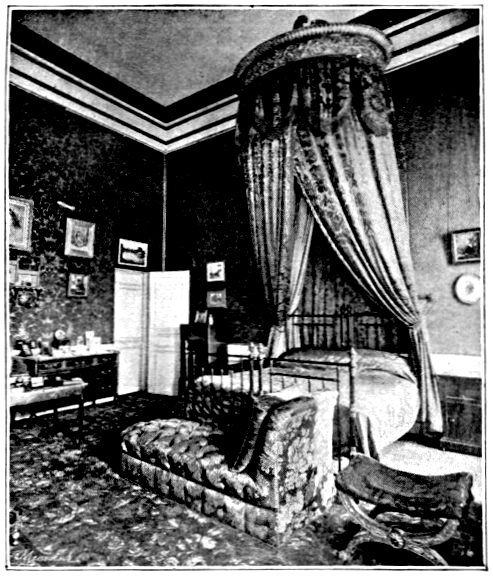
STATE BEDROOM.
From a Photo. by Gunn & Stuart, Richmond.
One might go on for any length of time with these reminiscences, but there are a few more rooms yet unexplored.
The next one I enter is known as the Yellow Saloon, nearly everything in it being gold and cream. The ceiling is painted cream and decorated in gold relief, the walls are hung with gold brocaded silk, carpets and curtains, settees and chairs all in character. On the walls may be seen some costly Italian pictures, collected by Lord Dufferin, also a few more miniatures of Rajahs. The marble mantels in this suite of rooms are also a special feature, so beautifully are they carved; also you will note the graceful crystal chandeliers and parquetry floors.
On one side of the room you will observe a very handsome silver-gilt frame containing a portrait of the Maharajah of Patiala, also a present. Lord and Lady Dufferin were occasional guests at this Prince's palace, he entertaining them right royally, even to providing bagpipe strains for after-dinner performance, the dusky pipers in Scottish attire, with legs cased in pink silk to keep up the semblance. I believe time and tune were not much regarded, but what mattered that? The intention was good.
Opening from here is Lady Dufferin's boudoir, a cosy apartment, crowded with artistic and useful pieces of furniture; music, books, and family photographs abound; and here Lady Dufferin finds time for arrangement and direction of much of the good work in which she is constantly engaged.
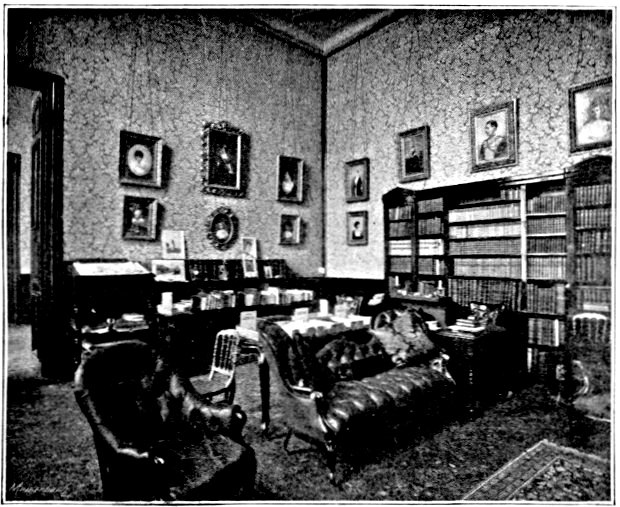
LORD DUFFERIN'S STUDY.
From a Photo. by Gunn & Stuart, Richmond.
I may as well here state that Lady Dufferin[Pg 300] is the daughter of the late Archibald R. Hamilton, Esq., of Killyleagh Castle, Co. Down; she has orders, the "Crown of India," the "Victoria and Albert," the "Crescent of the Shefkhat," and "Lion and Sun." Wherever Lord Dufferin has been appointed, there has Lady Dufferin worked zealously for the welfare of the poorer classes, but it is perhaps more especially for her splendid work for the women of India that she is so much honoured. Most of you know the wretched condition of these poor women, sufferers through the custom of the country. Lady Dufferin, by her noble efforts for the training of native women in medical skill, has earned the gratitude and alleviated the misery of thousands. The amount of correspondence alone that all this entails upon her ladyship is prodigious; every minute seems to be fully occupied.
We take a peep into the next room, a State bed-chamber. This, Lady Dufferin tells me, was formerly used by the Princess Pauline. Over the bed is displayed the eagle, and the letter "P.," in ormolu, is on much of the tulip, satinwood, and rosewood furniture, all of which is covered with the richest of brocades.
There is another room which must not be omitted—Lord Dufferin's study. Thither I proceed, and thus get a glance of the enormous amount of business devolving upon the Ambassador and his secretaries.
Everything is of the most orderly in the arrangements: all correspondence sorted up; papers and books of reference ready to hand; well-filled bookshelves containing Parliamentary and technical works, and all the other accessories of a hard-working Minister's room. On the walls I note a number of family portraits, chief of which are Lady Dufferin and Lord Ava—the eldest son.
Of the real work done here, few can form any idea; communications from all parts of the globe, arbitration here, intercession there. Very much fine tact is wanted to keep all this going smoothly: to uphold the majesty, please the public, and give no manner of offence. The multiplicity of affairs, some trivial, some weighty—to an ordinary mind—would be alarming. Not so long ago I was in conversation with one, who, residing in a town not far from Paris, had, as I think deservedly, brought himself under the vengeance of the French law; but he was an English subject. "So," said he, "I shall appeal to the Ambassador!" and appeal he did. This just gave me an instance of the number of petty matters that come for settlement to the Embassy.
Downstairs is another room where any amount of business is transacted, and where I had a few minutes' chat with Austin Lee, Esq., one of the secretaries; and opposite are the offices of the Consulate. To one and another there is a constant stream of people from morning till night; all sorts and conditions, and on all sorts of business. One thing you may be sure of: no one who really needs and deserves help or redress fails in obtaining it; Lord Dufferin and his able assistants—whose portraits are here presented—not only conducting affairs of State with dignified ability, but also giving ready sympathy of a practical nature wherever required.
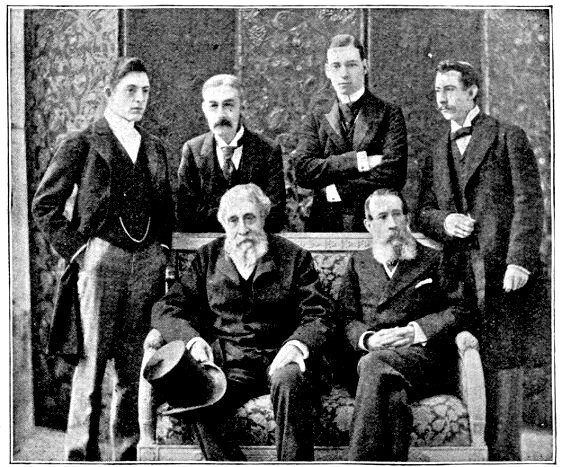
LORD DUFFERIN'S ASSISTANTS.
From a Photo. by Gunn & Stewart, Richmond.
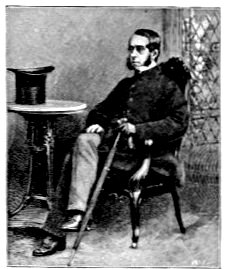
AGE 38.
From a Photo. by Southwell Bros., Baker St.
Born 1825.
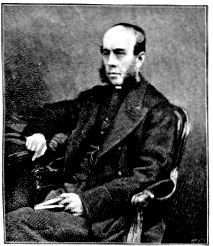
AGE 47.
From a Photo. by Maull & Fox.
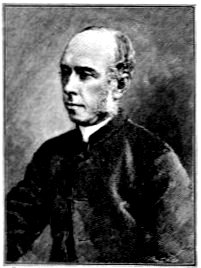
AGE 58.
From a Photo. by Elliott & Fry.
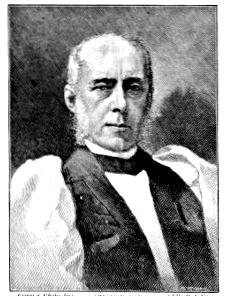
PRESENT DAY.
From a Photo. by Elliott & Fry.

The Right Rev. Anthony W. Thorold, Lord Bishop of Winchester, is the second son of the Rev. E. Thorold, Rector of Hougham. He graduated at Trinity College, Oxford, and was ordained in 1849. From 1874 to 1877 he was Canon Residentiary of York, and was consecrated to the Bishopric of Rochester in 1877. His lordship was transferred to the Bishopric of Winchester in 1891.
Born 1845.
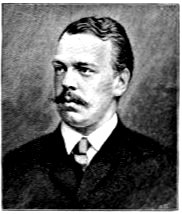
AGE 20.
From a Photo. by George Hansen, Junr., Kjöbenhavn.
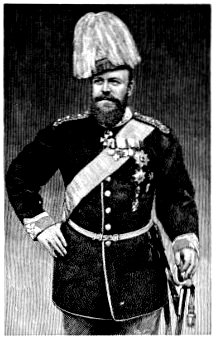
AGE 38.
From a Photo. by Carl Sonne, Kjöbenhavn.
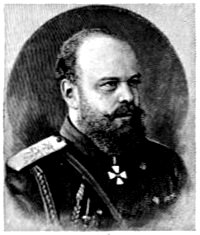
AGE 46.
From a Photograph.
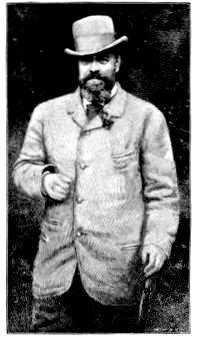
PRESENT DAY.
From a Photo. by J. Danielsen, Kjöbenhavn.
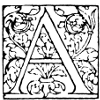
Alexander III. succeeded to the throne as Emperor of All the Russias in 1881. His coronation took place at Moscow in May, 1883. In 1866 he married Mary Feodorovna, daughter of Christian IX., King of Denmark, and sister of the Princess of Wales and the King of Greece.
Born 1846.

AGE 3.
From a Drawing by A.P. Paul.
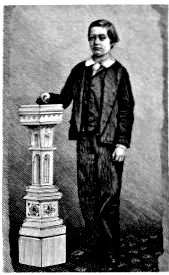
AGE 12.
From a Photograph.
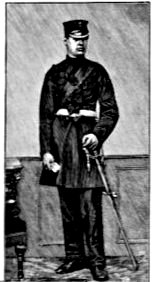
AGE 19.
From a Photo. by Wolthytype, Regent Street.

AGE 27.
From a Photo. by A. Bassano, Piccadilly.
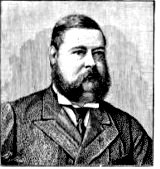
PRESENT DAY.
From a Photo. by W. & D. Downey.
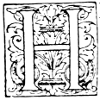
Henry Wellesley, Duke of Wellington, Prince of Waterloo, was late Major and Lieutenant-Colonel Grenadier Guards, Colonel 2nd Brigade Southern Division Royal Artillery Militia, and Honorary Colonel of the 3rd and 4th Battalions of the Duke of Wellington's West Riding Regiment. He succeeded to his uncle, son of the Great Duke of Wellington, as 3rd Duke in 1884. He was M.P. for Andover from 1874 to 1880, and married Evelyn Katerine Gwenfra, youngest daughter of the late Colonel Thomas Peers Williams, in 1882.
Born 1847.
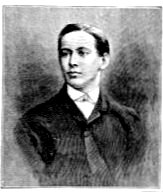
AGE 17.
From a Photograph.
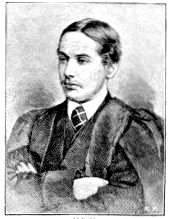
AGE 22.
From a Photograph.
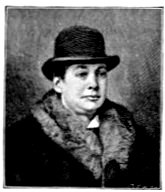
AGE 35.
From a Photo. by White, Littlehampton.
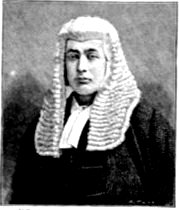
AGE 40.
From a Photo. by Elliott & Fry.
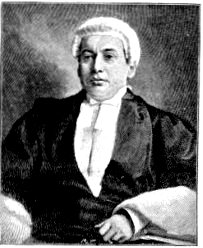
PRESENT DAY
From a Photo. by H.J. Whitlock, Birmingham.
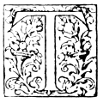
The Hon. Sir William Rann Kennedy was born in Kensington, and was sent to Eton in 1858. At Cambridge, where he went in 1864 as a scholar of King's College, he carried off almost every prize that was open to his competition. He was for a time president of the Cambridge Union, and was elected to a Fellowship at Pembroke in 1868. Whilst still in statu pupillari he enrolled himself as a student at Lincoln's Inn, and a short time before his call to the Bar, in 1870-71, he was private secretary to Mr. Goschen, who was President of the then Poor Law Board. In 1882 he came to London, and in 1885 applied for and obtained silk. He was raised to the Bench in 1892.
Born 1830.
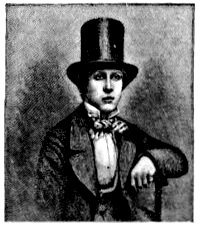
AGE 16.
From a Daguerreotype.
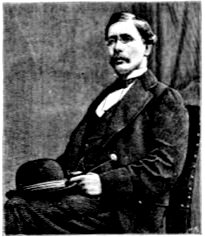
AGE 30.
From a Photo. by Chancellor, Dublin.
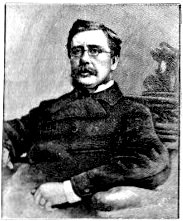
AGE 42.
From a Photo by J. Burton & Sons, Leicester.
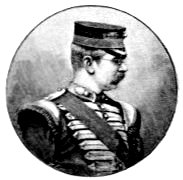
AGE 50.
From a Photo. by Lee Bros., Penarth.
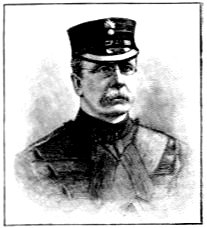
PRESENT DAY.
From a Photo. by W. & D. Downey.
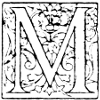
Mr. Godfrey was educated at the Royal Academy of Music, of which he is now a Fellow. He was appointed Bandmaster of the Grenadier Guards by the late Prince Consort, and his first duty was to play into London the Brigade of Guards returning from the Crimea, for which occasion he composed a march called "The Return of the Guards." He was created honorary Second Lieutenant on the Queen's Jubilee, and his term of service has been prolonged beyond the usual age limit by special desire of Her Majesty.
By a Photographer.
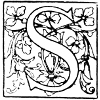
Some people wonder why a photographer charges extra for taking infants in arms. They imagine, perhaps, that a photographer should conduct his business on the principle of the railway companies, and charge nothing for infants and half-price for children under twelve. But if the railway companies had as much trouble with children as the photographer has, they would charge double first-class fare for those under twelve, and make the infant in arms take a special train.
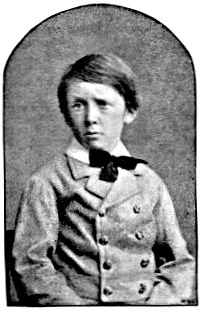
1.
I am a photographer myself, although on mature consideration I think I should prefer to be a railway company. Of infants in arms I prefer not to speak here—there might even be a difficulty about printing some of the things I should say. Suffice it to say that I have a theory that Herod was a struggling photographer in his young days, and had his revenge when he came to the throne. Intelligent children of half-fare age are bad enough, but babies are beyond description. Girls are not always satisfactory, but boys are much worse. A boy turns up at a photographer's in much the same frame of mind that he visits the dentist—minus the terror. He is so determined to see the thing through with inflexible rigidity of countenance, that the overwrought muscles of his face either combine to give him an expression of intense suffering, or else break down under the strain and smudge the picture. It is always a doubtful experiment to ask a boy to smile—you never know what the result will be. Most boys don't seem to know what a smile is. It is best, instead of asking the boy to smile, to provide something likely to make him do it, and then have him photographed quickly before the smile gets too wide for the plate.
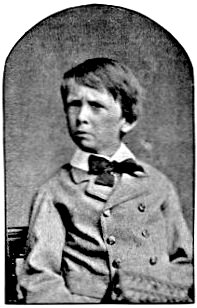
2.
Many old photographers will remember Signor Berneri, a most admirable operator, for many years with Messrs. Elliott and Fry. Signor Berneri was an Italian, and his English vocabulary was small. His invariable direction to his sitters was, "Now, if you please—good express!" There was a certain want of definite clearness about this request, but by the time the worthy Signor had taken a ruinous number of negatives without achieving the "express" he was aiming for, his comic distress and inability to convey a precise notion of what he required usually worked their own cure, and the sitter was[Pg 307] smiling as widely as anybody could ask. An actual illustration of these persevering attempts of Berneri is to be seen on these pages, and a gradually dawning perception of the photographer's intention is observable—and on the face of a boy. The boy's original conception of a "good express" is in the nature of a compromise wherein frowning determination mingles with a guarded defiance.
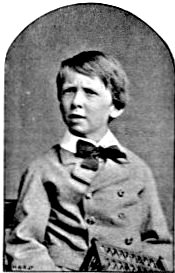
3.
After Berneri's usual "No good! Bad express!" the boy modifies his original notion, and stirs in a little dignified truculence with the facial ingredients he used at first. "Ah, no good—no good! Bad express—more badder express!"—as one can now almost hear the excitable Berneri shouting. The boy abates his truculence, and without altogether abandoning the frown, tries a look of half-amused and quite uncomprehending inquiry, which is, perhaps, justified by the circumstances. This, again, is "no good express," and by this time the operator has grown impatient and amusing; the boy begins actually to smile; and at last there is a real smile—some might say it verged on an amused grin. This boy, by-the-bye, is now Mr. Elliott, jun.—still of Elliott and Fry, and six feet six inches high.
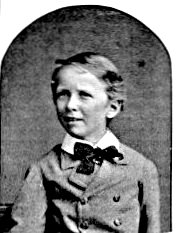
4.
Berneri has betaken himself to a well-earned retirement in Italy—he retired, in fact, some years ago. But, excellent operator as he was, he will be remembered in the profession for some time—if only because of his wildly despairing entreaties for "Good express—now, if you please—good express!"
But it is bad enough when your English is of full vocabulary. Why is it no part of our English boy's education to know what a naturally pleasant expression of countenance is? Why can he see no middle course between an aspect of warlike grimness and a self-conscious grin? I am thinking, seriously thinking, of cultivating Signor Berneri's manner and speech for special use—with boy sitters. I may even spoil more plates than I do at present—although that is scarcely possible—but the smile—or grin—which I extract will, at least, be intelligent, because it will have a definite object—myself.
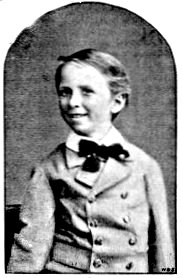
5.
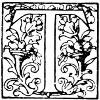
Those who retain any memory of the great law cases of fifteen or twenty years back will remember, at least, the title of that extraordinary will case, "Bartley v. Bartley and others," which occupied the Probate Court for some weeks on end, and caused an amount of public interest rarely accorded to any but the cases considered in the other division of the same court. The case itself was noted for the large quantity of remarkable and unusual evidence presented by the plaintiff's side—evidence that took the other party completely by surprise, and overthrew their case like a house of cards. The affair will, perhaps, be more readily recalled as the occasion of the sudden rise to eminence, in their profession, of Messrs. Crellan, Hunt, and Crellan, solicitors for the plaintiff—a result due entirely to the wonderful ability shown in this case of building up, apparently out of nothing, a smashing weight of irresistible evidence. That the firm has since maintained—indeed, enhanced—the position it then won for itself, need scarcely be said here; its name is familiar to everybody. But there are not many of the outside public who know that the credit of the whole performance was primarily due to a young clerk in the employ of Messrs. Crellan, who had been given charge of the seemingly desperate task of collecting evidence in the case.
This Mr. Martin Hewitt had, however, full credit and reward for his exploit from his firm and from their client, and more than one other firm of lawyers engaged in contentious work made good offers to entice Hewitt to change his employers. Instead of this, however, he determined to work independently for the future, having conceived the idea of making a regular business of doing, on behalf of such clients as might retain him, similar work to that he had just done, with such conspicuous success, for Messrs. Crellan, Hunt, and Crellan. This was the beginning of the private detective business of Martin Hewitt, and his action at that time has been completely justified by the brilliant professional successes he has since achieved.
His business has always been conducted in the most private manner, and he has always declined the help of professional assistants, preferring to carry out, himself, such of the many investigations offered him as he could manage. He has always maintained that he has never lost by this policy, since the chance of his refusing a case begets competition for his services, and his fees rise by a natural process. At the same time, no man could know better how to employ casual assistance at the right time.
Some curiosity has been expressed as to Mr. Martin Hewitt's system, and as he himself always consistently maintains that he has no system beyond a judicious use of ordinary faculties, I intend setting forth in detail a few of the more interesting of his cases, in order that the public may judge for itself if I am right in estimating Mr. Hewitt's "ordinary faculties" as faculties very extraordinary indeed. He is not a man who has made many friendships (this, probably, for professional reasons), notwithstanding his genial and companionable manners. I myself first made his acquaintance as a result of an accident resulting in a fire at the old house in which Hewitt's office was situated, and in an upper floor of which I occupied bachelor chambers. I was able to help in saving a quantity of extremely important papers relating to his business, and, while repairs were being made, allowed him to lock them in an old wall-safe in one of my rooms, which the fire had scarcely damaged.
The acquaintance thus begun has lasted many years, and has become a rather close friendship. I have even accompanied Hewitt on some of his expeditions, and, in a humble way, helped him. Such of the cases, however, as I personally saw nothing of I have put into narrative form from the particulars given me.
"I consider you, Brett," he said, addressing me, "the most remarkable journalist alive. Not because you're particularly clever, you know; because, between ourselves, I hope you'll admit you're not: but because you have known something of me and my doings for some years, and have never yet been guilty of giving away any of my little business secrets you may have become acquainted with. I'm afraid you're not so enterprising a journalist as some, Brett. But now, since you ask, you shall write something—if you think it worth while."
This he said, as he said most things, with a cheery, chaffing good-nature that would[Pg 309] have been, perhaps, surprising to a stranger who thought of him only as a grim and mysterious discoverer of secrets and crimes. Indeed, the man had always as little of the aspect of the conventional detective as may be imagined. Nobody could appear more cordial or less observant in manner, although there was to be seen a certain sharpness of the eye—which might, after all, only be the twinkle of good-humour.
I did think it worth while to write something of Martin Hewitt's investigations, and a description of one of his adventures follows.
At the head of the first flight of a dingy staircase leading up from an ever-open portal in a street by the Strand stood a door, the dusty ground-glass upper panel of which carried in its centre the single word "Hewitt," while at its right-hand lower corner, in smaller letters, "Clerk's Office" appeared. On a morning when the clerks in the ground-floor offices had barely hung up their hats, a short, well-dressed young man, wearing spectacles, hastening to open the dusty door, ran into the arms of another man who suddenly issued from it.
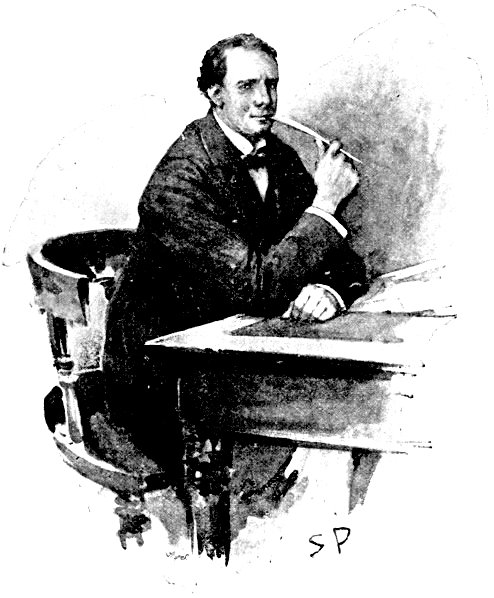
MARTIN HEWITT.
"I beg pardon," the first said. "Is this Hewitt's Detective Agency Office?"
"Yes, I believe you will find it so," the other replied. He was a stoutish, clean-shaven man, of middle height, and of a cheerful, round countenance. "You'd better speak to the clerk."
In the little outer office the visitor was met by a sharp lad with inky fingers, who presented him with a pen and a printed slip. The printed slip having been filled with the visitor's name and present business, and conveyed through an inner door, the lad reappeared with an invitation to the private office. There, behind a writing-table, sat the stoutish man himself, who had only just advised an appeal to the clerk.
"Good morning, Mr. Lloyd—Mr. Vernon Lloyd," he said, affably, looking again at the slip. "You'll excuse my care to start even with my visitors—I must, you know. You come from Sir James Norris, I see."
"Yes; I am his secretary. I have only to ask you to go straight to Lenton Croft at once, if you can, on very important business. Sir James would have wired, but had not your precise address. Can you go by the next train? Eleven-thirty is the first available from Paddington."
"Quite possibly. Do you know anything of the business?"
"It is a case of a robbery in the house, or, rather, I fancy, of several robberies. Jewellery has been stolen from rooms occupied by visitors to the Croft. The first case occurred some months ago—nearly a year ago, in fact. Last night there was another. But I think you had better get the details on the spot; Sir James has told me to telegraph if you are coming, so that he may meet you himself at the station; and I must hurry, as his drive to the station will be rather a long one. Then I take it you will go, Mr. Hewitt? Twyford is the station."
"Yes, I shall come, and by the eleven-thirty. Are you going by that train yourself?"
"No, I have several things to attend to now I am in town. Good morning; I shall wire at once."
Mr. Martin Hewitt locked the drawer of his table and sent his clerk for a cab.
At Twyford Station Sir James Norris was waiting with a dog-cart. Sir James was a tall, florid man of fifty or thereabout, known away from home as something of a county historian, and nearer his own parts as a great supporter of the hunt, and a gentleman much troubled with poachers. As soon as he and Hewitt had found one another, the baronet hurried the detective into his dog-cart. "We've something over seven miles to drive," he said, "and I can tell you all about this wretched business as we go. That is why I came for you myself, and alone."
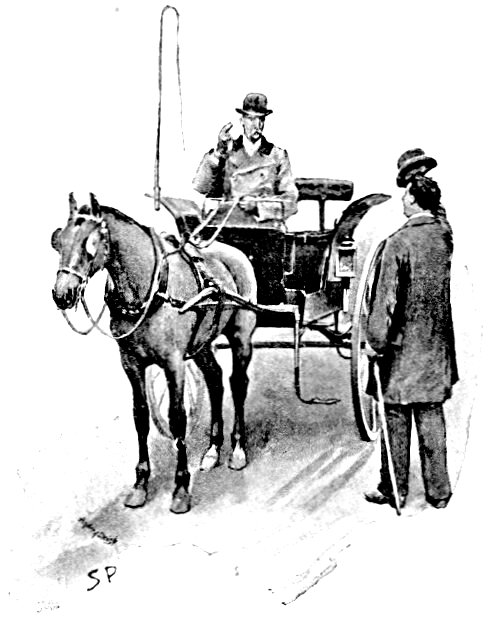
"SIR JAMES NORRIS WAS WAITING WITH A DOG-CART."
Hewitt nodded.
"I have sent for you, as Lloyd probably told you, because of a robbery at my place last evening. It appears, as far as I can guess, to be one of three by the same hand, or by the same gang. Late yesterday afternoon——"
"Pardon me, Sir James," Hewitt interrupted, "but I think I must ask you to begin at the first robbery and tell me the whole tale in proper order. It makes things clearer, and sets them in their proper shape."
"Very well. Eleven months ago, or thereabout, I had rather a large party of visitors, and among them Colonel Heath and Mrs. Heath—the lady being a relative of my own late wife. Colonel Heath has not been long retired, you know—used to be political resident in an Indian native State. Mrs. Heath had rather a good stock of jewellery of one sort and another, about the most valuable piece being a bracelet set with a particularly fine pearl—quite an exceptional pearl, in fact—that had been one of a heap of presents from the Maharajah of his State when Heath left India.
"It was a very noticeable bracelet, the gold setting being a mere featherweight piece of native filigree work—almost too fragile to trust on the wrist—and the pearl being, as I have said, of a size and quality not often seen. Well, Heath and his wife arrived late one evening, and after lunch the following day, most of the men being off by themselves—shooting, I think—my daughter, my sister (who is very often down here), and Mrs. Heath took it into their heads to go walking—fern-hunting, and so on. My sister was rather long dressing, and while they waited, my daughter went into Mrs. Heath's room, where Mrs. Heath turned over all her treasures to show her—as women do, you know. When my sister was at last ready they came straight away, leaving the things littering about the room rather than stay longer to pack them up. The bracelet, with other things, was on the dressing-table then."
"One moment. As to the door?"
"They locked it. As they came away my daughter suggested turning the key, as we had one or two new servants about."
"And the window?"
"That they left open, as I was going to[Pg 311] tell you. Well, they went on their walk and came back, with Lloyd (whom they had met somewhere) carrying their ferns for them. It was dusk and almost dinner time. Mrs. Heath went straight to her room, and—the bracelet was gone."
"Was the room disturbed?"
"Not a bit. Everything was precisely where it had been left, except the bracelet. The door hadn't been tampered with, but of course the window was open, as I have told you."
"You called the police, of course?"
"Yes, and had a man from Scotland Yard down in the morning. He seemed a pretty smart fellow, and the first thing he noticed on the dressing-table, within an inch or two of where the bracelet had been, was a match, which had been lit and thrown down. Now, nobody about the house had had occasion to use a match in that room that day, and, if they had, certainly wouldn't have thrown it on the cover of the dressing-table. So that, presuming the thief to have used that match, the robbery must have been committed when the room was getting dark—- immediately before Mrs. Heath returned, in fact. The thief had evidently struck the match, passed it hurriedly over the various trinkets lying about, and taken the most valuable."
"Nothing else was even moved?"
"Nothing at all. Then the thief must have escaped by the window, although it was not quite clear how. The walking party approached the house with a full view of the window, but saw nothing, although the robbery must have been actually taking place a moment or two before they turned up.
"There was no water-pipe within any practicable distance of the window. But a ladder usually kept in the stable-yard was found lying along the edge of the lawn. The gardener explained, however, that he had put the ladder there after using it himself early in the afternoon."
"Of course, it might easily have been used again after that and put back."
"Just what the Scotland Yard man said. He was pretty sharp, too, on the gardener, but very soon decided that he knew nothing of it. No stranger had been seen in the neighbourhood, nor had passed the lodge gates. Besides, as the detective said, it scarcely seemed the work of a stranger. A stranger could scarcely have known enough to go straight to the room where a lady—only arrived the day before—had left a valuable jewel, and away again without being seen. So all the people about the house were suspected in turn. The servants offered, in a body, to have their boxes searched, and this was done; everything was turned over, from the butler's to the new kitchenmaid's. I don't know that I should have had this carried quite so far if I had been the loser myself, but it was my guest, and I was in such a horrible position. Well, there's little more to be said about that, unfortunately. Nothing came of it all, and the thing's as great a mystery now as ever. I believe the Scotland Yard man got as far as suspecting me before he gave it up altogether, but give it up he did in the end. I think that's all I know about the first robbery. Is it clear?"
"Oh, yes; I shall probably want to ask a few questions when I have seen the place, but they can wait. What next?"
"Well," Sir James pursued, "the next was a very trumpery affair, that I should have forgotten all about, probably, if it hadn't been for one circumstance. Even now I hardly think it could have been the work of the same hand. Four months or thereabout after Mrs. Heath's disaster—in February of this year, in fact—Mrs. Armitage, a young widow, who had been a schoolfellow of my daughter's, stayed with us for a week or so. The girls don't trouble about the London season, you know, and I have no town house, so they were glad to have their old friend here for a little in the dull time. Mrs. Armitage is a very active young lady, and was scarcely in the house half an hour before she arranged a drive in a pony-cart with Eva—my daughter—to look up old people in the village that she used to know before she was married. So they set off in the afternoon, and made such a round of it that they were late for dinner. Mrs. Armitage had a small plain gold brooch—not at all valuable, you know: two or three pounds, I suppose—which she used to pin up a cloak or anything of that sort. Before she went out she stuck this in the pincushion on her dressing-table, and left a ring—rather a good one, I believe—lying close by."
"This," asked Hewitt, "was not in the room that Mrs. Heath had occupied, I take it?"
"No; this was in another part of the building. Well, the brooch went—taken, evidently, by someone in a deuce of a hurry, for when Mrs. Armitage got back to her room, there was the pincushion with a little tear in it, where the brooch had been simply snatched off. But the curious thing was that the ring—worth a dozen of the brooch—was[Pg 312] left where it had been put. Mrs. Armitage didn't remember whether or not she had locked the door herself, although she found it locked when she returned; but my niece, who was indoors all the time, went and tried it once—because she remembered that a gasfitter was at work on the landing near by—and found it safely locked. The gasfitter, whom we didn't know at the time, but who since seems to be quite an honest fellow, was ready to swear that nobody but my niece had been to the door while he was in sight of it—which was almost all the time. As to the window, the sash-line had broken that very morning, and Mrs. Armitage had propped open the bottom half about eight or ten inches with a brush; and when she returned, that brush, sash and all, were exactly as she had left them. Now, I scarcely need tell you what an awkward job it must have been for anybody to get noiselessly in at that unsupported window; and how unlikely he would have been to replace it, with the brush, exactly as he found it."
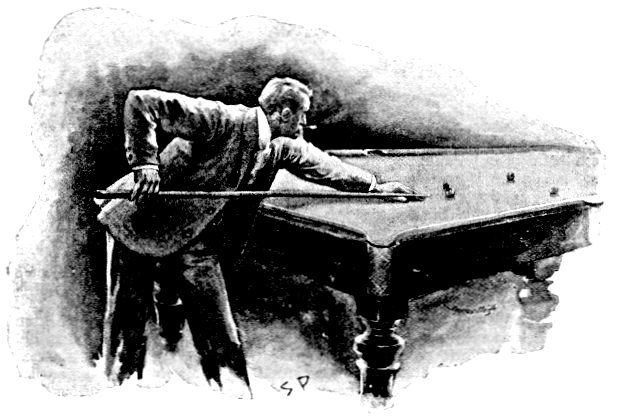
"I WAS TAKING A LITTLE PRACTICE."
"Just so. I suppose the brooch was really gone? I mean, there was no chance of Mrs. Armitage having mislaid it?"
"Oh, none at all. There was a most careful search."
"Then, as to getting in at the window, would it have been easy?"
"Well, yes," Sir James replied; "yes, perhaps it would. It is a first-floor window, and it looks over the roof and skylight of the billiard-room. I built the billiard-room myself—built it out from a smoking-room just at this corner. It would be easy enough to get at the window from the billiard-room roof. But, then," he added, "that couldn't have been the way. Somebody or other was in the billiard-room the whole time, and nobody could have got over the roof (which is nearly all skylight) without being seen and heard. I was there myself for an hour or two, taking a little practice."
"Well, was anything done?"
"Strict inquiry was made among the servants, of course, but nothing came of it. It was such a small matter that Mrs. Armitage wouldn't hear of my calling in the police or anything of that sort, although I felt pretty certain that there must be a dishonest servant about somewhere. A servant might take a plain brooch, you know, who would feel afraid of a valuable ring, the loss of which would be made a greater matter of."
"Well, yes—perhaps so, in the case of an inexperienced thief, who also would be likely to snatch up whatever she took in a hurry. But I'm doubtful. What made you connect these two robberies together?"
"Nothing whatever—for some months. They seemed quite of a different sort. But scarcely more than a month ago I met Mrs. Armitage at Brighton, and we talked, among other things, of the previous robbery—that[Pg 313] of Mrs. Heath's bracelet. I described the circumstances pretty minutely, and when I mentioned the match found on the table she said, 'How strange! Why, my thief left a match on the dressing-table when he took my poor little brooch!'"
Hewitt nodded. "Yes," he said. "A spent match, of course?"
"Yes, of course, a spent match. She noticed it lying close by the pincushion, but threw it away without mentioning the circumstance. Still, it seemed rather curious to me that a match should be lit and dropped, in each case, on the dressing-cover an inch from where the article was taken. I mentioned it to Lloyd when I got back, and he agreed that it seemed significant."
"Scarcely," said Hewitt, shaking his head. "Scarcely, so far, to be called significant, although worth following up. Everybody uses matches in the dark, you know."
"Well, at any rate, the coincidence appealed to me so far that it struck me it might be worth while to describe the brooch to the police in order that they could trace it if it had been pawned. They had tried that, of course, over the bracelet, without any result, but I fancied the shot might be worth making, and might possibly lead us on the track of the more serious robbery."
"Quite so. It was the right thing to do. Well?"
"Well, they found it. A woman had pawned it in London—at a shop in Chelsea. But that was some time before, and the pawnbroker had clean forgotten all about the woman's appearance. The name and address she gave were false. So that was the end of that business."
"Had any of your servants left you between the time the brooch was lost and the date of the pawnticket?"
"No."
"Were all your servants at home on the day the brooch was pawned?"
"Oh, yes. I made that inquiry myself."
"Very good. What next?"
"Yesterday—and this is what made me send for you. My late wife's sister came here last Tuesday, and we gave her the room from which Mrs. Heath lost her bracelet. She had with her a very old-fashioned brooch, containing a miniature of her father, and set, in front, with three very fine brilliants and a few smaller stones. Here we are, though, at the Croft; I'll tell you the rest indoors."
Hewitt laid his hand on the baronet's arm. "Don't pull up, Sir James," he said. "Drive a little further. I should like to have a general idea of the whole case before we go in."
"Very good." Sir James Norris straightened the horse's head again and went on. "Late yesterday afternoon, as my sister-in-law was changing her dress, she left her room for a moment to speak to my daughter in her room, almost adjoining. She was gone no more than three minutes, or five at most, but on her return the brooch, which had been left on the table, had gone. Now, the window was shut fast, and had not been tampered with. Of course, the door was open, but so was my daughter's, and anybody walking near must have been heard. But the strangest circumstance, and one that almost makes me wonder whether I have been awake to-day or not, was that there lay a used match on the very spot, as nearly as possible, where the brooch had been—and it was broad daylight!"
Hewitt rubbed his nose and looked thoughtfully before him. "Um—curious, certainly," he said. "Anything else?"
"Nothing more than you shall see for yourself. I have had the room locked and watched till you could examine it. My sister-in-law had heard of your name, and suggested that you should be called in; so, of course, I did exactly as she wanted. That she should have lost that brooch, of all things, in my house, is most unfortunate; you see, there was some small difference about the thing between my late wife and her sister when their mother died and left it. It's almost worse than the Heath's bracelet business, and altogether I'm not pleased with things, I can assure you. See what a position it is for me! Here are three ladies in the space of one year, robbed one after another in this mysterious fashion in my house, and I can't find the thief. It's horrible! People will be afraid to come near the place. And I can do nothing!"
"Ah, well—we'll see. Perhaps we had better turn back now. By-the-bye, were you thinking of having any alterations or additions made to your house?"
"No. What makes you ask?"
"I think you might at least consider the question of painting and decorating, Sir James—or, say, putting up another coach-house, or something, because I should like to be (to the servants) the architect—or the builder, if you please—come to look round. You haven't told any of them about this business?"
"Not a word. Nobody knows but my relatives and Lloyd. I took every precaution myself, at once. As to your little disguise, be the architect, by all means, and do as you[Pg 314] please. If you can only find this thief and put an end to this horrible state of affairs, you'll do me the greatest service I've ever asked for—and as to your fee, I'll gladly make it whatever is usual, and three hundred in addition."
Martin Hewitt bowed. "You're very generous, Sir James, and you may be sure I'll do what I can. As a professional man, of course, a good fee always stimulates my interest, although this case of yours certainly seems interesting enough by itself."
"Most extraordinary! Don't you think so? Here are three persons, all ladies, all in my house, two even in the same room, each successively robbed of a piece of jewellery, each from a dressing-table, and a used match left behind in every case. All in the most difficult—one would say impossible—circumstances for a thief, and yet there is no clue!"
"Well, we won't say that just yet, Sir James; we must see. And we must guard against any undue predisposition to consider the robberies in a lump. Here we are at the lodge gate again. Is that your gardener—the man who left the ladder by the lawn on the first occasion you spoke of?" Mr. Hewitt nodded in the direction of a man who was clipping a box border.
"Yes; will you ask him anything?"
"No, no: at any rate, not now. Remember the building alterations. I think, if there is no objection, I will look first at the room that the lady—Mrs.——?" Hewitt looked up inquiringly.
"My sister-in-law? Mrs. Cazenove. Oh, yes, you shall come to her room at once."
"Thank you. And I think Mrs. Cazenove had better be there."
They alighted: and a boy from the lodge led the horse and dog-cart away.
Mrs. Cazenove was a thin and faded, but quick and energetic, lady of middle age. She bent her head very slightly on learning Martin Hewitt's name, and said: "I must thank you, Mr. Hewitt, for your very prompt attention. I need scarcely say that any help you can afford in tracing the thief who has my property—whoever it may be—will make me most grateful. My room is quite ready for you to examine."
The room was on the second floor—the top floor at that part of the building. Some slight confusion of small articles of dress was observable in parts of the room.
"This, I take it," inquired Hewitt, "is exactly as it was at the time the brooch was missed?"
"Precisely," Mrs. Cazenove answered. "I have used another room, and put myself to some other inconveniences, to avoid any disturbance."
Hewitt stood before the dressing-table. "Then this is the used match," he observed, "exactly where it was found?"
"Yes."
"Where was the brooch?"
"I should say almost on the very same spot. Certainly no more than a very few inches away."
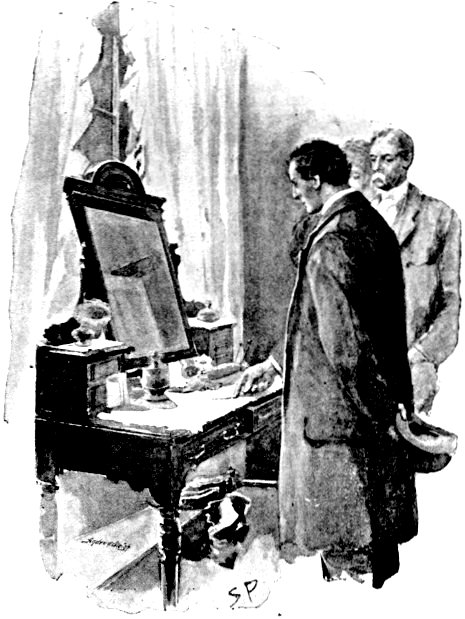
"HEWITT STOOD BEFORE THE DRESSING TABLE."
Hewitt examined the match closely. "It is burnt very little," he remarked. "It would[Pg 315] appear to have gone out at once. Could you hear it struck?"
"I heard nothing whatever; absolutely nothing."
"If you will step into Miss Norris's room now for a moment," Hewitt suggested, "we will try an experiment. Tell me if you hear matches struck, and how many. Where is the match-stand?"
The match-stand proved to be empty, but matches were found in Miss Norris's room, and the test was made. Each striking could be heard distinctly, even with one of the doors pushed to.
"Both your own door and Miss Norris's were open, I understand; the window shut and fastened inside as it is now, and nothing but the brooch was disturbed?"
"Yes, that was so."
"Thank you, Mrs. Cazenove. I don't think I need trouble you any further just at present. I think, Sir James," Hewitt added, turning to the baronet, who was standing by the door—"I think we will see the other room and take a walk outside the house, if you please. I suppose, by-the-bye, that there is no getting at the matches left behind on the first and second occasions?"
"No," Sir James answered. "Certainly not here. The Scotland Yard man may have kept his."
The room that Mrs. Armitage had occupied presented no peculiar feature. A few feet below the window the roof of the billiard-room was visible, consisting largely of skylight. Hewitt glanced casually about the walls, ascertained that the furniture and hangings had not been materially changed since the second robbery, and expressed his desire to see the windows from the outside. Before leaving the room, however, he wished to know the names of any persons who were known to have been about the house on the occasions of all three robberies.
"Just carry your mind back, Sir James," he said. "Begin with yourself, for instance. Where were you at these times?"
"When Mrs. Heath lost her bracelet I was in Tagley Wood all the afternoon. When Mrs. Armitage was robbed, I believe I was somewhere about the place most of the time she was out. Yesterday I was down at the farm." Sir James's face broadened. "I don't know whether you call those suspicious movements?" he added, and laughed.
"Not at all; I only asked you so that, remembering your own movements, you might the better recall those of the rest of the household. Was anybody, to your knowledge—anybody, mind—in the house on all three occasions?"
"Well, you know, it's quite impossible to answer for all the servants. You'll only get that by direct questioning—I can't possibly remember things of that sort. As to the family and visitors—why, you don't suspect any of them, do you?"
"I don't suspect a soul, Sir James," Hewitt answered, beaming genially, "not a soul. You see, I can't suspect people till I know something about where they were. It's quite possible there will be independent evidence enough as it is, but you must help me if you can. The visitors, now. Was there any visitor here each time—or even on the first and last occasions only?"
"No—not one. And my own sister, perhaps you will be pleased to know, was only there at the time of the first robbery."
"Just so. And your daughter, as I have gathered, was clearly absent from the spot each time—indeed, was in company with the party robbed. Your niece, now?"
"Why, hang it all, Mr. Hewitt, I can't talk of my niece as a suspected criminal. The poor girl's under my protection, and I really can't allow—"
Hewitt raised his hand and shook his head deprecatingly.
"My dear sir, haven't I said that I don't suspect a soul? Do let me know how the people were distributed, as nearly as possible. Let me see. It was your niece, I think, who found that Mrs. Armitage's door was locked—this door in fact—on the day she lost her brooch?"
"Yes, it was."
"Just so—at the time when Mrs. Armitage, herself, had forgotten whether she locked it or not. And yesterday—was she out then?"
"No, I think not. Indeed, she goes out very little—her health is usually bad. She was indoors, too, at the time of the Heath robbery, since you ask. But come, now, I don't like this. It's ridiculous to suppose that she knows anything of it."
"I don't suppose it, as I have said. I am only asking for information. That is all your resident family, I take it, and you know nothing of anybody else's movements—except, perhaps, Mr. Lloyd's?"
"Lloyd? Well, you know yourself that he was out with the ladies when the first robbery took place. As to the others, I don't remember. Yesterday he was probably in his room, writing. I think that acquits him, eh?" Sir James looked quizzically into the[Pg 316] broad face of the affable detective, who smiled and replied:—
"Oh, of course, nobody can be in two places at once, else what would become of the alibi as an institution? But as I have said, I am only setting my facts in order. Now, you see, we get down to the servants—unless some stranger is the party wanted. Shall we go outside now?"
Lenton Croft was a large, desultory sort of house, nowhere more than three floors high, and mostly only two. It had been added to bit by bit till it zig-zagged about its site, as Sir James Norris expressed it, "like a game of dominoes." Hewitt scrutinized its external features carefully as they strolled round, and stopped some little while before the windows of the two bedrooms he had just seen from the inside. Presently they approached the stables and coach-house, where a groom was washing the wheels of the dog-cart.
"Do you mind my smoking?" Hewitt asked Sir James. "Perhaps you will take a cigar yourself—they are not so bad, I think. I will ask your man for a light."
Sir James felt for his own match-box, but Hewitt had gone, and was lighting his cigar with a match from a box handed him by the groom. A smart little terrier was trotting about by the coach-house, and Hewitt stooped to rub its head. Then he made some observation about the dog, which enlisted the groom's interest, and was soon absorbed in a chat with the man. Sir James, waiting a little way off, tapped the stones rather impatiently with his foot, and presently moved away.
For full a quarter of an hour Hewitt chatted with the groom, and when at last he came away and overtook Sir James, that gentleman was about re-entering the house.
"I beg your pardon, Sir James," Hewitt said, "for leaving you in that unceremonious fashion to talk to your groom, but a dog, Sir James—a good dog—will draw me anywhere."
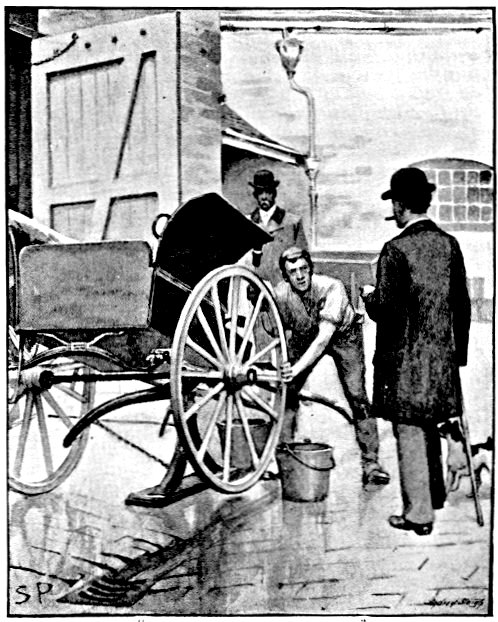
"HEWITT CHATTED WITH THE GROOM."
"Oh," replied Sir James, shortly.
"There is one other thing," Hewitt went on, disregarding the other's curtness, "that I should like to know: There are two windows directly below that of the room occupied yesterday by Mrs. Cazenove—one on each floor. What rooms do they light?"
"That on the ground floor is the morning-room; the other is Mr. Lloyd's—my secretary. A sort of study or sitting-room."
"Now, you will see at once, Sir James," Hewitt pursued, with an affable determination to win the baronet back to good humour, "you will see at once that if a ladder had been used in Mrs. Heath's case, anybody looking from either of these rooms would have seen it."
"Of course. The Scotland Yard man questioned everybody as to that, but nobody seemed to have been in either of the rooms when the thing occurred; at any rate, nobody saw anything."
"Still, I think I should like to look out of those windows myself; it will, at least, give me an idea of what was in view[Pg 317] and what was not, if anybody had been there."
Sir James Norris led the way to the morning-room. As they reached the door, a young lady, carrying a book and walking very languidly, came out. Hewitt stepped aside to let her pass, and afterwards said, interrogatively: "Miss Norris—your daughter, Sir John?"
"No, my niece. Do you want to ask her anything? Dora, my dear," Sir James added, following her in the corridor, "this is Mr. Hewitt, who is investigating these wretched robberies for me. I think he would like to hear if you remember anything happening at any of the three times."
The lady bowed slightly, and said in a plaintive drawl: "I, uncle? Really, I don't remember anything; nothing at all."
"You found Mrs. Armitage's door locked, I believe," asked Hewitt, "when you tried it, on the afternoon when she lost her brooch?"
"Oh, yes; I believe it was locked. Yes, it was."
"Had the key been left in?"
"The key? Oh, no! I think not; no."
"Do you remember anything out of the common happening—anything whatever, no matter how trivial—on the day Mrs. Heath lost her bracelet?"
"No, really I don't. I can't remember at all."
"Nor yesterday?"
"No, nothing. I don't remember anything."
"Thank you," said Hewitt, hastily; "thank you. Now the morning-room, Sir James."
In the morning-room Hewitt stayed but a few seconds, doing little more than casually glance out of the windows. In the room above he took a little longer time. It was a comfortable room, but with rather effeminate indications about its contents. Little pieces of draped silk-work hung about the furniture, and Japanese silk fans decorated the mantelpiece. Near the window was a cage containing a grey parrot, and the writing-table was decorated with two vases of flowers.
"Lloyd makes himself pretty comfortable, eh?" Sir James observed. "But it isn't likely anybody would be here while he was out, at the time that bracelet went."
"No," replied Hewitt, meditatively. "No, I suppose not."
He stared thoughtfully out of the window, and then, still deep in thought, rattled at the wires of the cage with a quill tooth-pick and played a moment with the parrot. Then looking up at the window again, he said: "That is Mr. Lloyd, isn't it, coming back in a fly?"
"Yes, I think so. Is there anything else you would care to see here?"
"No, thank you," Hewitt replied; "I don't think there is."
They went down to the smoking-room, and Sir James went away to speak to his secretary. When he returned, Hewitt said, quietly, "I think, Sir James—I think that I shall be able to give you your thief presently."
"What! Have you a clue? Who do you think? I began to believe you were hopelessly stumped."
"Well, yes. I have rather a good clue, although I can't tell you much about it just yet. But it is so good a clue that I should like to know now whether you are determined to prosecute, when you have the criminal?"
"Why, bless me, of course," Sir James replied, with surprise. "It doesn't rest with me, you know—the property belongs to my friends. And even if they were disposed to let the thing slide, I shouldn't allow it—I couldn't, after they had been robbed in my house."
"Of course, of course. Then, if I can, I should like to send a message to Twyford by somebody perfectly trustworthy—not a servant. Could anybody go?"
"Well, there's Lloyd, although he's only just back from his journey. But if it's important, he'll go."
"It is important. The fact is, we must have a policeman or two here this evening, and I'd like Mr. Lloyd to fetch them without telling anybody else."
Sir James rang, and, in response to his message, Mr. Lloyd appeared. While Sir James gave his secretary his instructions, Hewitt strolled to the door of the smoking-room, and intercepted the latter as he came out.
"I'm sorry to give you this trouble, Mr. Lloyd," he said, "but I must stay here myself for a little, and somebody who can be trusted must go. Will you just bring back a police-constable with you?—or rather two—two would be better. That is all that is wanted. You won't let the servants know, will you? Of course, there will be a female searcher at the Twyford police-station? Ah—of course. Well, you needn't bring her, you know. That sort of thing is done at the station." And chatting thus confidentially, Martin Hewitt saw him off.
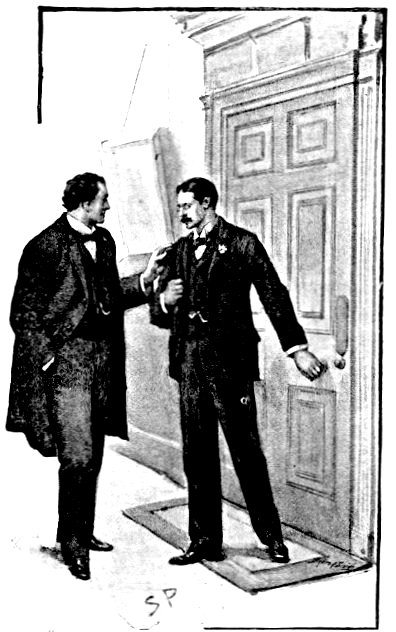
"I AM SORRY TO GIVE YOU THE TROUBLE, MR. LLOYD."
When Hewitt returned to the smoking-room Sir James said, suddenly, "Why, bless my soul, Mr. Hewitt, we haven't fed you! I'm awfully sorry. We came in rather late for lunch, you know, and this business has bothered me so, I clean forgot everything else. There's no dinner till seven, so you'd better let me give you something now. I'm really sorry. Come along."
"Thank you, Sir James," Hewitt replied; "I won't take much. A few biscuits, perhaps, or something of that sort. And, by-the-bye, if you don't mind, I rather think I should like to take it alone. The fact is, I want to go over this case thoroughly by myself. Can you put me in a room?"
"Any room you like. Where will you go? The dining-room's rather large, but there's my study, that's pretty snug, or—"
"Perhaps I can go into Mr. Lloyd's room for half an hour or so—I don't think he'll mind, and it's pretty comfortable."
"Certainly, if you'd like. I'll tell them to send you whatever they've got."
"Thank you very much. Perhaps they'll also send me a lump of sugar and a walnut—it's—it's just a little fad of mine."
"A—what? A lump of sugar and a walnut?" Sir James stopped for a moment, with his hand on the bell-rope. "Oh, certainly, if you'd like it; certainly," he added, and stared after this detective of curious tastes as he left the room.
When the vehicle, bringing back the secretary and the policemen, drew up on the drive, Martin Hewitt left the room on the first floor and proceeded downstairs. On the landing he met Sir James Norris and Mrs. Cazenove, who stared with astonishment on perceiving that the detective carried in his hand the parrot-cage.
"I think our business is about brought to a head now," Hewitt remarked, on the stairs. "Here are the police-officers from Twyford." The men were standing in the hall with Mr. Lloyd, who, on catching sight of the cage in Hewitt's hand, paled suddenly.
"This is the person who will be charged, I think," Hewitt pursued, addressing the officers, and indicating Lloyd with his finger.
"What, Lloyd?" gasped Sir James, aghast. "No—not Lloyd—nonsense!"
"He doesn't seem to think it nonsense himself, does he?" Hewitt placidly observed. Lloyd had sunk on a chair, and, grey of face, was staring blindly at the man he had run against at the office door that morning. His lips moved in spasms, but there was no sound. The wilted flower fell from his button-hole to the floor, but he did not move.
"This is his accomplice," Hewitt went on, placing the parrot and cage on the hall table, "though I doubt whether there will be any use in charging him. Eh, Polly?"
The parrot put its head aside and chuckled. "Hullo, Polly!" it quietly gurgled. "Come along!"
Sir James Norris was hopelessly bewildered. "Lloyd—Lloyd—" he said, under his breath, "Lloyd—and that!"
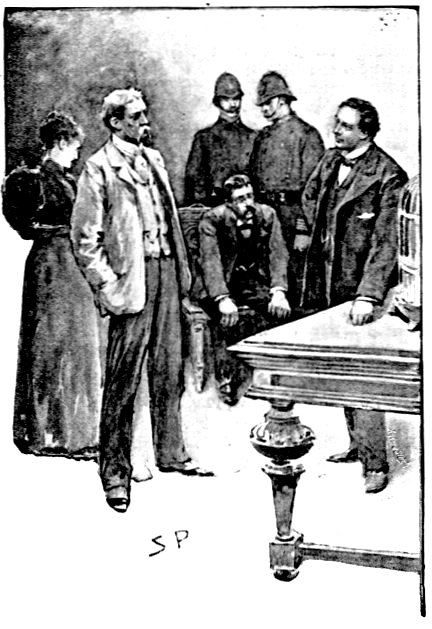
"SIR JAMES NORRIS WAS HOPELESSLY BEWILDERED."
"This was his little messenger, his useful Mercury," Hewitt explained, tapping the cage complacently; "in fact, the actual lifter. Hold him up."
The last remark referred to the wretched Lloyd, who had fallen forward with something between a sob and a loud sigh. The policemen took him by the arms and propped him in his chair.
"System?" said Hewitt, with a shrug of the shoulders an hour or two after, in Sir James's study. "I can't say I have a system. I call it nothing but common-sense and a sharp pair of eyes. Nobody using these could help taking the right road in this case. I began at the match, just as the Scotland Yard man did, but I had the advantage of taking a line through three cases. To begin with, it was plain that that match, being left there in daylight, in Mrs. Cazenove's room, could not have been used to light the table-top, in the full glare of the window; therefore it had been used for some other purpose—what purpose I could not, at the moment, guess. Habitual thieves, you know, often have curious superstitions, and some will never take anything without leaving something behind—a pebble or a piece of coal, or something like that—in the premises they have been robbing. It seemed at first extremely likely that this was a case of that kind. The match had clearly been brought in—because when I asked for matches there were none in the stand—not even an empty box; and the room had not been disturbed. Also the match probably had not been struck there, nothing having been heard, although, of course, a mistake in this matter was just possible. This match then, it was fair to assume, had been lit somewhere else and blown out immediately—I remarked at the time that it was very little burnt. Plainly it could not have been treated thus for nothing, and the only possible object would have been to prevent it igniting accidentally. Following on this it became obvious that the match was used, for whatever purpose, not as a match, but merely as a convenient splinter of wood.
"So far so good. But on examining the match very closely I observed—as you can see for yourself—certain rather sharp indentations in the wood. They are very small, you see, and scarcely visible, except upon narrow inspection; but there they are, and their positions are regular. See—there are two on each side, each opposite the corresponding mark of the other pair. The match, in fact, would seem to have been gripped in some fairly sharp instrument, holding it at two points above, and two below—an instrument, as it may at once strike you, not unlike the beak of a bird.
"Now, here was an idea. What living creature but a bird could possibly have entered Mrs. Heath's window without a ladder—supposing no ladder to have been used—or could have got into Mrs. Armitage's window without lifting the sash higher than the eight or ten inches it was already open? Plainly, nothing. Further, it is significant that only one article was stolen at a time, although others were about. A human being could have carried any reasonable number, but a[Pg 320] bird could only take one at a time. But why should a bird carry a match in its beak? Certainly it must have been trained to do that for a purpose, and a little consideration made that purpose pretty clear. A noisy, chattering bird would probably betray itself at once. Therefore it must be trained to keep quiet both while going for and coming away with its plunder. What readier or more probably effectual way than, while teaching it to carry without dropping, to teach it also to keep quiet while carrying? The one thing would practically cover the other.
"I thought at once, of course, of a jackdaw or a magpie—these birds' thievish reputations made the guess natural. But the marks on the match were much too wide apart to have been made by the beak of either. I conjectured, therefore, that it must be a raven. So that when we arrived near the coach-house I seized the opportunity of a little chat with your groom on the subject of dogs and pets in general, and ascertained that there was no tame raven in the place. I also, incidentally, by getting a light from the coach-house box of matches, ascertained that the match found was of the sort generally used about the establishment—the large, thick, red-topped English match. But I further found that Mr. Lloyd had a parrot which was a most intelligent pet, and had been trained into comparative quietness—for a parrot. Also, I learnt that more than once the groom had met Mr. Lloyd carrying his parrot under his coat—it having, as its owner explained, learnt the trick of opening its cage-door, and escaping.
"I said nothing, of course, to you of all this, because I had as yet nothing but a train of argument and no results. I got to Lloyd's room as soon as possible. My chief object in going there was achieved when I played with the parrot, and induced it to bite a quill tooth-pick.
"When you left me in the smoking-room I compared the quill and the match very carefully, and found that the marks corresponded exactly. After this I felt very little doubt indeed. The fact of Lloyd having met the ladies walking before dark on the day of the first robbery proved nothing, because, since it was clear that the match had not been used to procure a light, the robbery might as easily have taken place in daylight as not—must have so taken place, in fact, if my conjectures were right. That they were right I felt no doubt. There could be no other explanation.
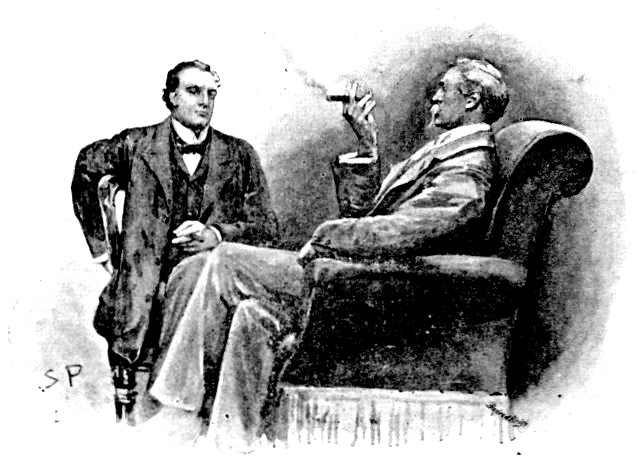
"EXPLAINING."
"When Mrs. Heath left her window open and her door shut, anybody climbing upon the open sash of Lloyd's high window could have put the bird upon the sill above. The match placed in the bird's beak for the purpose I have indicated and struck first, in case by accident it should ignite by rubbing against something and startle the bird—this match would, of course, be dropped just where the object to[Pg 321] be removed was taken up; as you know, in every case the match was found almost upon the spot where the missing article had been left—scarcely a likely triple coincidence, had the match been used by a human thief. This would have been done as soon after the ladies had left as possible, and there would then have been plenty of time for Lloyd to hurry out and meet them before dark—especially plenty of time to meet them coming back, as they must have been, since they were carrying their ferns. The match was an article well chosen for its purpose, as being a not altogether unlikely thing to find on a dressing-table, and, if noticed, likely to lead to the wrong conclusions adopted by the official detective.
"In Mrs. Armitage's case, the taking of an inferior brooch and the leaving of a more valuable ring pointed clearly either to the operator being a fool or unable to distinguish values, and certainly, from other indications, the thief seemed no fool. The door was locked, and the gasfitter, so to speak, on guard, and the window was only eight or ten inches open and propped with a brush. A human thief entering the window would have disturbed this arrangement, and would scarcely risk discovery by attempting to replace it, especially a thief in so great a hurry as to snatch the brooch up without unfastening the pin. The bird could pass through the opening as it was, and would have to tear the pincushion to pull the brooch off—probably holding the cushion down with its claw the while.
"Now, in yesterday's case we had an alteration of conditions. The window was shut and fastened, but the door was open—but only left for a few minutes, during which time no sound was heard either of coming or going. Was it not possible, then, that the thief was already in the room, in hiding, while Mrs. Cazenove was there, and seized its first opportunity on her temporary absence? The room is full of draperies, hangings, and what-not, allowing of plenty of concealment for a bird, and a bird could leave the place noiselessly and quickly. That the whole scheme was strange mattered not at all. Robberies presenting such unaccountable features must have been effected by strange means of one sort or another. There was no improbability—consider how many hundreds of examples of infinitely higher degrees of bird-training are exhibited in the London streets every week for coppers.
"So that, on the whole, I felt pretty sure of my ground. But before taking any definite steps, I resolved to see if Polly could not be persuaded to exhibit his accomplishments to an indulgent stranger. For that purpose I contrived to send Lloyd away again and have a quiet hour alone with his bird. A piece of sugar, as everybody knows, is a good parrot bribe; but a walnut, split in half, is a better—especially if the bird be used to it; so I got you to furnish me with both. Polly was shy at first, but I generally get along very well with pets, and a little perseverance soon led to a complete private performance for my benefit. Polly would take the match, mute as wax, jump on the table, pick up the brightest thing he could see, in a great hurry, leave the match behind, and scuttle away round the room; but at first wouldn't give up the plunder to me. It was enough. I also took the liberty, as you know, of a general look round, and discovered that little collection of Brummagem rings and trinkets that you have just seen—used in Polly's education, no doubt. When we sent Lloyd away it struck me that he might as well be usefully employed as not, so I got him to fetch the police—deluding him a little, I fear, by talking about the servants and a female searcher. There will be no trouble about evidence—he'll confess; of that I'm sure. I know the sort of man. But I doubt if you'll get Mrs. Cazenove's brooch back. You see, he has been to London to-day, and by this the swag is probably broken up."
Sir James listened to Hewitt's explanation with many expressions of assent and some of surprise. When it was over he smoked a few whiffs and then said: "But Mrs. Armitage's brooch was pawned; and by a woman."
"Exactly. I expect our friend Lloyd was rather disgusted at his small luck—probably gave the brooch to some female connection in London, and she realized on it. Such persons don't always trouble to give a correct address."
The two smoked in silence for a few minutes, and then Hewitt continued: "I don't expect our friend has had an easy job altogether with that bird. His successes at most have only been three, and I suspect he had many failures and not a few anxious moments that we know nothing of. I should judge as much merely from what the groom told me of frequently meeting Lloyd with his parrot. But the plan was not a bad one—not at all. Even if the bird had been caught in the act, it would only have been 'That mischievous parrot!' you see. And his master would only have been looking for him."
From the French of Madame Émile de Girardin.
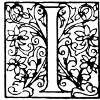
It was a magnificent palace, built on the side of a broad highway, along which a great number of travellers passed every day.
This palace had an elegant façade on each of its four sides; a colonnade supported by admirable columns surrounded it. It is true that this colonnade prevented the entrance of any light into the palace; but the exterior view of it was so beautiful that nobody ventured to criticise it objectively; besides, what need of daylight has anybody in a palace? Have they not lustres and candelabra? Why trouble themselves about the sun, then? Every portion of the dome of this palace was gilded, and produced a most dazzling effect.
The queen who lived in this dwelling-place was a tall and handsome woman, who, instead of a heart, had in her bosom a large diamond cut in the form of a heart; it was believed to be on that account that she had never loved.
On the front of her palace were written these words in ruby letters:
"Here You May Obtain Whatever You May Wish For."
A young man passing along the road stopped to look at this superb monument, and having perceived this sign—for it bore a strong resemblance to a sign—he suddenly exclaimed:—
"Faith, I'd like to go inside! I'm tired of being in the condition I'm in, and should not be sorry to be something else."
As he went towards one of the porticos, he noticed a beggar seated near it on a stone and laughing.
"You are laughing at me, old fellow," said the young wayfarer; "but I give you back your laugh; for you must be a fool to remain in rags at the door of a palace where you have only to wish for a new coat to be dressed like a prince. Perhaps you don't know how to read?"
"Oh, yes!—I know how to read—even writing in rubies," replied the old man.
"Well, then, have you nothing to desire, that you do not enter this palace?"
"Truly, yes. I desire more things than one; but not any such as they give away here."
The old man had such an air of cunning as he said this, that the young man mistrusted him.
"He is laying some kind of trap for me," he thought, and was about passing on his way.
"Don't be afraid; no harm will come to you in this palace," the old man went on. "Troubles exist there only for those who ask for them: take my word for it, you may go in fearlessly."
"Yes; but may I come out again?"
"Certainly you may," replied the beggar, "if you find nothing there you wish for."
The young man hesitated. He saw a number of people pass along the road, and not one of them seemed to have an idea of entering this palace. That struck him as being suspicious, and he took alarm.
"Is this palace shunned by travellers? How comes it that not one enters it?"
"It is because they have heard about it; they know that people are bored there, and, in his home, everybody likes to amuse himself." Seeing that the young man was curious to visit this monument, the old beggar said to him: "I'll tell you what I'll do; if you'll give me the price of a bottle of good wine, I'll sacrifice myself and go in with you—and we'll laugh together at the imbeciles who live there."
"Agreed!" cried the young man.
He gave the old beggar a piece of money, and they went up to the door. It was made of crystal, and afforded a view of the interior and of the bell which had to be rung to obtain admission.
On examining it carefully, the young traveller observed that this bell was made of gold, and had for its clapper a fine pear-shaped pearl, of such beauty that it dazzled his sight.
He stood motionless, gazing at it.
"Ring!" cried the old beggar, becoming impatient at length.
"Really, I dare not," replied the young man; "I am afraid of injuring this beautiful pearl by ringing the bell. It would be such a pity; it is so admirable!"
"Bah!" cried the beggar, who knew very little about jewels, "let me do it—I'm not afraid."
"No, no; let us rather knock at the door——"
But he stopped himself; for it occurred to him that, as this handsome door was made of crystal, a blow with the knocker would at least crack it.
Tired by these hesitations, the old beggar seized the knocker and struck so heavy a blow with it that the door was shivered into fragments.
They entered freely.
There was nobody in the vestibule; in the Palace of Vanity nobody would remain in the ante-chamber. And yet this ante-chamber surpassed in luxury many drawing rooms. It was adorned with statues representing gods and goddesses, and pictures representing kings and queens, princes and princesses.
It was paved with jasper and porphyry; but this pavement was so highly polished, so slippery, that the young man, whose shoes were studded with hobnails, was near falling several times within the space of three minutes. He was obliged to cling to the walls, and would rather have walked upon ice, as then he might have had on a pair of skates.
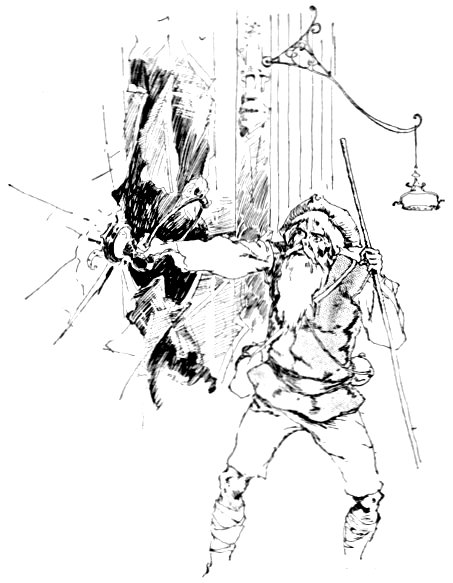
"THE DOOR WAS SHIVERED INTO FRAGMENTS."
The old man also slipped a little, but his beggar's staff supported him.
After much difficulty they at length reached a vast room, in which a number of persons were assembled. Their costumes were magnificent; the women were covered with jewellery. They had jewels even on their rich Court mantles, which trailed along the carpet; their bracelets, their necklaces, their diadems were dazzling. The young traveller, whom we shall henceforth call Alméric, was delighted by the sight.
The men were not much less splendidly decorated than the women in this drawing-room: they wore coats of velvet embroidered with diamonds, and on their heads caps, each ornamented with four ostrich feathers worthy to adorn the hat of a queen.
"Who are these great personages?" Alméric asked the beggar.
"These are the domestics of the house," he replied.
Indeed, as soon as these princes saw the two travellers enter, they came to them to take their orders, and to ask whether they desired to visit the palace.
"Phew!" said Alméric to himself, "here are indeed some well-kept people!" But fear of being indiscreet made him say aloud: "Perhaps we should be incommoding the inhabitants of this palace, by visiting them at this hour; perhaps——"
"Incommode the inhabitants of the Palace of Vanity!" cried the beggar, ironically; "I defy you to do it, young man!—they are here only to show themselves, and they are never troubled by people coming to admire them: you might as well be afraid of incommoding actors by going to the theatre to see them."
The young man could not refrain from laughing at this reflection.
"Show us the wonders of the palace," the old man said to the attendants. "Here is a traveller who desires to live here; but, before expressing his wishes, he wants to know something about you. Go before and conduct us."
The young traveller was greatly surprised at the old beggar's off-hand treatment of these superb valets, and at their readiness to obey him; he did not know that the philosopher's vanity takes the pas of all others. So many things astonished him that he dare not ask any more questions.
A fat woman of ripe age, who filled the functions of housekeeper, at once stepped forward and handed the keys of the house to the valet who was to conduct the two guests. Alméric saw behind her two little pages who were bearing her mantle, and whom the enormity of her bulk had at first entirely hidden from his sight.
These two pages no more quitted her than her shadow. It was a prerogative of her rank not to be able to take a single step, or perform a single act, without the attendance of these two babe-kins.
Her eagerness to obey the beggar made her forget her two little gendarmes, and she advanced so quickly, without warning them, that they did not think of following her, and held on so firmly to her mantle that, in hurrying forward, she pulled them both down upon their noses, while she herself was jerked upon her back. As she was very heavy, she hurt herself considerably, and the other servants hastened to her assistance.
"A Court mantle," said the beggar, "does not appear to me very commodious for housework."
And the young traveller could not refrain from laughing at this reflection.
One of the lackeys having taken up a candelabrum, conducted the strangers through the vast apartments of the palace. They reached the dining-room.
"Do you wish to sup, gentlemen?"
"By all means," said the beggar; "there is nothing but a good meal which is not a vanity."
He seated himself at table. But he had hardly tasted any of the dishes set before him, than he found them so fanciful, so salted, peppered, sugared, truffled, and mixed, that he would not partake of one of them; impossible to recognise the meat of a single animal, so highly was it seasoned.
"What is this?" asked the old man—"rabbit?"
"No, monsieur—they are lamb cutlets."
"And this: lentil soup?"
"No, monsieur; hare soup."
It was a confusion, past all understanding. And yet more: everything served was cold, for the hot-water plates were all of malachite, and nobody dare pour hot water into them.
"Faith," said the beggar, "I'd rather have an omelette on a pewter platter," and he handed to a servant in waiting his gilded plate. The servant in bowing to take it took no heed of the candles burning on the table, and forgot all about the plumes which adorned his head. They approached too near the flame, and a strong odour of burnt feathers announced that the plume was grilling.
"A white panaché does not appear to me to be convenient for waiting at table," said the beggar again; and again the young[Pg 325] stranger could not refrain from laughing at this reflection.
"The queen of this mansion, the Princess Vanita, is not here at present, is she?" asked the beggar.
"No, monsieur," replied one of the lackeys; "she is, at this moment, with her favourite adorers, in a country the name of which I forget, but which is highly renowned for its wines."
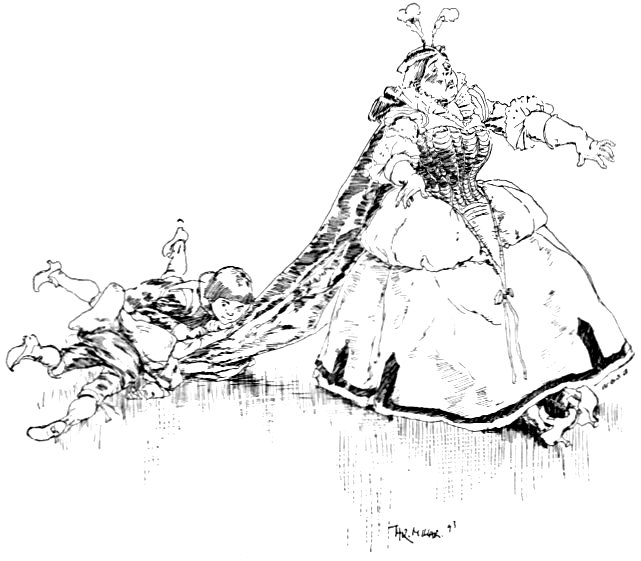
"SHE PULLED THEM BOTH DOWN UPON THEIR NOSES."
"Ah! I guess she is in France," said the beggar: "she will not soon be back."
Perched on a rich rod, a handsome paroquet was screeching at some distance from the table: "Fly quickly! fly quickly! Don't stop in this palace!"
Alméric went over to her.
"Why should we fly?" he asked: "are you not happy here?"
"Alas!—look at me," replied the paroquet; "I wished to be beautiful: I desired claws of gold, ruby wings; and now I am condemned to rest here all my life, motionless, as you see; for it is impossible to fly with wings made of rubies or to walk with feet made of gold."
Near the window they observed a large cat. It did not stir from where it lay, and appeared to be very discontented.
"What is the matter with you, puss?" inquired Alméric.
"Excuse me," replied the cat, "is it a horse, a serpent, a donkey, a man, or a woman to whom I have the honour of speaking? I can't see; pray excuse me."
"You are blind?" said Alméric, compassionately.
"Alas! yes, monsieur—and by my own fault. I had so long heard emerald eyes praised that I wished for them, and ever since that time have lost my sight. I do not even know whether my eyes are as pretty as they have been said to be. Will you be so kind as to tell me what is your impression on the subject? Look at me. Do you think that emerald eyes go well with my face?"
Alméric wished to say that he thought her eyes beautiful, to console her for having lost her sight, but the old beggar was inexorable.
"Your eyes are abominably ugly!" he said, roughly.
"Impossible!" replied the cat. "They must shine?"
"No!" cried the old man; "nothing shines out of its place! Take my advice—hide them, put on spectacles; and if ever[Pg 326] you have any more emeralds, make them into rings and not into eyes."
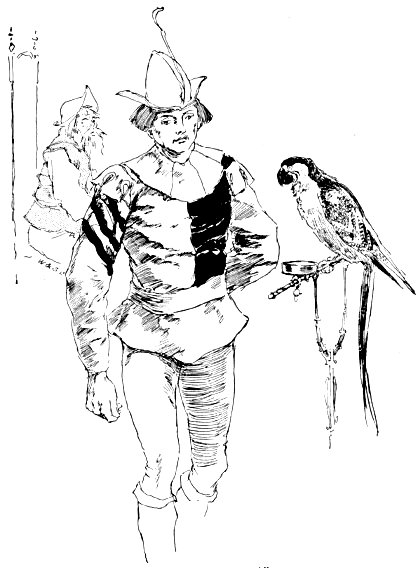
"FLY QUICKLY!"
And, once more, the young man could not refrain from laughing at this reflection.
On quitting the dining-room, they entered a superb court paved in mosaic and surrounded by elegant columns.
They there perceived a bird which, by its plumage, might have been taken for a vulture, but whose timid bearing had nothing of the bird of prey in it.
"There is a vulture that, to me, has a very stupid look," observed the beggar. "Who are you, old fellow?" he added, addressing the vulture.
"I am a vulture, a bird of prey; formerly a turkey, a farmyard bird. I wished to mount in rank and quit the sphere in which I won nothing but disrespect; but I repent—repent the change—for I cannot bring myself to devour them."
"Devour whom?" cried Alméric.
"Alas! those good turkeys who have always been so kind to me."
"Ninny!" exclaimed the old beggar, "why did you get yourself turned into a vulture? Better to be a turkey and liked, than a vulture—and timid."
And again the young man could not refrain from laughing at this reflection.
In one corner of the court there was a bear seated on a bench, his head bowed down upon his chest and plunged in profound meditation.
"There's a fellow, too, who does not seem to know much about the business of a bear," remarked the beggar. "How did he come to be in this palace? What vanity has pushed him into the bear profession? I'd lay a wager he once had a better."
The beggar approached the melancholy animal.
"Bear," he asked, "what were you before you got yourself transformed into your present shape?"
"I was a doctor's assistant."
"A doctor's assistant!" repeated Alméric and the beggar in the same breath.
"Yes, a doctor's assistant," replied the bear; "but everybody made fun of my position. Men pursued me with their irony, made songs about me, burlesqued me on the stage. I wished to escape them, and had myself turned into a bear; but I am tired of my condition. I was not born for solitude."
"You old fool!" cried the beggar, angrily, "why did you leave the calling you were in? You might have avenged yourself on the men you detest; for you do not appear to me to be very learned, and you might have poisoned the universe with your drugs and your blunders."
The beggar was still speaking, when his attention was attracted by a gigantic elephant in an adjoining court.
"An elephant!" he cried. "Who can have asked to be turned into an elephant? an ant, I'll wager."
However, the old man was mistaken; it was not an ant that had desired to be turned into an elephant: it was a rabbit. He had only recently obtained that signal favour, and was still puffed up with pride at his metamorphosis.
He was walking about heavily, and with an air of importance, and received condescendingly all the compliments addressed to him on his new promotion.
The beggar, having learned his history, advanced towards him familiarly.
"Good-day, bunny!" he said. "Well, how do you like your big skin?"
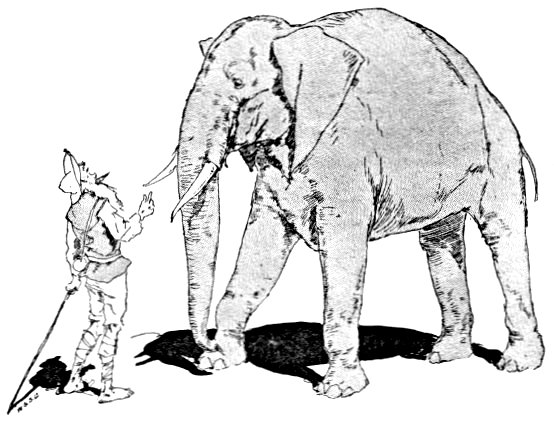
"'AN ELEPHANT!' HE CRIED."
The elephant was greatly shocked at this disrespectful tone; but the small practice he had had in the use of his trunk prevented him from seeking to avenge himself.
"Thoroughly—as you see," he replied, strutting.
"Is it long since you asked this favour?" inquired the beggar, maliciously.
"No," replied the elephant; "a few days ago only; as an old rabbit, I had incontestable claims. I have really only changed in form: my colour remains the same; my ears, instead of standing up, now fall down—that is the only difference."
"The idiot!" thought the beggar; "he does not even believe himself to have been changed!"
"Tell me, my dear fellow," said Alméric, who was greatly amused by the rabbit's stupidity, "don't you find your ordinary habits somewhat deranged?"
"You remind me," replied the rabbit, as if suddenly struck by an idea: "I am afraid I shall find my increased bulk inconvenient, on returning to my burrow this evening."
This time the young man could not possibly refrain from laughing at that reflection.
"Would you like to see the beautiful woman, gentlemen?" asked the lackey who was conducting them.
"Yes, yes," replied Alméric, eagerly. "I should like to see the 'beautiful woman.' Where is she?"
"This way, gentlemen. Be good enough to enter this boudoir."
They passed into a charming room, formed entirely of looking-glasses—the ceiling, the wainscotting, all was of looking-glass, in which one could admire oneself from every point of view.
The beautiful woman was lying upon a sofa. On beholding her, the beggar and Alméric fell back in horror. This beautiful woman was a monstrosity, but believed herself to be a chef d'œuvre.
Every part of her was beautiful, and yet she appeared horrible; because the exaggeration of beauties makes a hideous ensemble; because it is harmony which gives grace to things we admire, movement which gives life; and this beautiful woman had neither grace nor movement.
She had been born very pretty, but the excess of her vanity, and her coquetry, had made her lose all her advantages. She was beautiful as Nature had created her; she wished to be beautiful as beauty is painted: she exaggerated all her graces and changed them into deformities.
She asked for silken hair—she had long locks of silk, without life or colour; she desired to have teeth of pearl, and her teeth appeared horrible: she wished for a wasp-waist, and her body, drawn in by a tight belt, was without grace or suppleness, and looked as if it might snap in two at any moment; she asked for hands of alabaster, and her hands became dull and cold; she desired to have the feet of a child, and these deformed feet were not strong[Pg 328] enough to sustain the weight of her body or to permit her to walk. Nothing more hideous was ever seen: it was ideal ugliness.
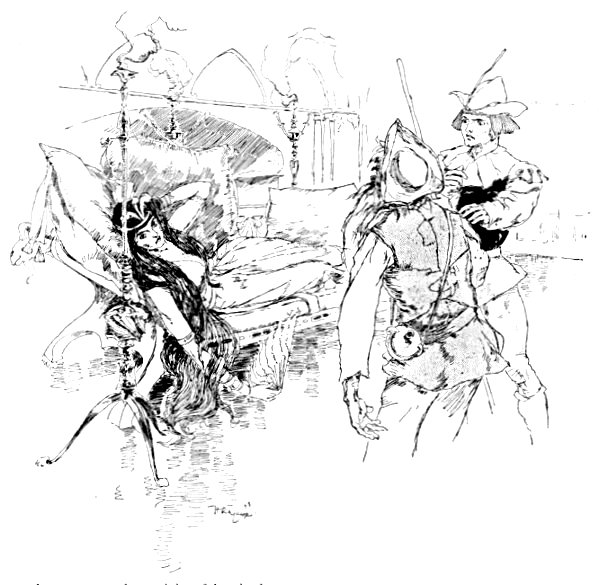
"A BEAUTIFUL WOMAN WAS LYING UPON A SOFA."
"Thousand centimes!" exclaimed the beggar; "how horrible this 'beautiful woman' is!—the sight of her makes me in love again with my old wife!"
Evening being come, a sleeping apartment was offered the strangers for the night.
"A room here will be better than any I can get at an inn," thought Alméric, following the valet, who conducted him to a magnificent bedroom prepared for travellers.
Exhausted by the fatigues of the day, he lost no time in undressing and getting into bed. But he had scarcely stretched himself before beginning to utter loud cries of distress.
"Horror! my skin is being torn from my body! I am in torture! What is the meaning of it? A perfidy! An abominable piece of cruelty!" and a thousand like complaints: and yet all he complained of arose from nothing but the admirable care which had been taken with his bed.
The sheets which covered it were of the finest Indian muslin, embroidered with gold spangles, charming to look upon, but inappreciable by a person used to lie upon sheets of coarse Holland. It takes time to get accustomed to inconveniences of this sort.
Poor Alméric's feet were scratched all over. Every movement he made in getting out of this terrible bed tore his skin; his arms were covered with blood.
"Vanity of vanities!" he cried. "Old man, beggar, let us fly from this place; there is no sleeping in this palace, and I am dying for want of sleep."
"What do you think of sheets embroidered with gold spangles?" asked the old man, laughing. "Could you have a more superb bed to sleep in?"
"Let us get out of this place," cried the young traveller, who was in no jesting mood; "I'll not remain here another hour. The men here are all stupid, the women frightful; one can neither eat here nor sleep. Let us be off, old man—let us be off instantly!"
Alméric, who had hastily redressed himself,[Pg 329] roughly pushed the beggar out of the room, the old man laughing heartily all the while, and they quitted the palace together, taking the way to the beggar's hovel.
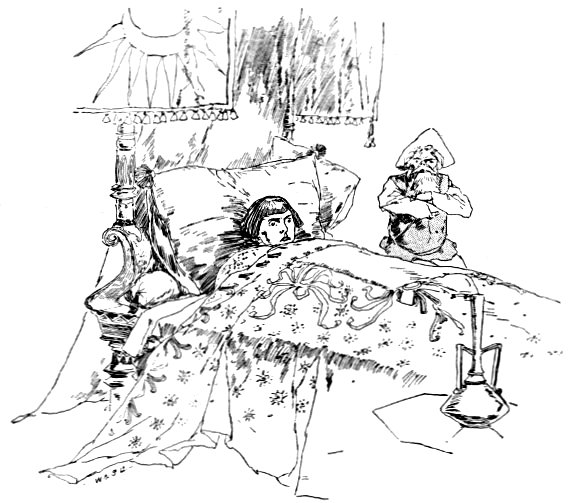
"I AM IN TORTURE!"
"Sleep here," said the old man, pointing to his truckle bed; "this mattress is favourable to sleep, and your rest will not be disturbed by spangled sheets—because there are no sheets of any kind. But what does that matter?—it is sleep that makes good beds, as it is appetite that makes good meals."
Alméric threw himself on to the beggar's bed and was soon sound asleep; and the old man heard him cry out in his dreams:—
"It is all over! I wished to obtain the embassy to Constantinople; but I will remain a simple notary at Saint-Quentin."
And the beggar, in his turn, could not refrain from laughing at this reflection.
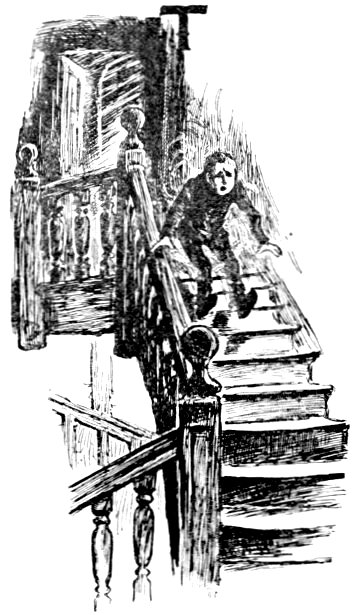
There was a rushing, whirling agitation in the air—the dust rose from every ledge and revolved wildly as a something passed down the intricacies of the old back staircase—passed too rapidly for recognition. It was the page, pale and breathless, hurling himself from the top floor toward the servants' hall.
"There's that ghost agen!" he gasped. "It's up there a-furridgin among the lumber in the loft! It is—I 'eard it myself, I tell yer! Yer may say 'pooh' if yer like. Yer'd better go an' see!"
The housekeeper, being the bravest of those who heard, went up to see. There certainly were unusual sounds in the vast and lonely lofts under the roof. Cautiously she peeped in; and there was the Squire with a candle ferreting about among the dusty heaps of lumber.
"Mrs. Wriggs," said the Squire, "there are a great many useless things here which we shall never want. I've been thinking that we might as well——"
"Yes, sir; no doubt there are many poor people who could turn them to some use," said Mrs. Wriggs. "And we might do worse than give them——"
"Give them!" said the Squire. "Doesn't it seem rather like bad taste to give away things which Providence has presented to us? Wouldn't it be taken as a sort of slight? I was thinking that we might sell them, now—for the good of the House, of course." The Squire represented the house: he did a great many things for the good of it—the temporal good, of course.
"Eh? Who would buy?" said the Squire. "If a thing is good enough to accept, Mrs. Wriggs, it has some value; what has a value is worth buying. Let us collect all the articles we have no further use for, and obtain the highest price for them, by way of showing to that Providence which has bestowed them upon us that they have a value in our eyes. I will accompany you downstairs, and see what broken saucepans and other utensils there may be there. Every little helps, in a good cause."
So the articles were looked out—saucepans with holes in them, handles of flat-irons, chairs without legs, old packing-cases, book covers, old advertisement sheets of old newspapers, and so forth; and a "rummage sale" was held at the Big House. The whole village attended, and, as a compliment to the Squire, bought up the articles in lots, at a few pence per lot. The Squire had never held aloof from his dependents; it being a belief that we should, to a certain extent, share our good things with our poorer brethren.
But next day the Squire was rummaging and ferreting harder than ever; all over the house, from the lofts to the cellars; peering in every corner, opening every drawer, feeling in all his pockets; looking behind things, on top of things, under things, in old hat-boxes, and glove-boxes, and collar-boxes.
To help at this game gave the greatest delight to his little son and heir, Master Rupert, a curly-haired, brown-eyed little person of seven years. To all offers of assistance, the Squire replied that it was not[Pg 331] a matter of importance: he had merely mislaid his handkerchief. Such a search for a handkerchief has never been made before or since.
That evening the Squire ate no dinner, but sat in his study with his head clasped between his hands, and his elbows on the table; and so he sat half through the night. Next morning he was up before dawn; and in the first grey light a thrush noticed him peering all over the paths leading from the house, travelling slowly over them step by step, and examining every inch. All that day he spent in pursuing this occupation (but putting on a lounging and purposeless air when observed) and in making calls at the houses of the villagers; and when he returned to the house, long after dinner-time, he was so changed and so haggard as to be difficult to recognise. Creeping to the night nursery, where little Rupert was asleep in his cot, the Squire tenderly took him out, bed-clothes and all, and carried him away to his study, where he placed him on the sofa, and sat close by, never removing his eyes from the child.
Every now and again he would stretch out his hand and touch the child, and appear reassured on finding it warm; or he would place his ear close to its mouth, and give a sigh of relief on hearing its breathing.
At every creak of the furniture and sough of the wind the Squire would start; and once he rose suddenly and hastily locked the door. Early in the morning the nurse, waking and missing the child, knocked at his door to ask whether he had taken it. And he would not open the door; but stood before little Rupert, covering him as though from some enemy, and replying that he was to remain with him.
About seven he rang, and handed a telegram form to a servant, with instructions to send off the message the moment the wire was available; and by twelve the family solicitor had arrived from London. Hastily placing a screen in front of the child, the Squire admitted the solicitor, nervously locking the door after him, and always keeping himself between the solicitor and little Rupert.
"Mr. Pergamen," said the Squire, "I have decided to convey this house—I beg you will follow me—convey this house to one, John Puddifoot, grocer, of this village; to be his absolutely, without——"
The family solicitor started up and gasped, but the Squire waved him into silence with his hand, continuing:—
"Yes, to alienate from myself, and my son, our ancestral home, 'Grange'—the house which has belonged to the family since the end of Henry VIII., the same, Mr. Pergamen, the same—the house, this house, Grange. You are aware, of course, that the existing owner has the power to do this? Eh? 'Make a temporary arrangement of it'?" continued the Squire, answering the solicitor's suggestion more to himself than to the suggester. "No—no—no! That might not suffice; no, I won't risk it—no, no, no! Be kind enough to prepare the necessary deeds at once—at once. 'Remember my heir?' I am remembering my heir, sir! Be kind enough to bring me the deeds the moment they are ready, and I will sign them.
"Yes, John Puddifoot, grocer, of the village of Grangeham. Stay—kindly write out a provisional declaration of transfer now, and I will sign it."
"To make this transfer of your property to the grocer legal, there must be a consideration," said the solicitor; "shall we say Natural Love and Affection?—Very good."
So the half-dazed solicitor drew it up, and the Squire signed it; and then the solicitor went away to prepare the formal deed; and the haggard Squire, catching up the child, hastily dressed him, carried him down to the hall, keeping his own body between his burden and all whom he passed, and, throwing on his great grey overcoat and drawing it over the child so as to conceal him as far as possible, hurried out and went straight away to the shop of John Puddifoot, grocer, and plunged straight into the little back parlour.
"Come in here, Puddifoot—come in here, and lock the door behind you!" cried the Squire, placing the child on a chair in the darkest corner, and standing at bay, as it were, in front of it.
"John Puddifoot, I have long been troubled with misgivings as to the happiness and welfare of those over whose lot I exercise a considerable influence. I do not know, in short, whether the tenants on my estate are as happy as they should be. This has worried me, Puddifoot; and I have decided that it is my duty to inquire into the matter; and it seems to me that the most effectual method of inquiry is to change places with one of them.
"I wished to do the thing thoroughly, and I have therefore made over my manor house, 'Grange,' unconditionally to you.
"My solicitor will see that all is correctly carried out. You are now absolute master of Grange, Puddifoot: therefore be good enough[Pg 332] to go and fill your position there, leaving me to take your place here, and learn by my own experience whether your circumstances are as happy as it has been my duty to make them. Before making over the property, I left written instructions to my—your—steward that I should be treated here precisely the same as you have been; and I will beg you to allow this to stand. John!" continued the Squire, grasping the grocer's hand and gazing into his eyes, "I can trust you. You will not play me false. At some future time I might ask you to re-convey the house to me, and annul this act of mine. You would have power to refuse—but you will not!"
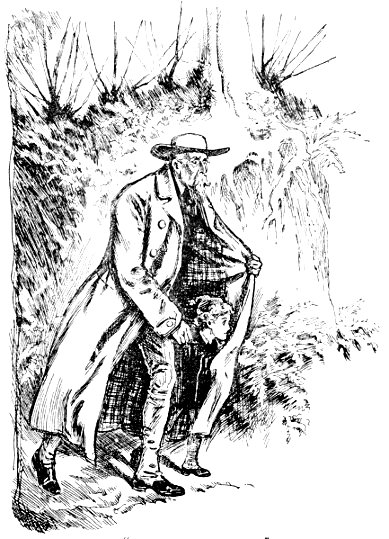
"HE WENT STRAIGHT AWAY."
The bewildered grocer began to murmur some unintelligible ejaculations.
"Swear it, John Puddifoot—swear it on all you hold sacred—here—this ledger of yours; the very thing. Swear it, and keep faith!"
Benumbed with wonder, the grocer obeyed, scratched his head, opened his mouth three times, but closed it again in obedience to the Squire's uplifted finger; and put on his hat and walked aimlessly towards the manor house.
The Squire watched him until he had turned the distant corner; then he locked the door again, and commenced to search every cupboard, drawer, and corner as he had done at Grange. Taking the grocer's keys—(the grocer was a bachelor, and the maid-of-all-work was away at the village school)—he went all over the house, looking in everything—even the pockets of the grocer's clothes; then he searched the shop, poked about under the rice and sugar and lentils, peered into the tea and coffee reservoirs, the till, the scales, the drawers, the empty jars.
Only desisting now and again to give some food to little Rupert, he went on breathlessly at this search until they had lighted the evening lamp behind the red blind of the "Vensleigh Arms" up the hill. Then he sank on to the sofa beside the child, and let his head drop between his hands, and sat, and sat, and sat.
"It must be here—it must—must!" he kept muttering. "Mrs. Wriggs herself noticed such a little flat case in a parcel of odds and ends bought by Puddifoot. Can he have burned it, without opening it? Can he have given it away? It must be here, surely!"
Long before this the rumour of the Squire's "madness" had gone through the village, and many boys and a few adults had tried to peep in through the shop window, but they could not see in, and the shop door had been locked all day. In the evening Mr. Pergamen had come down again, and had given a few of the leading villagers some reason or other, more or less satisfying, for the Squire's conduct. These explanations were tame enough, but they quieted matters down a little.
"It's gone—gone—gone!" muttered the Squire. "Lost to us, Rupert! But we're not the masters of Grange now, you and I; we're safe, Rupert, we're safe. It can't fall on your head now—It can't overwhelm—stay!" Almost with a yell the Squire started[Pg 333] up. "The formal deeds are not signed yet. I forgot that! The provisional transfer should suffice. Does it? Does it? Pergamen may not be carrying out my instructions! He may have destroyed the declaration; but he would not dare to destroy a deed. He may be fooling me—temporizing. And then the danger may not have passed away!"
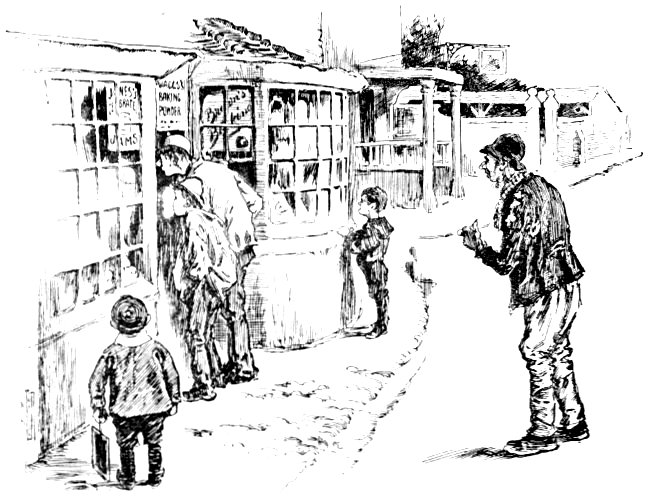
"TRIED TO PEEP IN THROUGH THE SHOP WINDOW."
Again he caught up the boy, and stood as if at bay, shielding little Rupert.
"I must see Pergamen," he muttered. "Now—where can he be?"
There was a tap at the shop door. The Squire snatched up his grey overcoat and flung it over the child, and stood, white and rigid, in front of him. But it was Mr. Pergamen at the door; and he was admitted and the shop door hastily locked again. And the Squire slipped into the parlour before the solicitor, and took up his guard in front of the child.
The deeds were being prepared, but the thing could not be completed at a moment's notice.
Next day the Squire was searching again, all over the house, in the back yard, among the empty packing-cases and tea-boxes, on the dust-heap; again it was evening before he gave over and sank down on the sofa, but his mind seemed a little more at rest now.
At length the formal deed of transfer was duly completed, and signed, and witnessed, and then the Squire gave a great sigh of relief, and a burden seemed to fall from him. He did not draw little Rupert back and cover him when the child advanced to talk to the solicitor and be taken on his knee, according to custom and usage dating from a few months later than Rupert's appearance in the world.
Then the three started off to show the completed deed to John Puddifoot, sole master of Grange. On the way they overtook Mrs. Wriggs, the housekeeper, returning from the village: the Squire stopped her flood of lamentations with a gesture. She dropped behind them; but presently came up and said:—
"Oh, Sir Rupert—I thought I had better mention it, perhaps—John tells me that he saw Mr. Puddifoot, the grocer, hand over some of the trifles he bought at the sale to Benton, the old labourer, and he thinks there was a little flat case among them."
"Ah—just so. It was a very trifling[Pg 334] matter, Mrs. Wriggs; and I had forgotten all about it," said the Squire, hurriedly and unnaturally.
There was a strange commotion in the manor house: the servants were in the square hall bending over something lying on the oak floor. John Puddifoot had fallen from the top of the great well staircase—he was dead! Hurriedly the Squire took off the grey overcoat and threw it over the body, to keep the sight of death from the child.
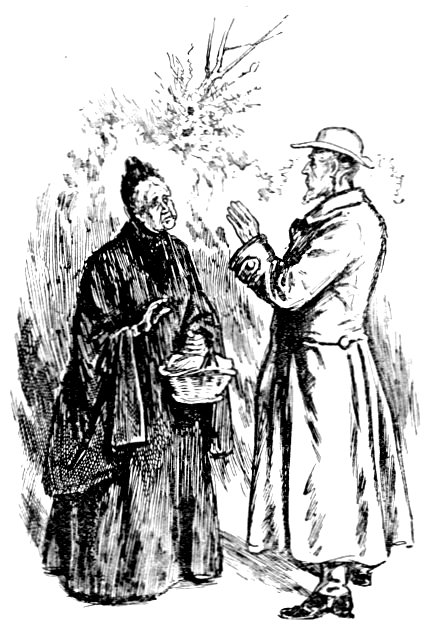
"'I had forgotten all about it,' said the squire."
"Poor fellow! But it was Fate, of course—Fate," said the Squire. "And the old house will, of course, go to his heirs. Come, Rupert, let us go; we have no right here."
"Pardon me," said the solicitor, "I could not allow this—pardon me, Sir Rupert—this mad whim of yours to develop its consequences unchecked. I took care that John Puddifoot executed a proper will, leaving the property again to you."
Once more the Squire caught up the child, and interposed himself between it and all comers. "Please to send for George Benton, the labourer," he said, hurriedly. "And bring him to me in the study."
"George Benton," said the Squire, when the solicitor and the labourer had joined him in the study, "I am very anxious to carry out a scheme I have formed for the bettering of the condition of my tenants. You can assist me greatly. I believe you to be a trustworthy man; and I am about to make over to you this house, lately the property of John Puddifoot, who has met with such a deplorable accident. I may as well declare you at once, in the presence of Mr. Pergamen, who will testify to the declaration, absolute owner of this house."
The labourer rubbed his forehead with a hard, broad finger, and stammered something about asking the missis at 'ome; but the Squire cut him short with: "You must do this thing as a great favour to me—it is a pet fad of mine. At some future time I may possibly ask you to restore the property to me. Until then—even should that occur—consider, you will be absolute master here; you will be well off, for a considerable portion of the rents go with the house. You accept?"
The labourer could not avoid stammering his acceptance.
"You are master here," said the Squire, quickly and nervously, as one with misgivings; "behave as master—I and—and Master Rupert are intruders here, having no right here. Will you oblige me by ordering us out?"
In a dazed, mechanical way the labourer did as he was requested.
"May I find a home, for a day or two, in your cottage?—ah, it would be a convenience. Thank you," said the Squire; and in another ten minutes he had arrived at the cottage and packed off the labourer's wife and children to Grange, absolutely preventing her, by voluble assurances of the safety of all her belongings, from taking away any articles with her.
Then the door was locked; and the searching began over again, and lasted the rest of the day.
Day followed day: the new transfer had been duly executed; John Benton was legal owner of Grange. Every day the Squire listened eagerly for all news of him, always dreading what he should hear; but the labourer went on in his new dignity—a fish out of water, awkward and sheepish, but[Pg 335] always with a determination to preserve the property, under the advice and assistance of Mr. Pergamen, for the Squire. The labourer's wife kept the same end sturdily in view, and her children played with much content on the smooth lawns. All the while, though with diminishing hope and eagerness, the Squire kept up his search for that something, never saying a word of it to a soul, but catching at any little chance scrap of information likely to assist him. He would call at the cottages and, whenever the opportunity occurred, surreptitiously peep and pry into drawers and cupboards—in vain.
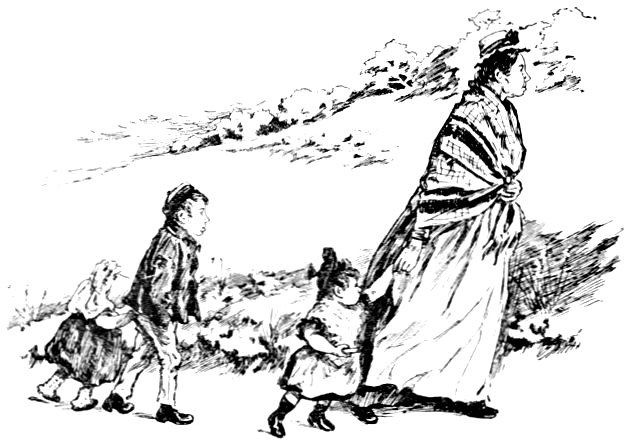
"THE LABOURER'S WIFE AND CHILDREN."
After a few weeks he would take little Rupert by the hand, and they would stand and gaze over the railings at the small Bentons playing on the lawn; and the little Bentons would pull their forelocks, and curtsey, and open the gate and beg them to come in.
Then Rupert would play with them a little, and was allowed to. Finally Mrs. Benton came as a deputation from her husband to beg the Squire to live in his own rooms in the house; but the Squire hastily, and rather incoherently, excused himself. Still things went on quietly: and one evening the Squire consented to occupy his old bedroom for the night, and his study for the next day; and then he found himself staying in the house. But every time Benton touched his hair to him, or Mrs. Benton dropped him a curtsey, he would look round for Rupert and take him up, and protest that he was not master there, nor Master Rupert either, and look anxious and nervous.
And one day he drew Mr. Pergamen, as he passed, into the study, and closed the door, and said: "I may as well tell you now. It is lost and gone beyond hope. Perhaps the spell is broken—by the—the death of that unfortunate John Puddifoot—"
"The spell?" repeated the solicitor, staring dubiously at him.
"Yes—the spell," said the Squire. "You will put me down as a superstitious lunatic when you hear what I have to say. "Well, do so. You did not know of the existence of a talisman—a charm—call it what you will—in my family? No. Nor has anyone ever known of it except the successive owners of Grange and their heirs; yet this charm has been handed down (and the tradition connected with it) from father to heir without a break since the time of James the First.
"It was a small, flat, gold disc, set with a carbuncle carved in the shape of a skull, and contained in a small, flat, leather case; and the tradition was to the effect that, should that charm cease to be under the roof of this house, the owner, or his heir, would meet with a violent death, a like result following the communication of the secret to anyone but the actual heir of the house. After that rummage-sale I missed it; looking, by chance, in the safe in this room where it had always been kept, I saw that it was not in its place. Then I recollected that, on the occasion of my opening the safe about six weeks before, Rupert had looked in and taken up several of the articles to look at, as a child will. He must have taken out the talisman, unnoticed by me, and left it about the room instead of putting it back; and I jumped to the conclusion that it must have found its way into the sale, and been carried away.
"It is gone, and the revealing of the secret does not matter now; and let us hope that the—the accident of the staircase has——"
"Quite so; we will hope so," replied the solicitor, still eyeing the Squire dubiously.
As the Squire chanced to turn to the window and look out, he saw Benton entering one of the fields beyond the lane, to bring in a bull which was pastured there, and over which he alone had any control. But the animal did not seem to be so amenable as usual to his influence; and, before the Squire could realize the situation, the bull had charged and tossed the labourer, and was trampling him.
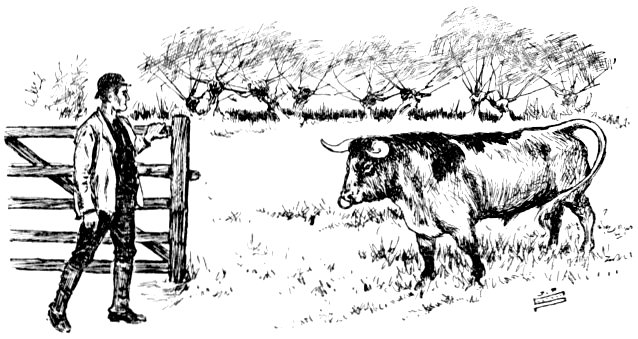
"THE ANIMAL DID NOT SEEM TO BE SO AMENABLE AS USUAL."
The Squire snatched up a rifle, loaded, and raised the piece; but by this time three other men were driving off the beast with stones; and in two minutes more they carried Benton outside the gate. One of them came running to the house; the Squire called to him, asking about the injured man.
"Dying, sir," was the answer.
The revealing of the secret had mattered; and its result had come quickly!
The Squire shuddered and covered his face. The scene just enacted led his mind to the scene at the foot of the staircase—the object covered with the grey overcoat. He uncovered his face to notice what he had seen, but not noticed, previously—little Rupert lying on the sofa covered with that coat!
The coat had, after the tragedy, been taken to the study and hung over a chair, where it had remained until, half an hour ago, Mrs. Wriggs had thrown it over the sleeping child to keep him warm.
Shuddering again, the Squire plucked the coat off Rupert, and flung it through the open window, placing a skin over the boy in its place.
Then he turned again to see them carrying in the victim of the bull, and was suddenly conscious of a slight cracking noise in the ceiling of the room and the sound of something falling.
A heavy carved boss had detached itself from the mullioned ceiling and fallen upon the head of the sleeping child; the boss bore a shield on which was a golden disc, bearing in its centre a red skull.
Rupert was dead!
One of the servants found the grey coat lying on the lane outside; his attention was attracted by something which had found its way beneath the lining of the skirt.
There was a hole in the pocket where the sewing had given way, permitting the object to slip through: the object was a small, flat leathern case. It had been placed in the pocket, for fun, by Rupert on that day when he had played with the things in the safe.
Until flung from the window, the grey coat had never been away from Grange except during the short time when John Puddifoot had been owner.
J. F. Sullivan.
The concluding article on "How Composers Work" will appear in the next number.
Title Page and Table of Contents created by transcriber.
Simple spelling, grammar, and typographical errors were silently corrected.
Punctuation normalized.
Anachronistic and non-standard spellings retained as printed.